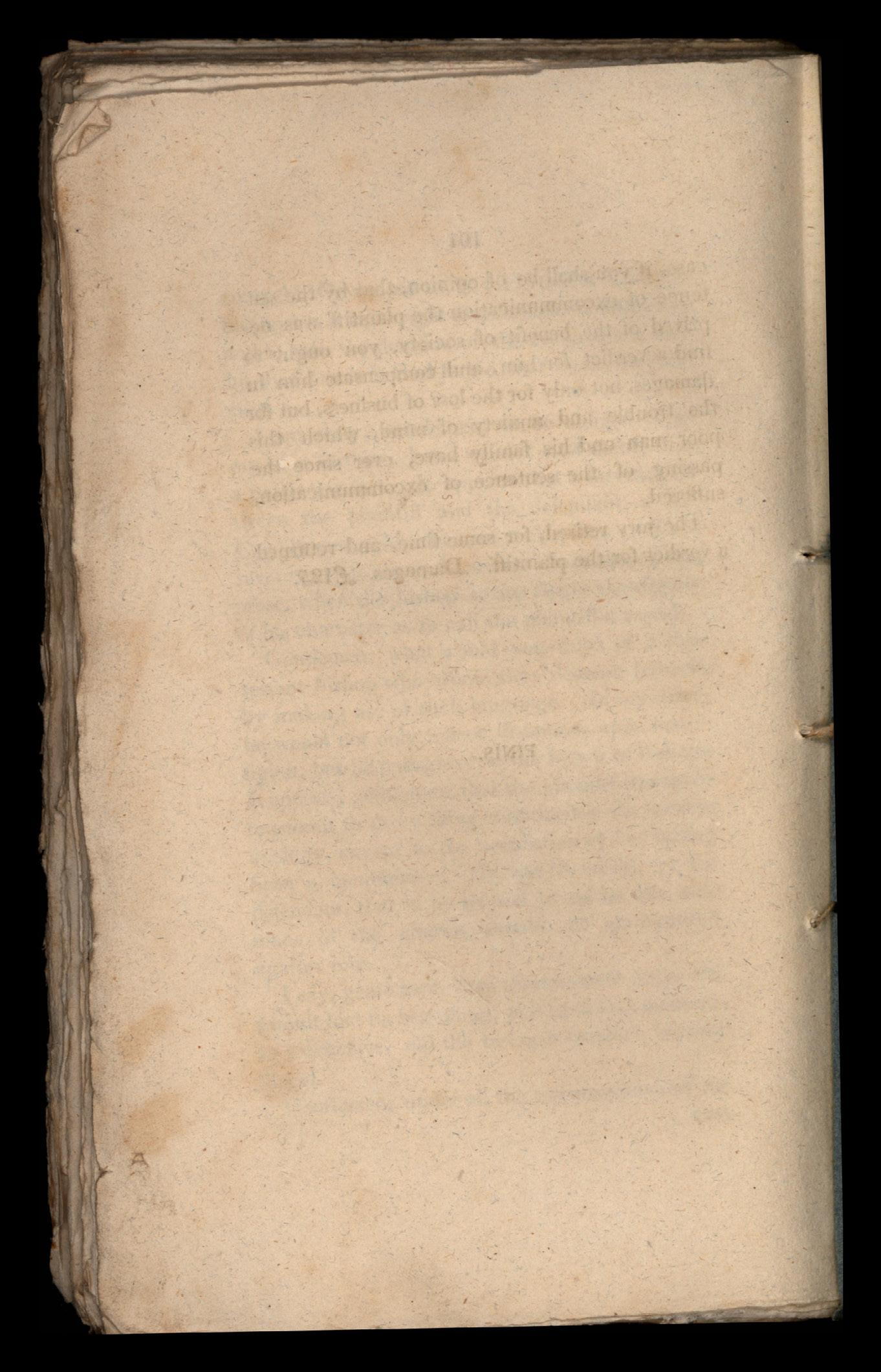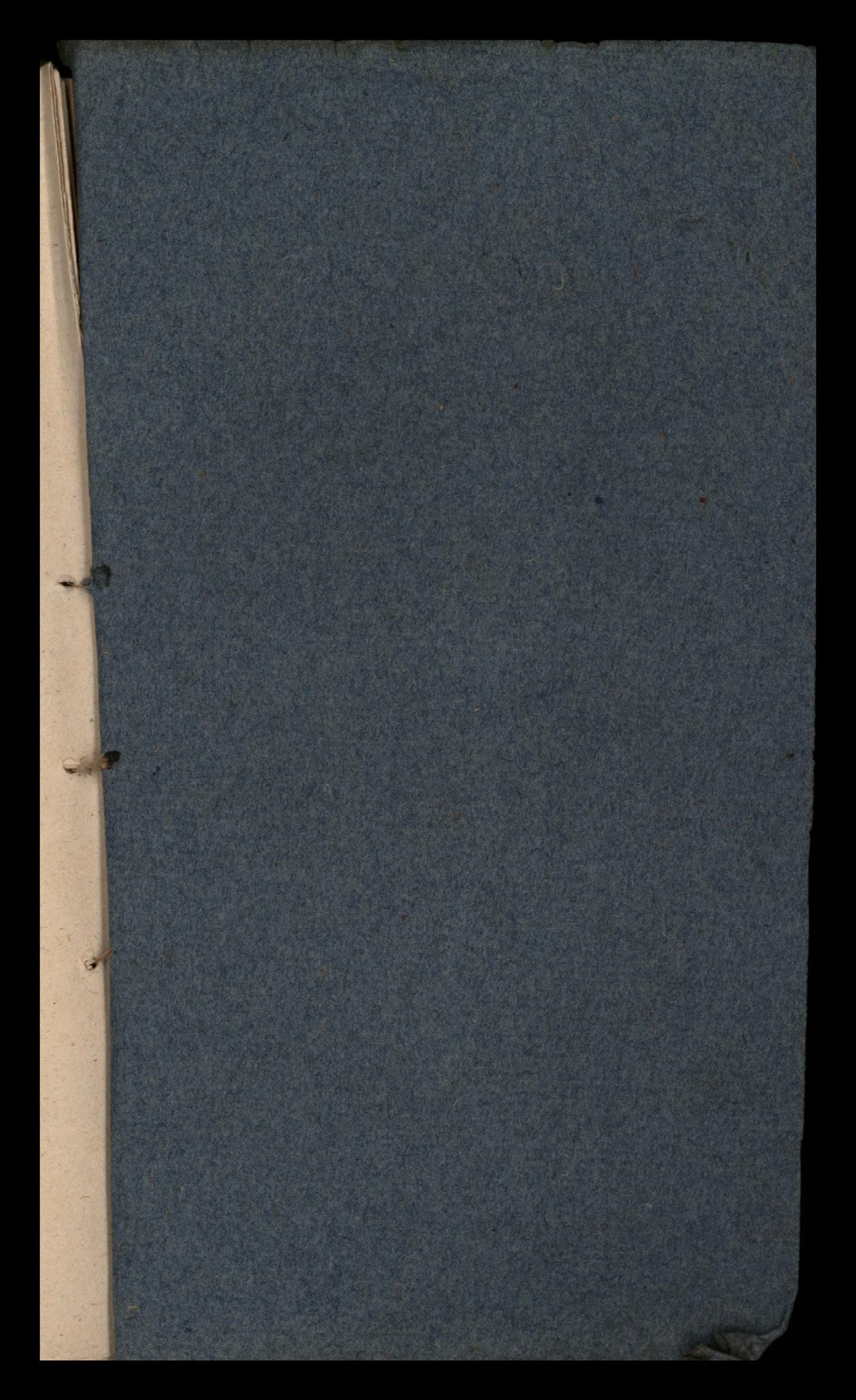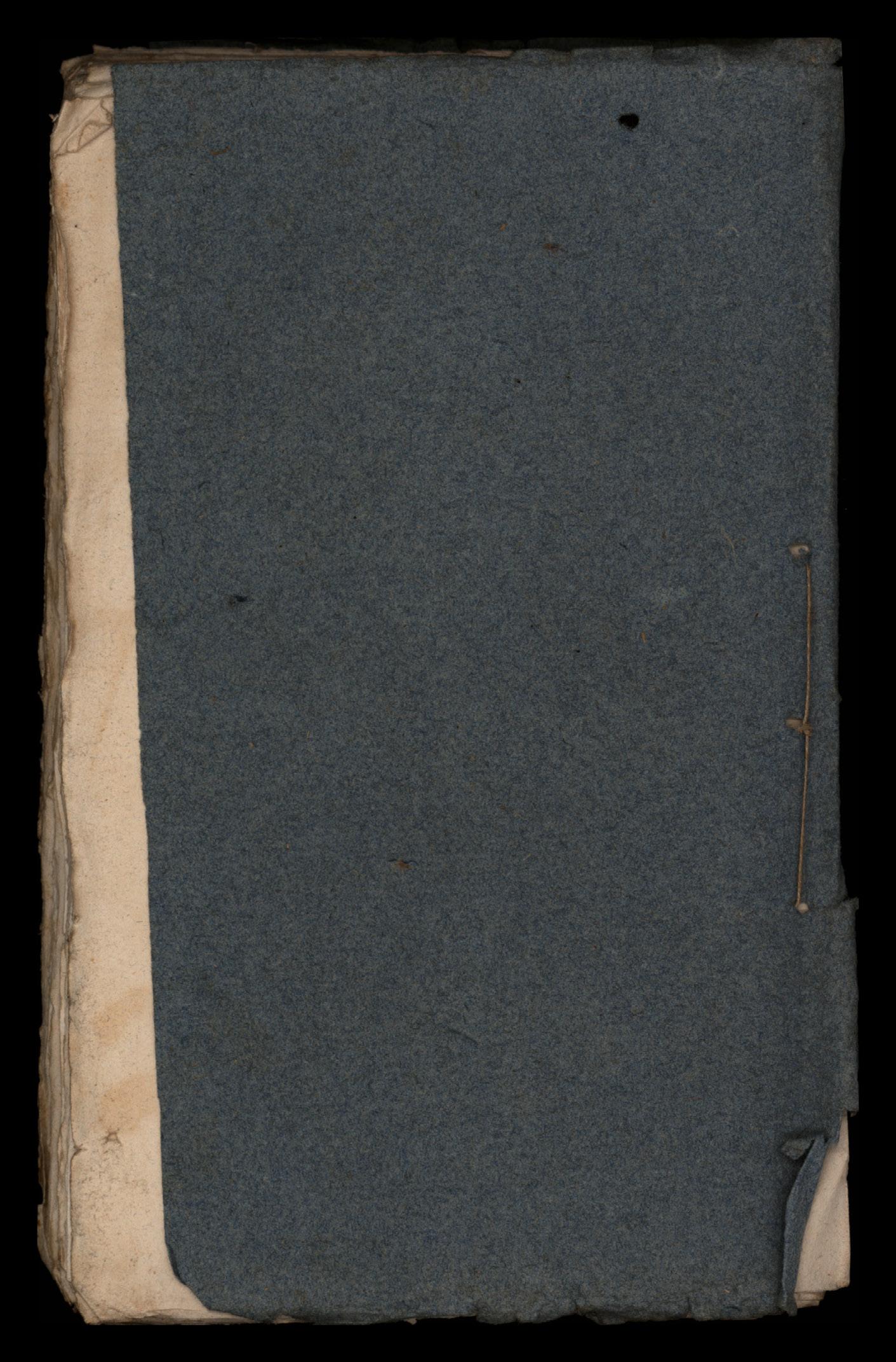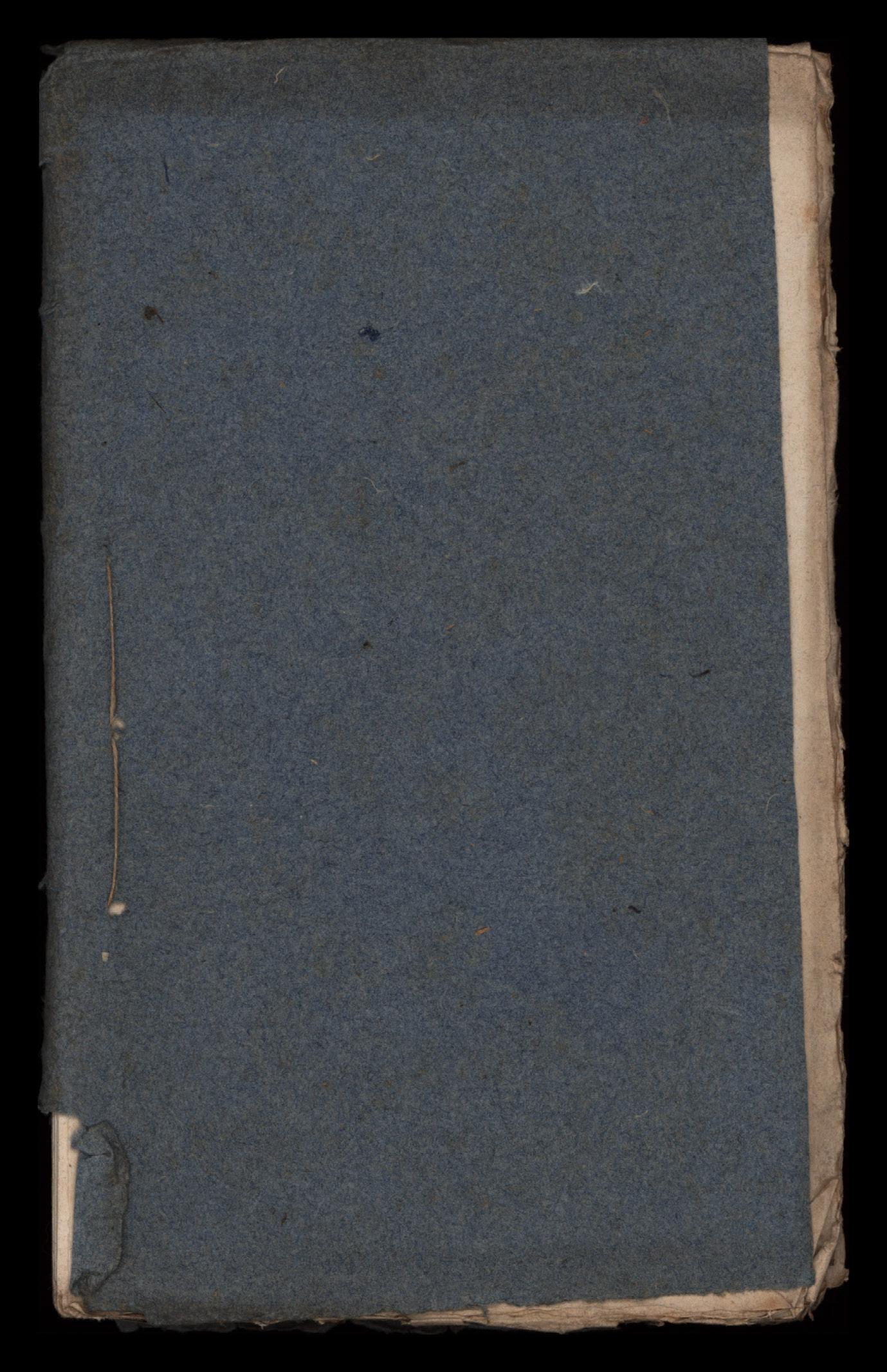
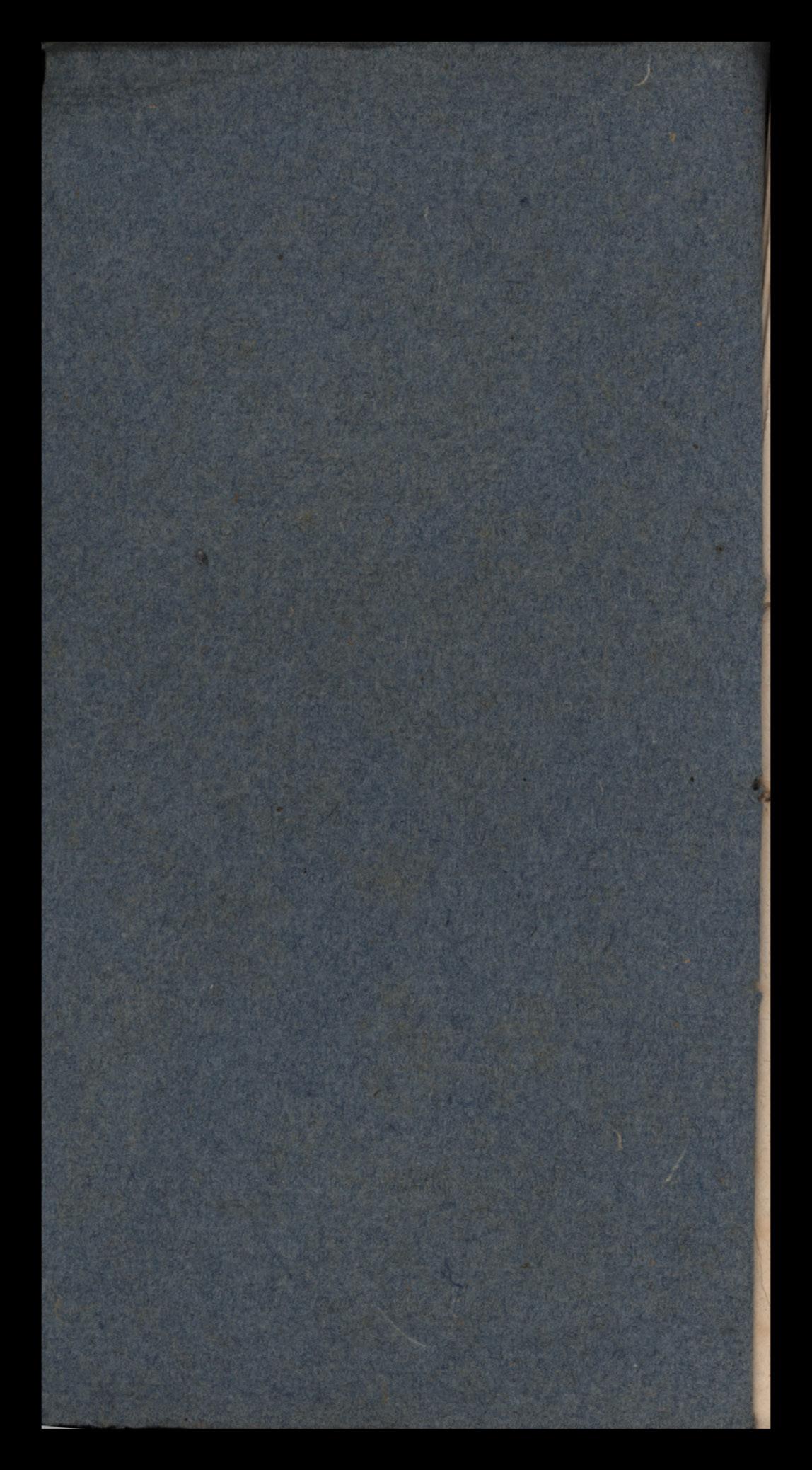
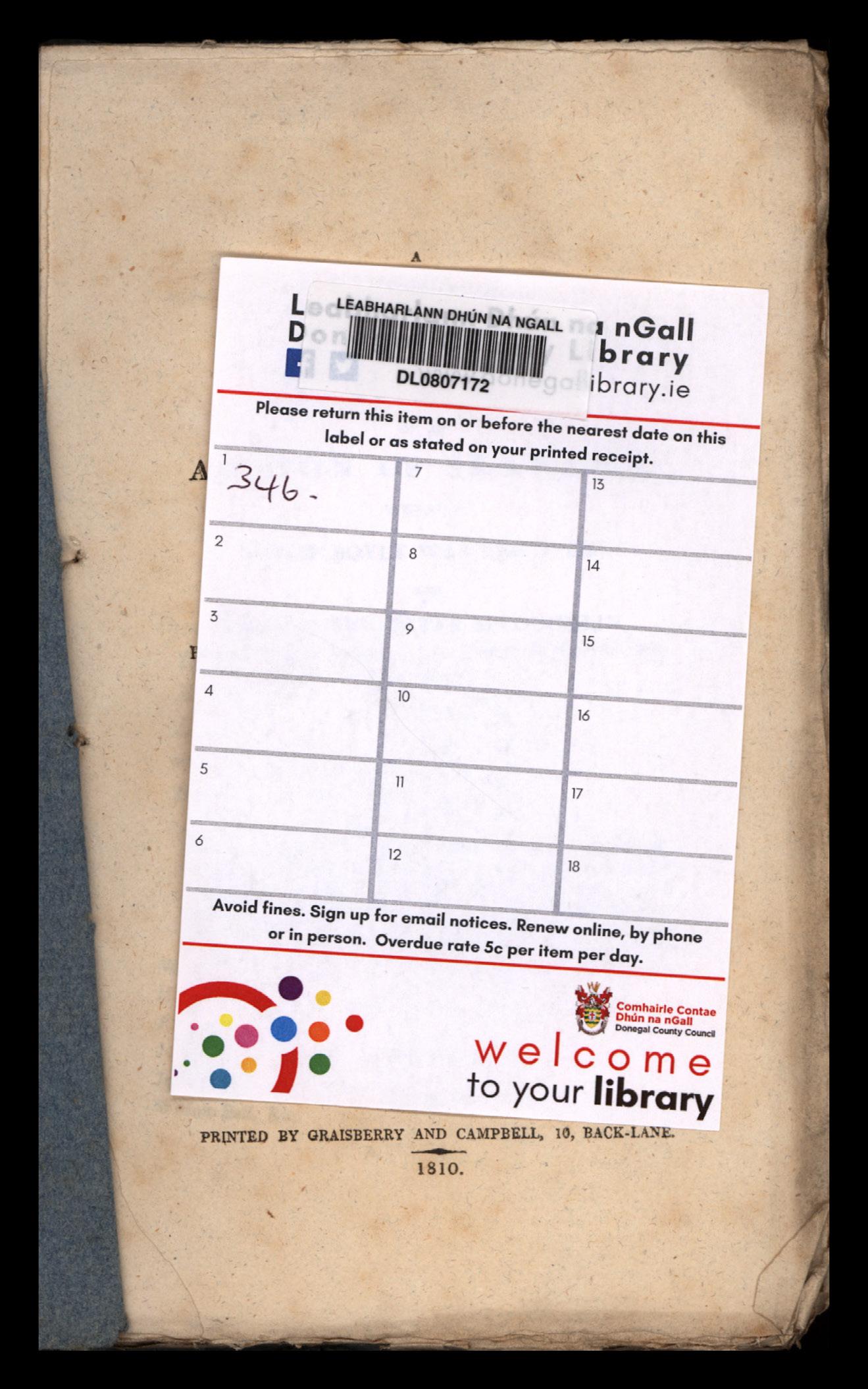




WHEREI!'i
PHILIP BOYLE WAS PLAINTIFF, AND THE RT. REV. PETER M'LOUGHLIN, RoMAN CATHOLIC BtsHOP OF TH£ D1oc1tsr. OF RArKot, w.r.s DEFENDANT.
TAK.EN IN SHORT HAND BY RANDALL KERNAN, EsQ. BARRISTER AT LAW.
Tbe la,n which empowered Roman Catholic Bishops to excommunicate. have long sine~ been repealed, and none but Bishops of the Established Church ba,·e, now, a legal right ot exercis' ng that authority And I c onsider the sentence of .Excommunication pronounced by -the Defendant, in this Action, not only AN Assv11n10:, o, ,owu, coi.11tAlY TO LA"'• BOT AN USUIU'ATION OP TH£ ato BTS o, THB BISHOPS OP TH£ £STABLISll5D CYOaCH, A~D A!{ IYFa l ~CBM&!ff OF '111£ JUIUSDlC'flON OF TU£ £CCL~ SU.STICAL COtl&'J'S. V-uit BnoN M'CLELLAN1>'s Cl1argt to the Jliry.
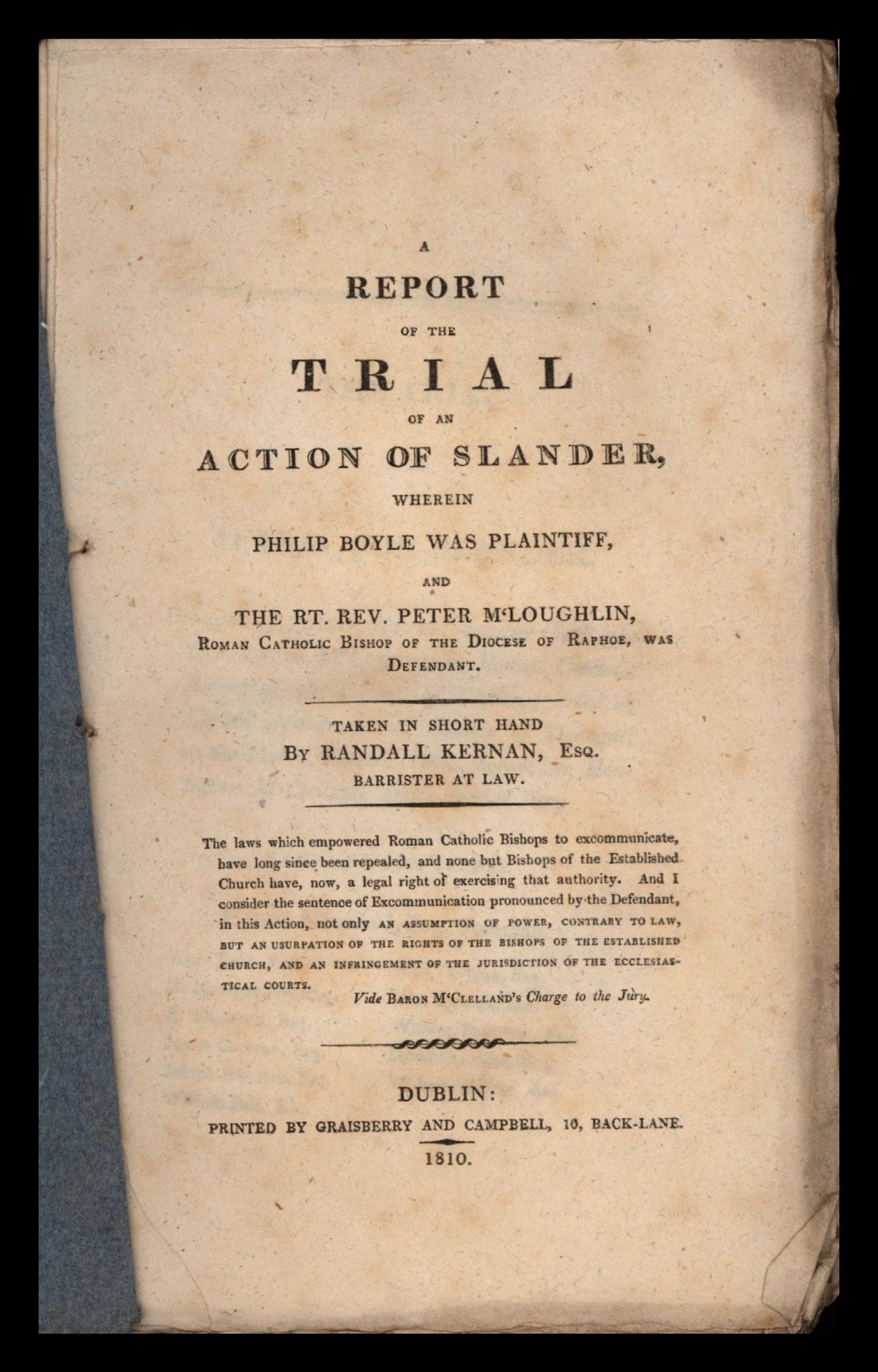
DUBLIN : PRINT.ED BY GRAISBERRY AND CAMPBELL, 10, BACK-LA.V:E1810.
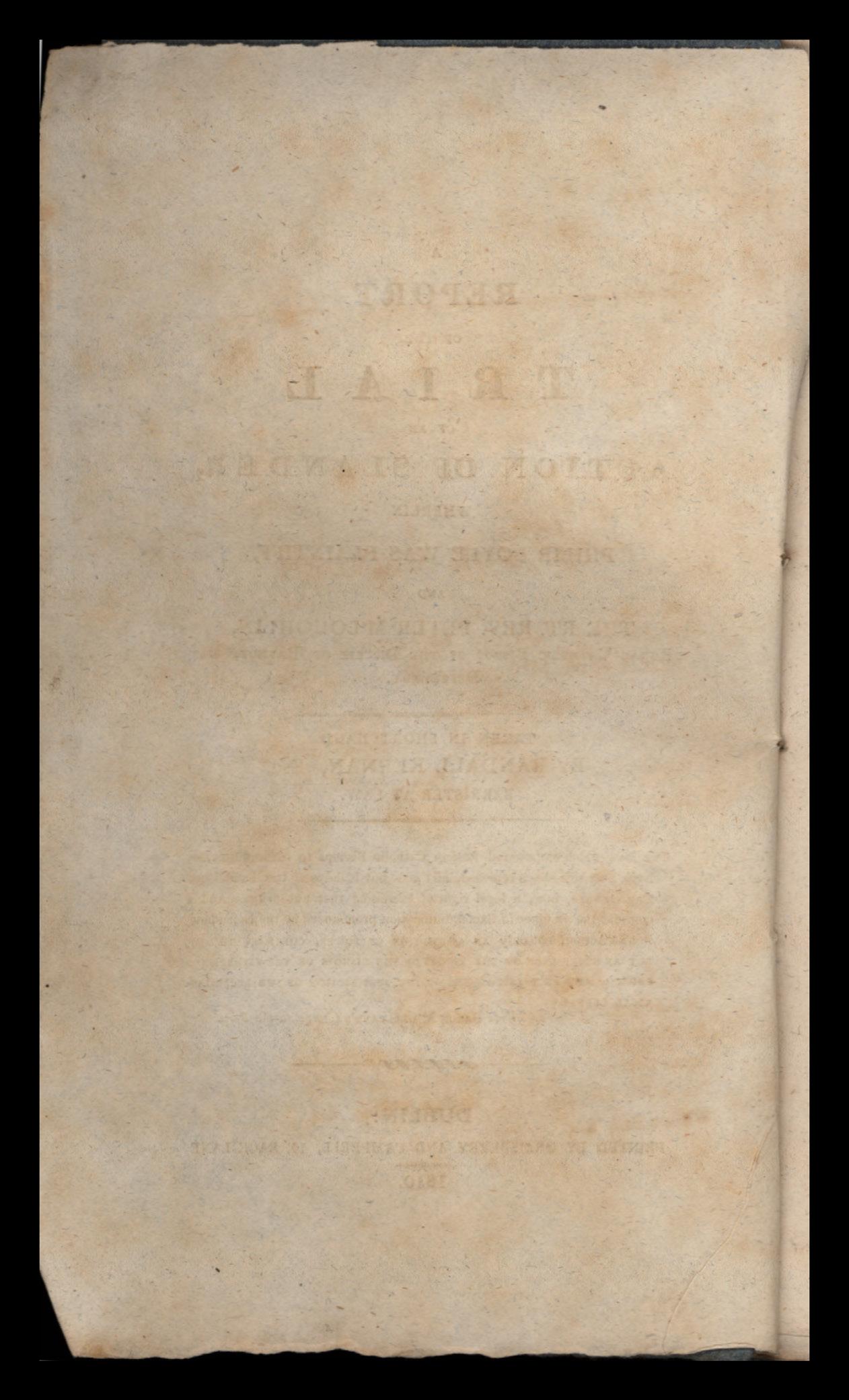
B1·ought by PHILIP BOYLE, against the Right Rev. PETER M ·'Louo 1n1 N, Roman Catholic Bislwp ef the Diocess ef Raplwe; tried at Lifford Assizes, in the County of Donegal. on the 21st ef .llfarclt, 1809, before the 1/on, Baron M' Clelland, and a ...(jpeciat Jury.
NAl\fES OF THF. JUROitS.
Francis Man&field, Esq. Foreman.
Wm. Todd, Esq.
H. Montgomery, Esq.
R. Mansfield, Esq.
James Cochran, Esq,
Joseph Johnston, Esq.
William. :Ball, .E.sq
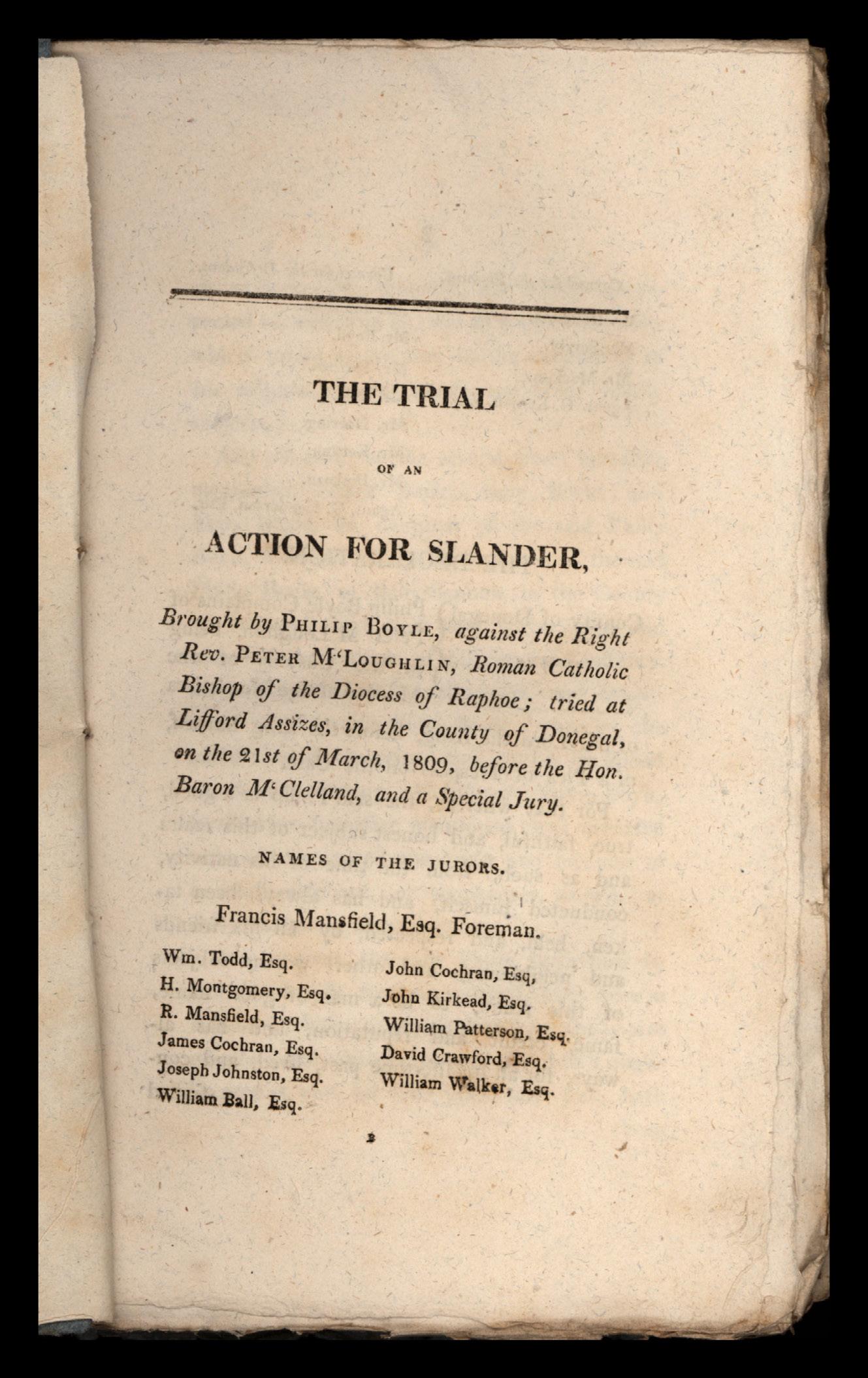
John Cochran, Esq,
John Kirkead, Esq.
Willi:\m Patterson, Esq_
David Crawford, Esq.
William Walktr, :E.1t,
Counsel f or th e Plaintiff. Counsel for the D efendant.
Mr. Rolleston.
Mr. Smyly.
Mr. Macklin.
Agent, G. Kernan, E sq.

Mr. J ohnston .
Mr. Boyd
l\lr. Ton ins.
Mr. Cole.
Mr. D ee rin g.
Mr. Kerna n
Mr. Dickson.
Agent, G. Ilende1·son, Esq.
County of Donega11 Philip Boyle Complains of Peter M'Loughlin, being to 1Vit in the Custody of the .._ ___ '.y--......J Marshal of the Marshalsea of our Lord the King, before th~ King himself, of a Plea of Trespass on the Case. For that whereas, the said Philip is a good, true, faithful, and honest subject of this realm and as such, from the time of his nativity, conducted .himself, and has always been taken, held, and respected, by all his friends and neighbours, and other worthy subjects of this realm, to be a man of good name, fame, credit and reputation, and has always, fer all his life-time past, lived, and continued
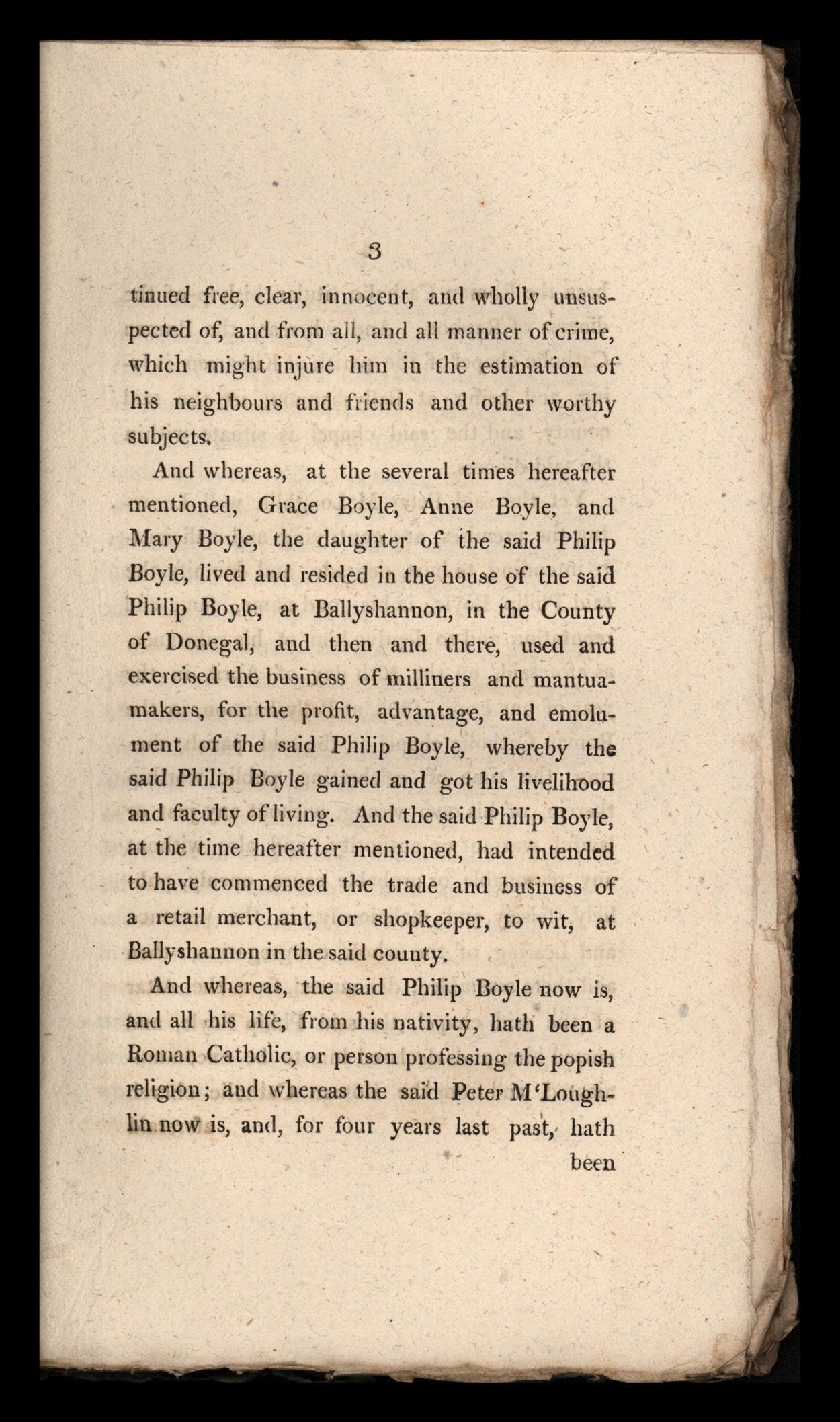
tinued free, clear, innocent, ancl wholly unsuspected of, and from all, and all manner of crime, which might injure him in the estimation of his neighbours and friends and other worthy subjects.
And whereas, at the several times hereafter mentioned, Grace Boyle, Anne Boyle, and l\Iary Boyle, the daughter of ihe said Philip Boyle, lived and resided in the house of the said Philip Boyle, at Ballyshannon, in the County of Donegal, and then and there, used and exercised the business of milliners and mantuamakers, for the profit, advantage, and emolument of the said Philip Boyle, whereby the: said Philip Boyle gained and got his livelihood and faculty ofliving. And the said Philip Boyle, at the time hereafter mentioned, had intended to have commenced the trade and business of a retail merchant, or shopkeeper, to wit, at Ballyshannon in the said county.
And whereas, the said Philip Doyle now is, and all his life, from his nativity, hath been a Roman Catholic, or person professing the popish religion; and whereas the said Peter l\1'Loi,~hlin now is, and, for four years last pas't,• hath been

been tbe Roman Catholic titular bishop of the diocess of Jlaphoe. A.nd wh ereas, the Roman Catholic chapel of the pc!.ri sh of Kil barren is Jyjng, ~ncJ being at Ballyshannon, in the s~id ~ounty, and the s~id ~hapel is situat~ within the said diocess!
Y e t the said Peter M'Loqghlin well knowing the premi ses, and contriving, and maliciously intending, to h4rt, deg rad e, and d~mnify the said Philip Boyle, in hi s good na me, fame and reputatjon , and to d eprive h im o f his subs tance, ~s afor~said, on th e 10th day of April, in the year of pµr Lo rd , 1808, a t Bally shannon, in the Romaq. Cl!.tholi c c h apel of th e said parish, du~ rmg t}?e time pf ~elebrating public worship therein, of his own wrong, without any just or Jawfui warrant or aµthority, and also withoui any reaso~able or probable c~use, openly, pub-:licly, fcJ.l sely and maliciously, in the presence 1 ~nd hearing · of. the whole congregation, then ~nd th~re assembled, denounced, from the Altar pf tµt! •said c~apel, the said Philip Boyle, an<! ~ursed him, and declared him to be excornmupicaied~ a~d from t~e .R,oman C~tholic church
F-fores~~ ' '

aforesaid, to be excluded an<l then· and there publickly, maliciously and opprobriously warned the said congregation, then and there assembled, as aforesaid, not to have any dealings or \ntertercoursc::·whatevcr with the said Philip Boyle, under grievous pains, penance, and penalties, which he the said Peter M'Loughlin, there threatened he . would inflict on auy person, who should ·be discovered holding any intercourse with the said Philip Boyle.
And afterwards, to wit, on the day and • year last afortsaid, at the Roman Catholic chapel, afortsai<l, in the said county aforesaid, and during the time of celebrating public worship in the said ch~~cl, the said Peter M'Loughlin, of his further malice against the said _ Philip . Boyle, of his own w~ong, and without any la wful authority, and also without any reasonable cause, openly, publicly, falsely at1a maliciously, in the presence and hearing of the aforesaid congregation then ~'nd there assembled, again de, nounced, and cursed the said Philp Boyle, and declared him to be excommunicated,-by means 11,hereof, the said Philip Boyle saith he is greatly hurt, •
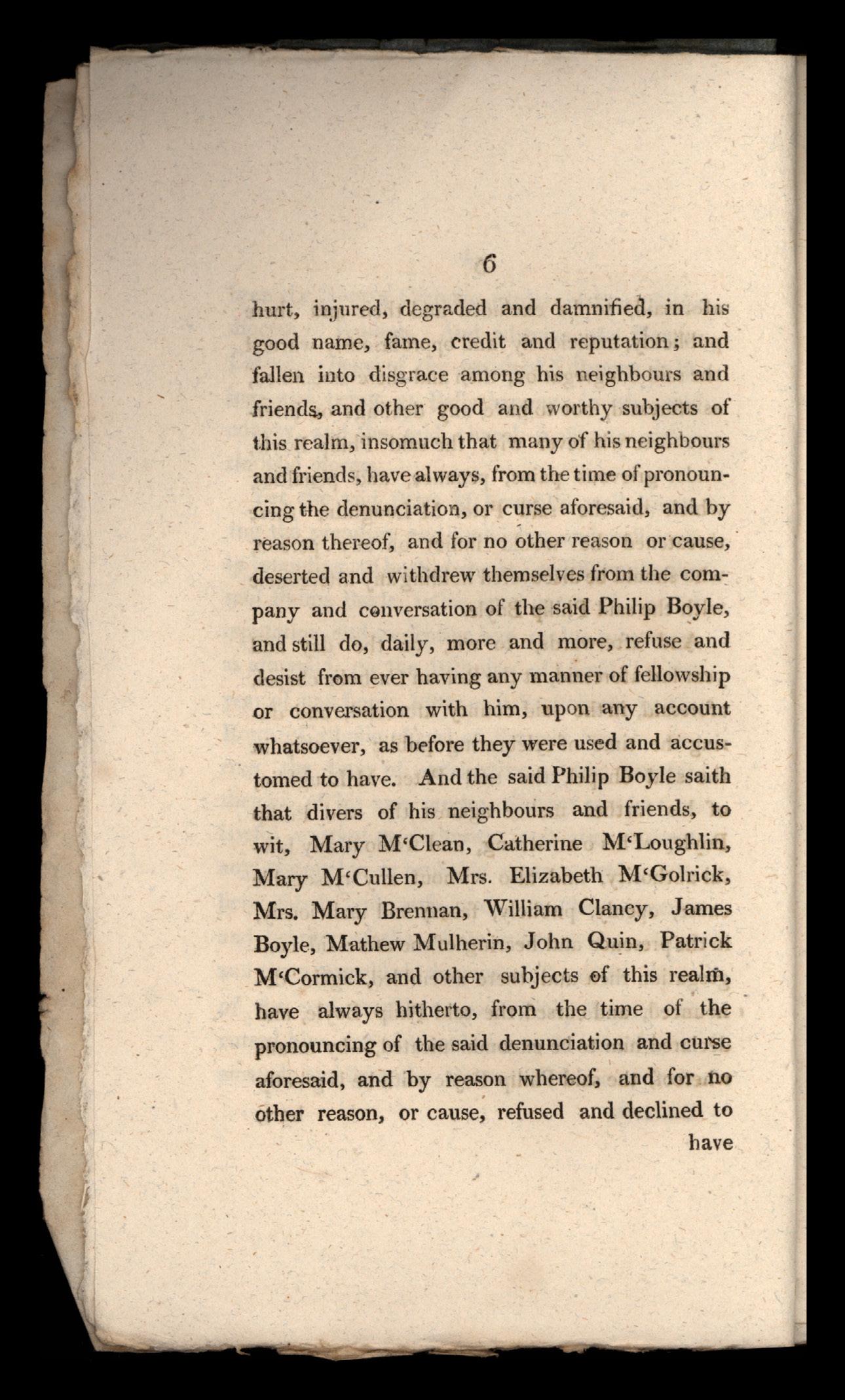
hurt, injured, degraded and damnified, in his good name, fame, credit and reputation; and fallen into disgrace a mong his neighbours and friend~ and oth er good and wor thy subjects of this realm, insomuch that m any of his n e ighbours and friend s, have always, from the time of pronouncing the denunciation, or c~rse aforesaid, and by reason thereof, and for no other re ason or cause, • deserted and withdrew themselves from the company and c{mversation of the said Philip Boyle, and still do, daily, more and more, refuse and desist from ever having any manner of fellowship or conversation with him, up on any account whatsoever, as before they were u se d and accustomed to have. And the said Philip Boyle saith that divers of his neighbours and friends, to wit, Mary M'Clean, Catherine M'Loughlin, Mary M'Cullen, Mrs. Elizabeth M'Golrick, Mrs. Mary Brennan, William Clancy, James Boyle, Mathew Mulherin, John Qu~n, Patrick M'Cormick, and other subjects ef this realm, have always hitherto, from the time of the pronouncing of the said denunciation and curse aforesaid, and by reason whereof, and for no other reason, or cause, refused and declined to have
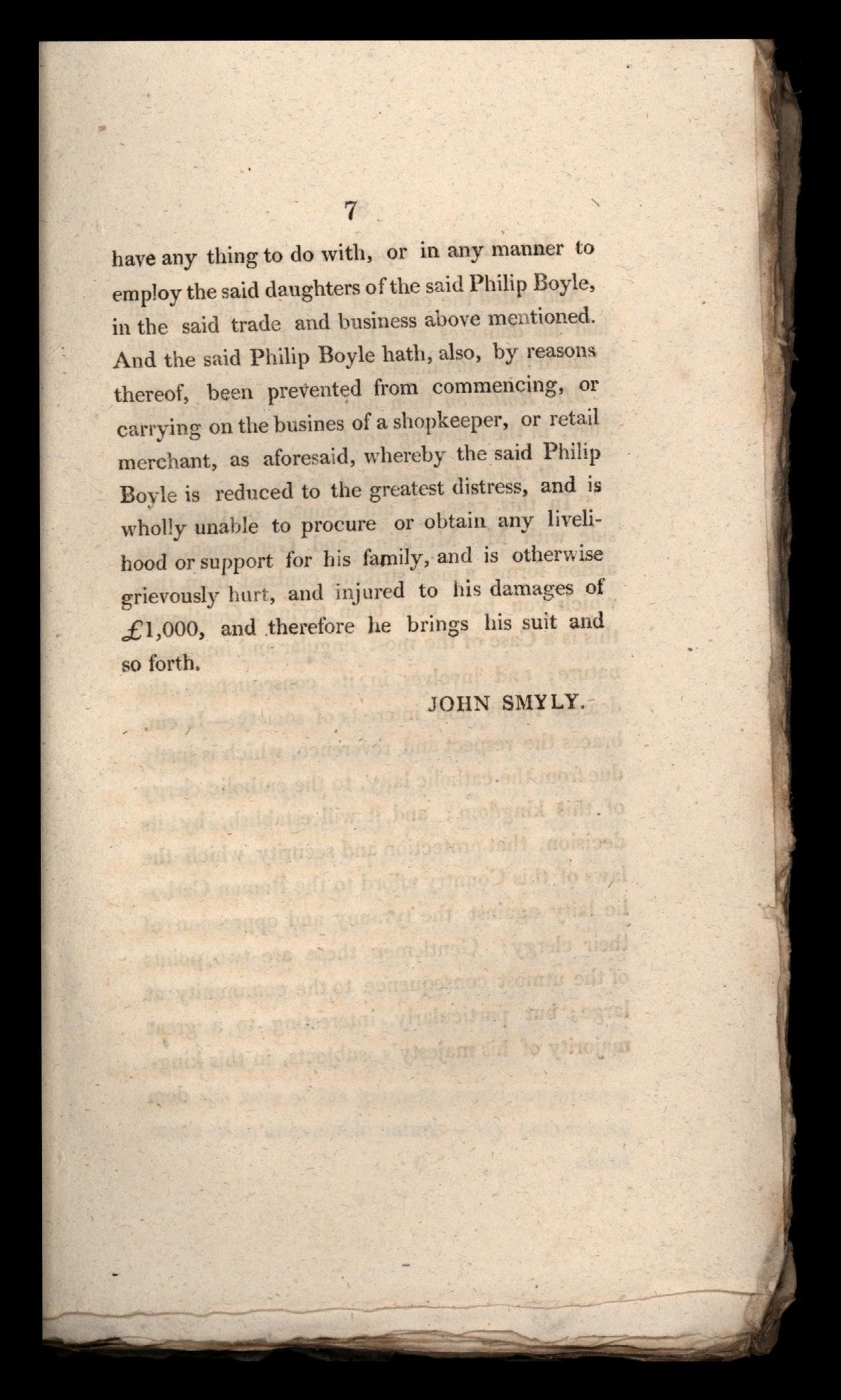
have any thing to do with, or in any manner to employ the said daughters of the said Philip Boyle, in the said trade and business above mentioned. And the said Philip Boyle hath, also, by reasons thereof, been prevented from commencing, or carrying on the busines of a shopkeeper, or retail merchant, as afore$aid, whereby the said Philip Boyle is reduced to the greatest distress, and is wholly unable to procure or obtain any livelihood or support for his family, and is othen\-ise grievously hurt, and injured to his damages of £1,000, and .therefore he brings his suit and so forth.
JOHN SMYLY.

Mr. Macklin Open ed the Plea dings,
And stated th e cause of A ction. Th e plainti ff laid his damages at £1,000 and the defenda nt plead ed the general issu e.
J.lfr. Rolleston then addressed the Cou rt an d Jury, in the following words.
JJfy Lo rd, and Gentlmu:n of the J ufy .
" In this case, . I am counsel on the same side with Mr Macklin; , and G entlem en, this -~ action forms a most striking contrast from that which you have now b een trying: Gentl ementhis is a Case of the most singular and important nature; and involves in its cons~quences the d earest rights and interests of so ciety.-It embraces the respect an<l reve rence, which is justly due from tl1e catholic laity, to the, catholic clergy of this kingdom ; and it will establish, b y its decision, that protection and security whi ch the laws of this Country afford to the Roman Catholic laity against the tyranny and oppression of their clergy: Gentl em en these are two points of the utmost consequen ce to th e community at large; but particularly interesting to a great majority of his maj esty' s subjects, in this kingdom

dom, and I trust you will keep them distinct vi your mind.-If Dr. 11'Loughlin, the plaintiff in this action bas, not overstepped his religious duty, but merely acting in the capacity of a Catholic bishop has exercised the power of excommunication, and that the defendant has been guilty of an offence, which would justify the passing of that sentence, he cannot hope to receive any, the most triflng compensation in llamages from so respectable a jury. .J
But gentlemen this is not the case of my client who, as I am instructed, has not been guilty of any crime; and when I state to you the dreadful anathmas which seem to constitute a part of the awful denunciation pronounced against him, you will scarcely think that any offence, less than murder, could have justified the bi shop as a , a minister of heaveu, in passing such a sentence. This sentence has b een productive of the effect of banishing my client from the society of his most intimate friends ; not even his relations can venture to speak to him, lest they too should ipso facto incur, the same dreadful censure; to touch even the hem of his garment would constitute a crime of an unexpiable nature.-11y unfortunate
cl ient

d ient has, ever since the passing of that sentence , been deprived of the comforts of participating in the rights of that church, in which he was bap• tized, and in which he was educated· from his nativity ; and if h e has done any thing to merit su ch a puni shment, I beseec h you g entlemen to find a verd ict against him; but if, on the contrary, the d efendant, for the purpose of procuring tern• poral adva ntage to himself, and not from a motive of acting impartially in the exercise of his religious duty, has at the alter of the God he worships abused the power, which I conceive to be vested in him, by hi s church, it is your province to punish him, as he d eserves, and for such an offence, no damages can be too liberal. Gentlemen, having prefaced thus much, I will now briefly state to y ou, the facts of this case.
About 13 years ago, the Roman Catholic inha. b itants of the parish of Kilbarre~, in the county of Donegal, entered into a voluntary subscrip tion, for the purpose of building a chapel in the town of BalTyshannon .
It appears that Dr. M'Loughlin, the defen. dant, and titular bishop of the diocese of Raphoe, toQk
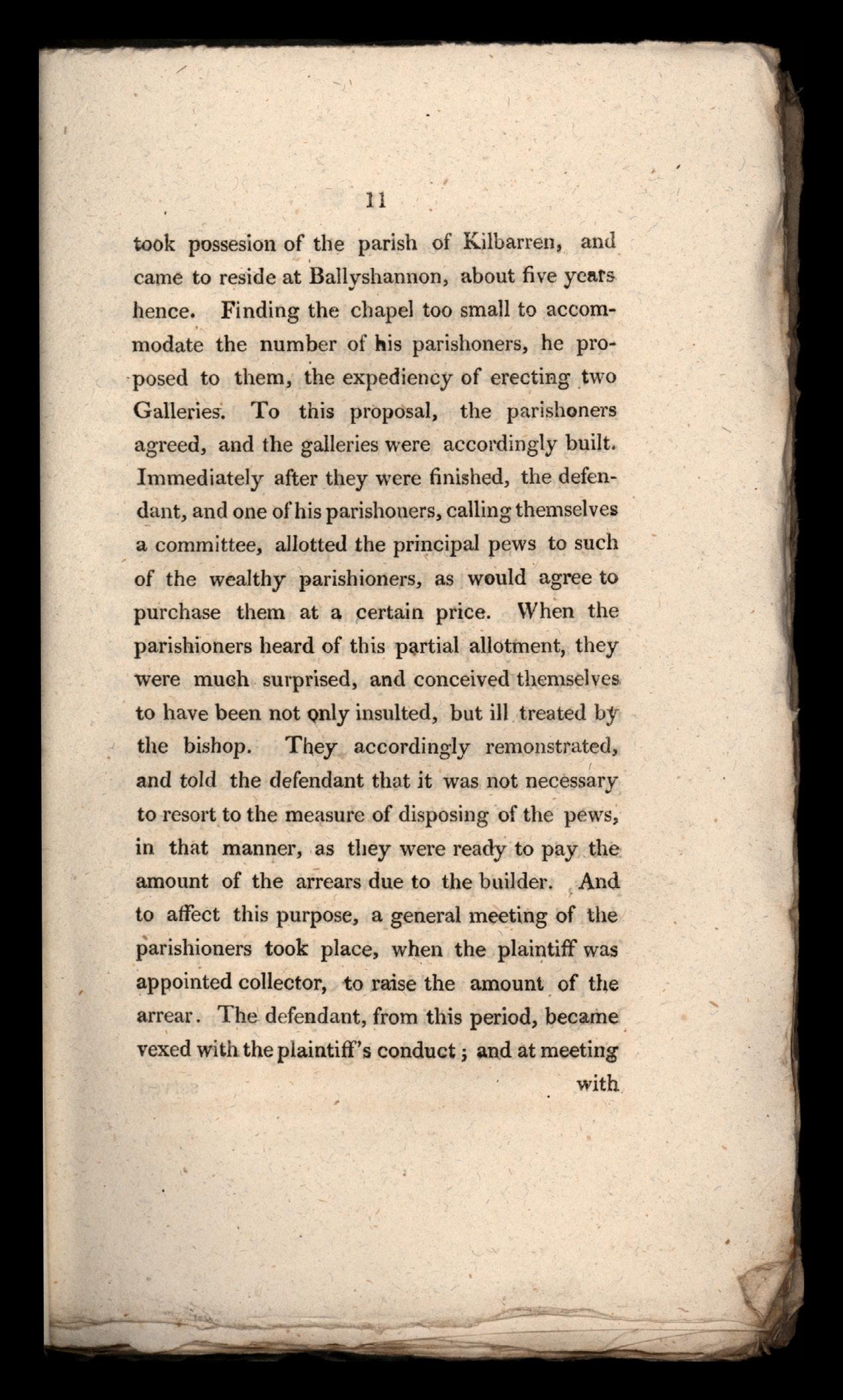
took possesion of the parish of Kilbarren, an<l came to reside at Ballyshannon, about five years Jlence. Finding the chapel too small to accommodate the number of his parishoners, he proposed to them, the expediency of erecting two Galleries-. To this proposal, the parishoners agreed, and the galleries were accordingly built. Immediately after they were finished, the defendant, and one of his parishoners, calling themselvei a committee, alJotte<l the principal pews to such of the wealthy parishioners, as would agree to purchase them at a certain price. When the parishioners heard of this partial allotment, they were muoh surprised, and conceived themselves to have been not qnly insulted, but ill treated by the bishop. They accordingly remonstrated, and told the defendant that it was not necessary to resort to the measure of disposing of the pews, in that manner, as they were ready to pay the amount of the arrears due to the builder. And to affect this purpose, a general meeting of the parishioners took place, when the plaintiff was appointed collector, to raise the amount. of the arrear. The defendant, from this period, became vexed with the plaintiff's conduct; and at meeting with
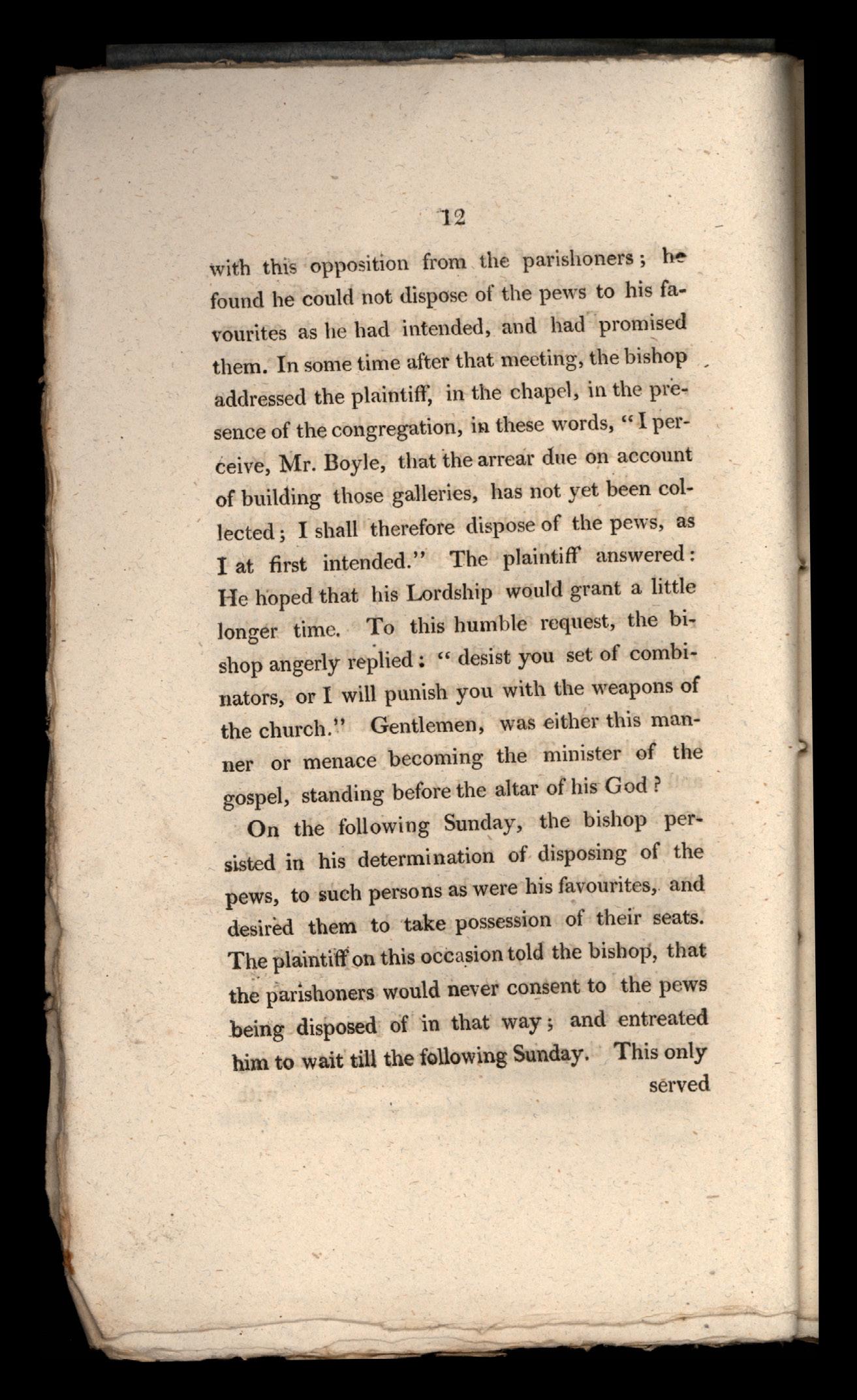
with th1s oppo-it10n from the parishoners ; found he could not <lisposc of the pews to his favourites as he had intended, and had promised them. In some lime after that meeting, the bishop , addressed the plaintiff, in the chapel, in the presence of the congregation, in these words, "I perceive, Mr. Boyle, that the arrear due on account of building those galleries, has not yet been collected; I shall th erefore dispose of the pews, as I at first intended." The plaintiff answered: He hoped that his Lordship would grant a little longer time. To this humble request, the bishop angerly replied: " desist you sel of combinators, or I will punish you with the weapons of the church ." Gentlemen, was either this manner or menace becoming the minister of the gospel, standing before the altar of his God ?
On the following Sunday, the bishop persisted in his determination of disposing of the pews, to iuch persons as were his favourites, and desired them to take possession of their seats. The plaintiff on this occa_sion told the bishop, that the parishoners would never consent to the p ews heing disposed of in that way ; and entreated him to wait till the following Sunday. This only served

served to enflame the bishop's pus:.ion, •who then: said : Gentlemen, I again call upon yon to take possession of your pews ; I perceive there is a combination formed amongst you against n1e in this parish, and you, Mr Boyle, are at the head Qf it." The Plaintiff humbly replied, " I deny the charge, my Lord; I assure you it is not so." The defendant then addressed the congregation, and said : " do you hear this man, attempting to make a clergyman a liar at the altar of God ; " then turr~ing to the plaintiff, he said : '' I wiU denounce you and your family, sir, on next Sunday." One would have thought that before the next Sunday had arrived, the bishop's passion might have subsided, and that he would not have had the imprudence of carrying hii threats of excommunication into execution. But unfortunately for my client, this was not the case. On the following Sunday, the pla intiff and his family attended Jivine service at the chapel as usual. The bishop then asked him " if he were come to offer satisfaction, for the scandal he had given on the preceding Sunday." The plaintiff answered, that " if he had offende<l either against GQd,
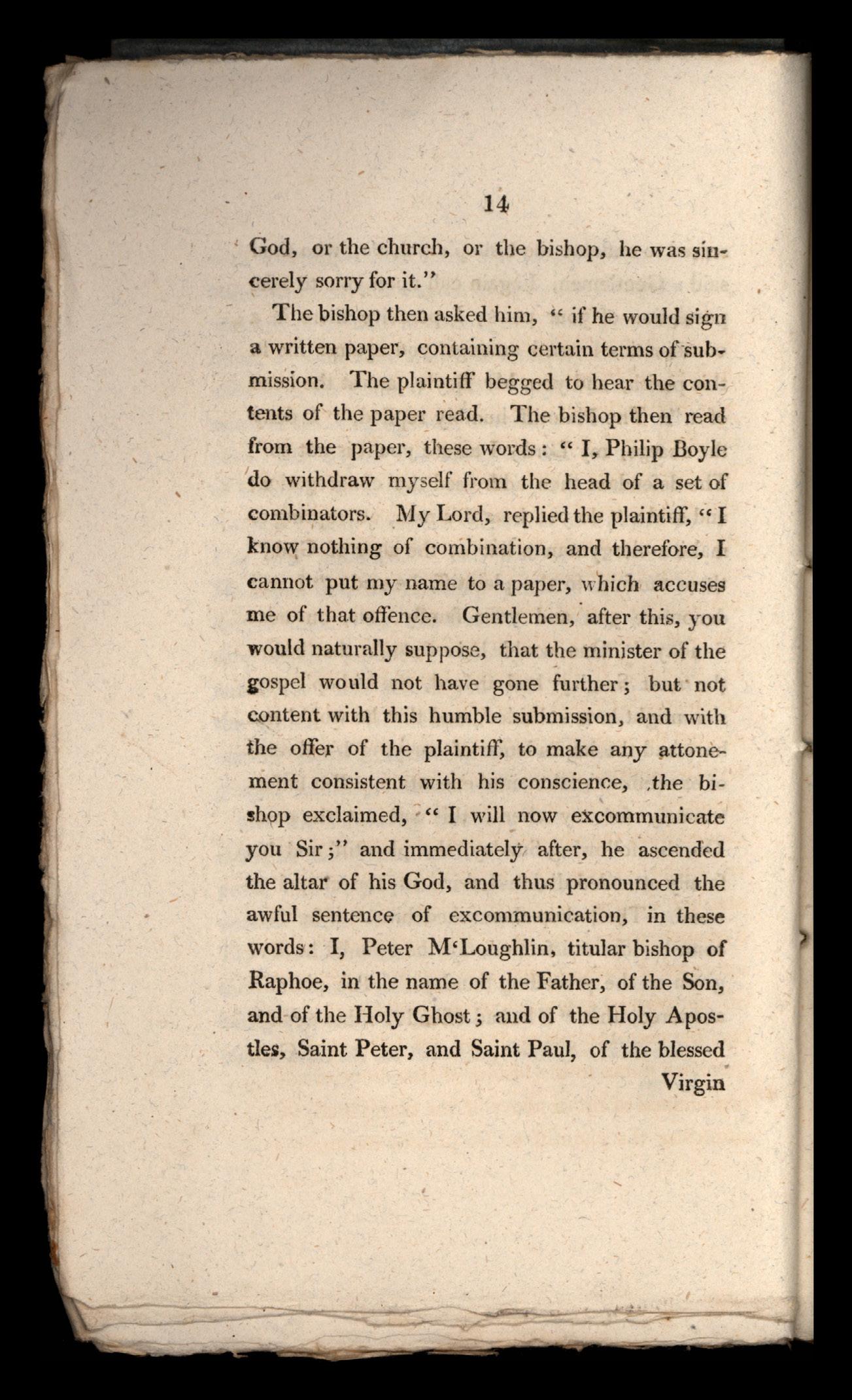
God, or the church, or the bishop, he was sin• cerely sorry for it."
The bishop then asked him, " if he would sign a written paper, containing certain terms of ·submission. The plaintiff begged to hear the contents of th e paper read. The bishop then read from the paper, these words : " I, Philip Boyl e <lo withdraw my self from the head of a set of combinators. My Lord, replied the plaintiff, "I know nothing of combination, and therefore, I cann ot put my name to a paper, "hich a.c c uses me of that offence. G entl eme n, · after this, you would naturally suppos e, that the minister of th e io spcl would not hav e gone further; but not content with this humble submission, and with the offer of the plaintifl: to make any ~ttonement consistent with his conscience, .the bishop exclaimed, " I will now ex.communicate you Sir;" and immediately after, he ascended the altar of his God, and thus pronounced the awful sentence of excommunication, in these words: I, P eter M•Loughlin, titular bishop of Raphoe, in the nam e of the Father, of the Son, and of the Holy Ghost; and of the Holy Apostles, Saint Peter, and Saint Paul, of the blessed Virgin

Virgin Mary, Mother of God, and of all the Ange ls and Saints in Heaven, <lo excommunicate you, Philip Boyle, until you sign this paper. The candles were then extinguished. The chapel bells were rung ; and thus was my unfortunate c1;ent consigned to temporal infamy. Gentlemen, pem1it me to ask you, di<l his ofTence justify such a punishment ? Did he , for refusing to brand himself with infamy, merit expulsion from his God, from his religion, and from the society of his friends ? If this impious curse be registered in Heaven's Chancery, it will appear injudgm ent. against the man that uttered it, and will not affect the injured person against whom it was pronounced. Gentlemen, the plaintiff being excluded from the chapel of Ballyshannon, attended divine service, at a n eighbouring chapel, in another diocese, where the clergyman had the humanity to receive him. The d efendant bei ng informed of this circumstance, was resoh ed to cut off all spiritual communication (so far as in him lay) between the plaintiff and his God, and he therefore wrote to the bishop of that diocese, and complained of the conduct of the clergyman, for a4mitting the plaintiff to be present during the time

16 .. • time of divine service. The bishop, on receiving the complaint of the defendant, wrote to this clergyman, and charged him, under a severe·penalty, not to suffer the plaintiff to enter the chapel, until he should have made the submission • required of him by Dr. M'Loughlin. Thus was this wretched man rendered an outcast from all civil and religious society, and deprived of the spiritual consolation of worshipping God, for not pleading, guifty to . the charge of being a combinator. Gentlemm, I have related the whole of the facts of this case to you. This is an action reluctantly brought by a Roman Catholic fellowcitizen, before a jury of his countrymen, against a bishop of his own religion-a clergyman whom he bad always respected, and whom he had never offende<l. Gentlemen, this is the case of a much injured indivi<lual, who comes before a most respectable jury, and says, " I- am inno" cent of any crime; judge if I be deserving of " being ~xpelled from society, for not signing " my own condemnation. For not subscribing " my n .,. me to a falsehood, by professing myself " a combinator,"
Gentlemen,

Gentlemen, if it will appear to you, in evidence, that Dr. M'Loughlin, in the whole of his conduct towards the plaintiff, was solely influenced by a sense of religious duty, and that he had sufficient cause, according to the laws and discipline of his church, for excommunicating my client, I trnst you will find a verdict for the defendant.
But if the facts I have already stated to you shall be fu11y proved, and that Dr. ~f' Loughlin, for the purpose of procuring a temporal advantage to himself, has banished the plaintiff from society, and deprived his children of the means of earning his subsistence, no compensation, in damages, which you may think h.im entitled to receive, can be too liberal.
Evidence on the part of the Plaintiff.
ELIZABETH BOYLE, examined hy ~fr. SMYLY.
Q. You are daughter to the Plaintiff?
A. lam.
Q. Do you know the Defendant, Dr. M'Lou3hlin?
A. I do.
Q. Is he the bishop of your diocese ?
A. He i8.
Q. You, and all your family are Rommjl Catholics?
Q, We
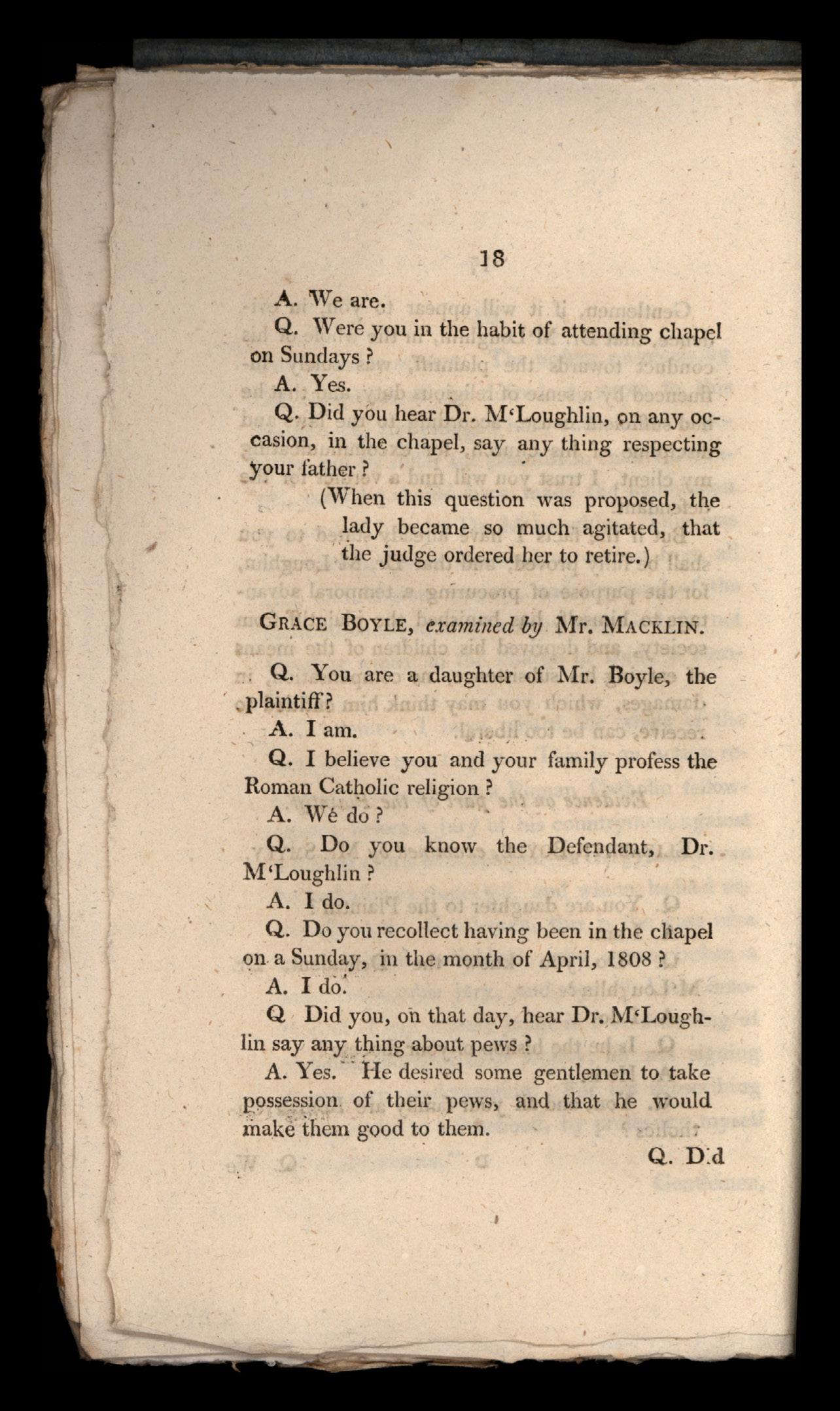
A. 'We are.
Q. ,vere you in the habit of attending chapel on Sundays?
A. Yes.
Q. Did you hear Dr. M•Loughlin, on any occasion, in the chapel, say any thing respecting y~ui· father ?
(W.hen this question was proposed, the lady became so much agitated, that -t1 the judge ordered her to retire.)
. Q. You are a daughter of Mr. Boyle, the • . plaintiff?
. .A. I am.
Q. I believe you and your family profess the Roman Cat~olic religion ?
A. W'e do?
Q. Do you know the Defcpdant, Dr. M 'Loughlin ?
A. I do.
Q. Do you recollect having been in the chapel (?11- a Sunday, in the month of April, 1808 ?
A. I do'.
Q Did you, on that day, hear Dr. M•Loughlin say any t~ing about pews ?
A. Yes. · • He desired some gentlemen to take p9ssession of their pews, and that he v,·ould 1nake them good t? them .
Q. D :d

Q. Did any person m~kc an o~jectio.n to what Dr. l\1 1 Loughlin said on that occasion?
A. 1'Iy father said the parishioners would not agree, or give their consent t.o it.
Q. Did the bishop make any reply?
A. Ile asked why not?
Q. What did your father then say?
A. Ile said that the arrear of debt due would be soon made up. He had returns.in his pocket, amounting to £180.
Q. Do you recollect any con\.'t!rsation to haYe taken place between the bishop and your father, on any subsequent Snnday ?
A. At another time I heard the bishop say to some gentlemen, ~' take possession of your " pews, I will make th~m good to you."
Q. Do you recollect any ~hing further ?
A. Yes. The bishop said, to indulge the parishioners, he had suffered them to subscribe some money, but h e ha<l done wrong, and he would order the collectors to give the money back again . H e then_ pointed out to the pew where our family were sitting, and desired j\fr. :Michael Cassidy to take possession of his pew.
Q Do you recollect any particular circumstance having happened after this ?
A. On the following Sunday my father went t-0 tlie chapel, when something passed. The bishop asked my father, if he was come to make a submis!>ion? .My father said, that if by any D !l rash '· •
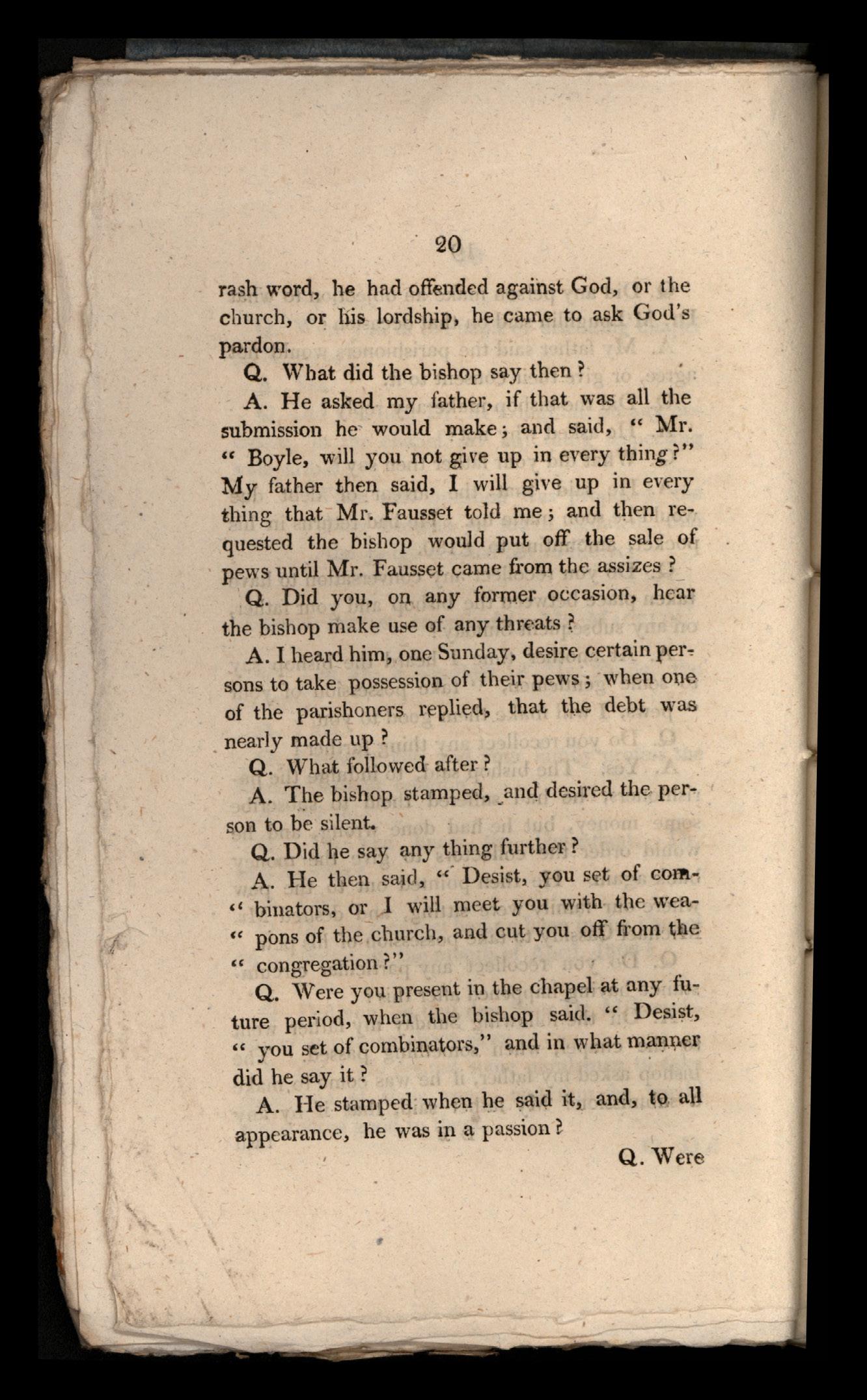
rash word, he hnd offended against God, or the church, or his lordship, he came to ask Go<l's pardon.
Q. What did the bishop say then ?
A. He asked my father, if that was all the submission he would make; and saiu, " Mr. " Boyle, will you not gi ,,e up in every thing ?"
My father then said, I will give up in e,·ery thing that Mr. Fausset told me ; and then requested the bii,hop would put off the sale of pews until Mr. Fausset came from the assizes ?
Q. Did you, on any former occasion, hear the bishop make use of any threats ?
A. I heard him, one Sunday, desire certain per., sons to take possession of their pews; when o~e of the parishoners rf!plied, that the debt was nearly made up ?
Q. What followed after ?
A. The bi!>hop stamped, Jand desired the person to be silent.
Q,. Did he say any thing further?
A. He then said, " Des ist, you set of colll,, biuators, or I will meet you with the wca" pons of the church, and cut you off from ~he " congregation ?"
Q. Vvere you present in the chnpel at any future period, when the bishop said. " Desist, " you set of combinators," and in ·what mam;ier did he say it ?
A. He stamped when he said it, and, to all appearance, he was in a passion?
Q. \Vere

Q. ,vere you present when the excommunition took place ?
A. I was present ,, hen the bishop called the attention of his hearers. He then put on his stole, and took out of his pocket a written paper. He then asked my father, if he was come to make a submission? my father s·tid, if he had offended, he was willing to ask pardon, and requested him to read the paper.
Q. What followed ?
A. The bishop read the paper, and my father rep c~ted the words after him, till he came to these words, I, Philip Boyle, withdraw my,;;elf from a. set of ~oml>inators.
Q . What did your fath er then say?
A. He said he was no combinator. Ile knew nothing of combination or compiracy, and therefore he would not sign that paper. The bishop then said, if my fath1:r would not sign it, he would excommuni~ate him,
Q. What followed after this com-ersation ?
A. My father said, he hacl no othe r obj ection to sign the paper, ihan to the word, combinator.
Q. Do you remember wllat the bishop did afterwards ?
A. He asked my father, two or three times, to sign the paper; a.n<l then to~<l him, he would excommunicate him.
Q. Do you recollect the words the bishop made use of, o~ that occasion ?
A. He

A. He said, In the name of the Father, and of the Son, and of the Holy Ghost~ I, P et e r M'Loughlin, titular bishop of the diocese of Raphoe7 can all th e Saints and Angels in Ile~1xcn to witn ess, the Apostles, Saint Pete r and P auT, that I excommt1nicate y ou, Philip B oyle, un l il you sign this paper.-He then rung the b elt.
Q. In what line of life was your fath er?
A. Ile lived by his own industry, and by ours I, an'd my si ster Eliz.abe.th, live<l in hi s hou se.
Q. You were mantua-makers. For whose emolument did you work ?
A. For my father's and his famify's ,
Q. How were the {>rofits of your bu sin ess applied 2
A. For the support of my father•s fami-ly.
Q. " 7cre there many p ersons who employed you in the way of your trade?
A. There were.
Q
. Did they continue the ir business after the e xcommunication had t aken place ?
A. Some of them gave mt: tl1c ir bu siness ; an ti othe rs of them withdrew thcrr custom.
Q. ,ve re the persons who used to frequen t your hou se, both Catholi c s and Protestants ?
A . Th ey were.
Q. II ave you ob served any thing in particular in the condu ct of your Catholic friends and a cquaintanc es ?
··A. Som e . \

A. Some of them came to our house, and othrrs staid ofl:
Q. Do you know a pei·s011 of the name of f ary :M •Clean ?
A. I do.
Q. Has she dealt with you smce the excommunic,atioo?
A. She has.
Q. Do you know one Sally iI•Golrick; has she dealt with you since]
A. She has not.
Q. Do you know of your father having prepared a shop, some time previous to the excommunication having taken place, for the purpose of commencing busiuess r
A. I do.
Q. Did he carry his intention into execution?
A. He did uot.
Q. "'as he in expectation of receiving assistance from his friend~?
A. He was.
Q. Had he many friends ?
A . lie had.
Q. Did they frequent his house as usual?
A A great ma11y of them staid off.
Cross examined by 11:R. JOHNSTON.
Q. I believe your father has been a shoemaker in
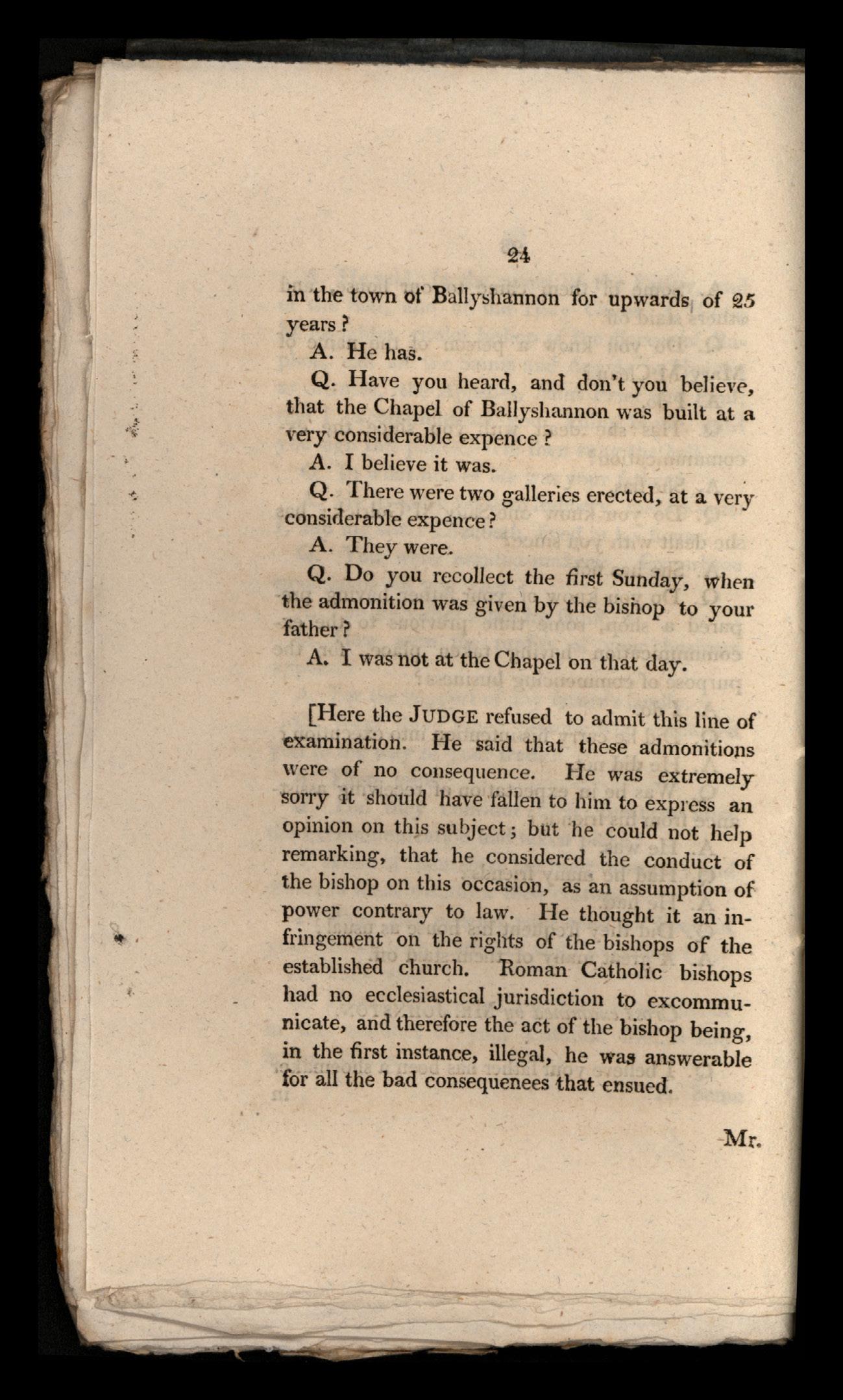
in the town of Ballyshannon for upwards of 25 years?
A. He has.
Q. Have you heard, and don't you believe, that the Chapel of Ballyshannon was built at a vet-y considerable expencc 2
A. I believe it was.
Q. There were two galleries erected, at a very considerable expcnce?
A. They were.
Q. Do you recollect the first Sunday, when the admonition was given by the bishop to your father?
A. I was not at the Chapel on that day.
[Here the JUDGE refused to admit this line of examination. He said that these admonitions were of no consequence. IIe was extremely sorry it should have fallen to him to express an opinion on this subject; but he could not help remarking, that he considered the conduct of the bishop on this occasion, as an assumption of power contrary to law. He thought it an infringement on the rights of the bishops of the established church. Roman Catholic bishops had no ecclesiastical jurisdiction to excommunicate, and therefore the act of the bishop being, in the first instance, illegal, he was answerable for all the bad consequenees that ensued.
Mr.
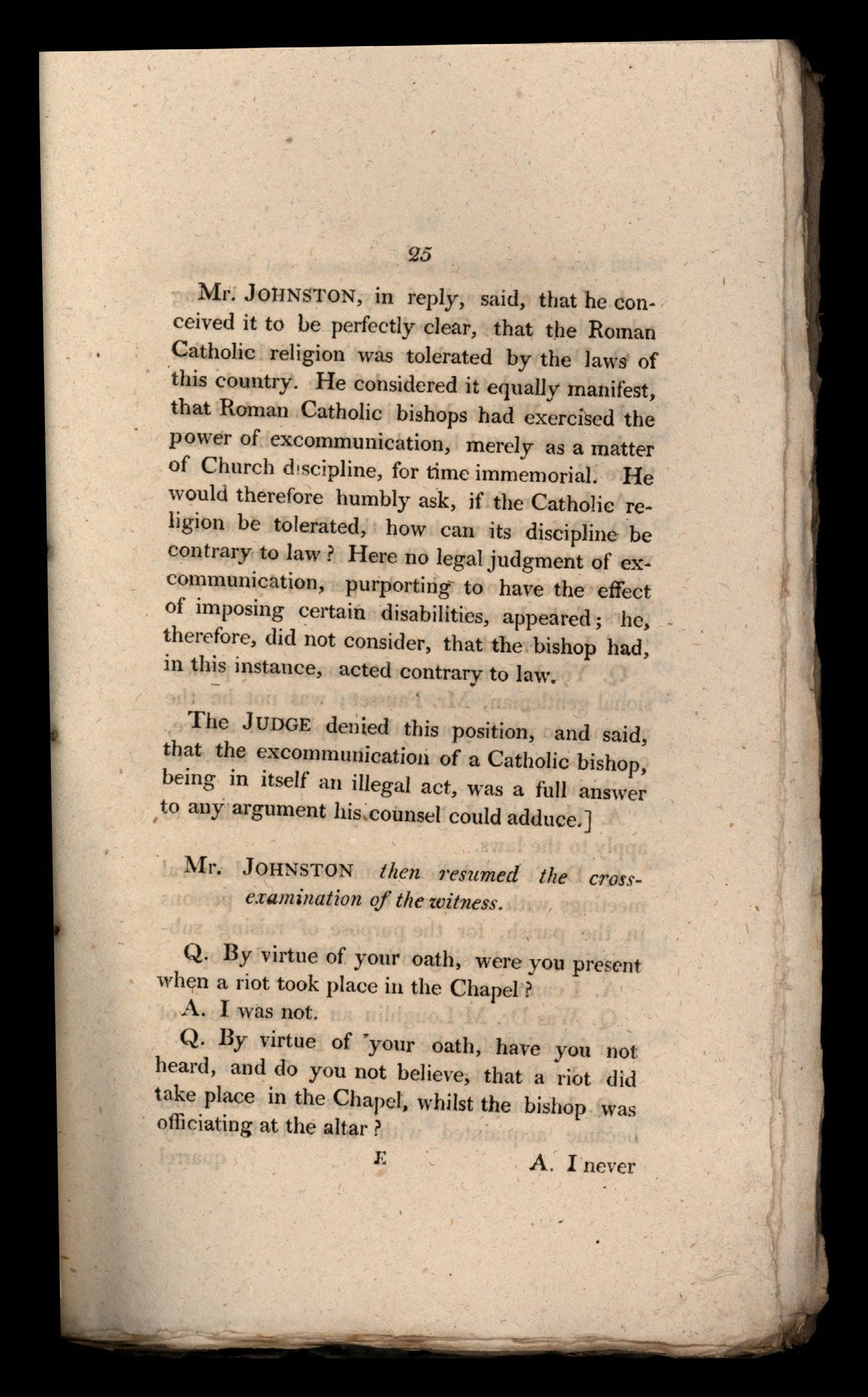
Mr. JOHNSTON, in reply, said, that he con• ceived it to be perfectly clear, that the Roman Catholic religion was tolerated by the Jaws of this country. He considered it equally manifest, that Roman Catholic bishops had exercised the power of excommunication, merely as a matter of Church d•scipline, for time immemorial. He would therefore humbly ask, if the Catholic re• ligion be tolerated, how can its discipline be contrary to law? Here no legal judgmcnt of ex• communication, purporting to have the effect of imposing certain disabilities, appeared; he, therefore, did not consider, that the bishop had, in this instance, acted contrary to law.
The JUDGE denied this position, and said, that the cxcommuuication of a Catholic bishop, being in itself au illegal act, was a full answer to any argument his counsel could adduce. J
l\fr. JOHNSTON then 1·esumed the cross• e:camination of the witness.
Q. By virtue of your oath, were you present when a riot took place iu the Chapel ?
A. I was not.
Q. By virtue of ·your oath, have you not heard, and do you not believe, that a riot <lid take place in the Chapel, whilst the bishop was officiating at the altar ?
F. A. I never
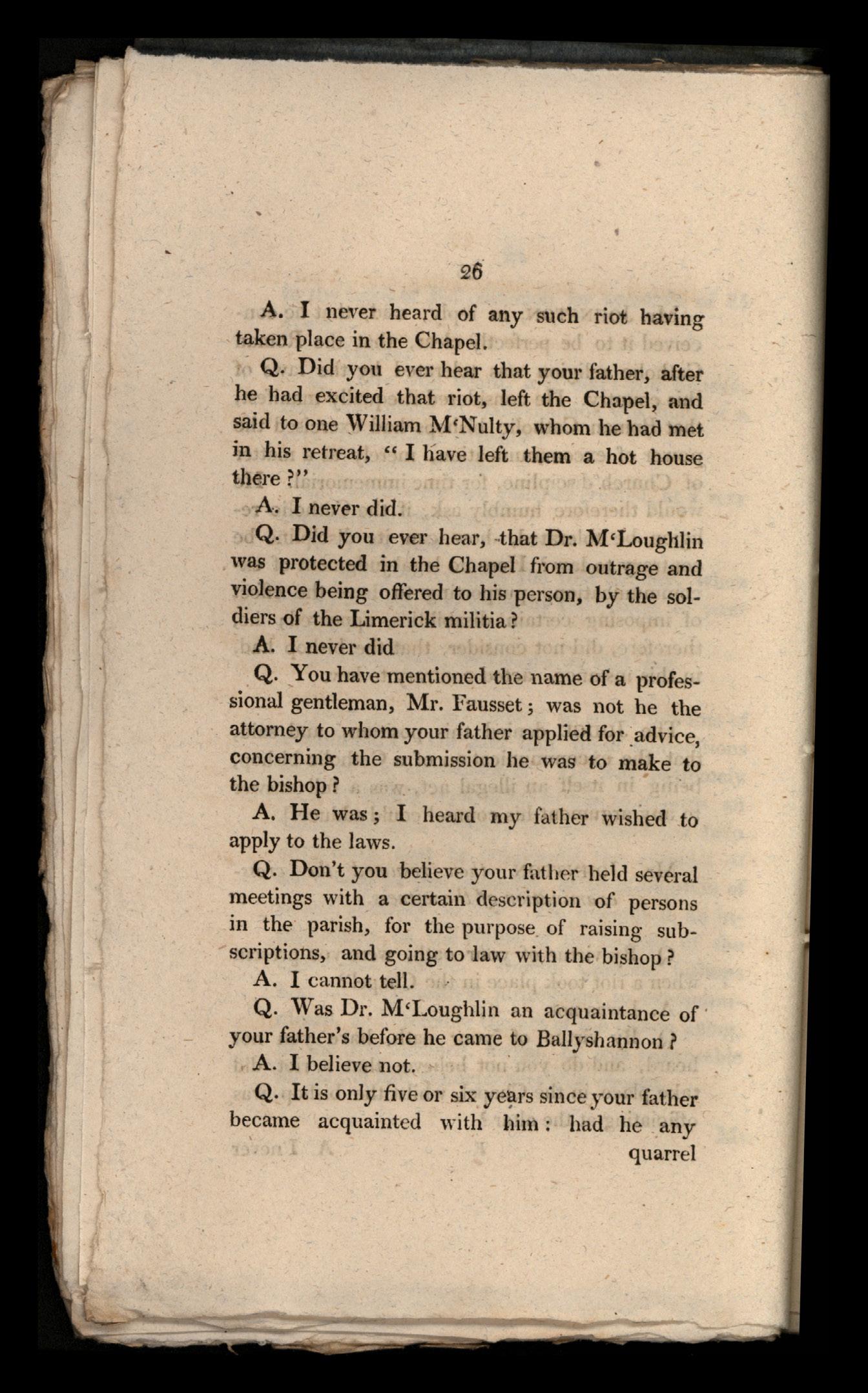
A. I never heard of any such riot having taken place in the Chapel.
Q. Did you ever hear that your father, after he had excited that riot, left the Chapel, and said to one William ~i'Nulty, whom he had met in his retreat, " I have left them a hot house there?"
A. I never did.
Q. Did you ever hear, that Dr. ~!'Loughlin was protected in the Chapel from outrage and violence being offered to his person, by the soldiers of the Limerick militia?
A. I never did
Q. You have mentioned the name of a profes- sional gentleman, Mr. Fausset; was not he the attorney to whom your father applied for advice, concerning the submission he was to make to the bishop?
A. He was; I heard my father wished to apply to the laws.
Q. Don't you believe your fatlir.r held several meetings with a certain description of persons in the parish, for the purpose of raising subscriptions, and going to law with the bishop?
A. I cannot tell.
Q. ,vas Dr. M'Loughlin an acquaintance of your father's before he came to Ballyshannon?
A. I believe not.
Q. It is only five or sLx years since your father became acquainted with llim : had he any quarrel
quarrel or misunderstanding with your father during that time?
A . No. I never heard of any.
Q. There were meetings in the parish for the purpose of collecting money, to pay the arrears due for building the galleries. ,vas it for that purpose the meetings were held at one Brigg's?
A . I cannot tell.
Q . Did you ever hear of any committee of which your father was a member?
A. I never did .
Q. Have you not heard that Dr. Sheil, Edward Kelly, and Mr. Owen Cassidy were ap• pointed a cc5mmittee by the parishioners, to transact the business of the building of the galleries.
A . I do .
:MICHAEL DALY, e:ramined b!J MR ROLLESTON
Q. Do you know the parties, plaintiff and defendant, in this action ?
A. I do.
Q . You are an inhabitant of the parish of Kilbarren?
A. lam.
Q . Do you know how the Chapel of that parish was built ?
A. I do.

Q . ,vere
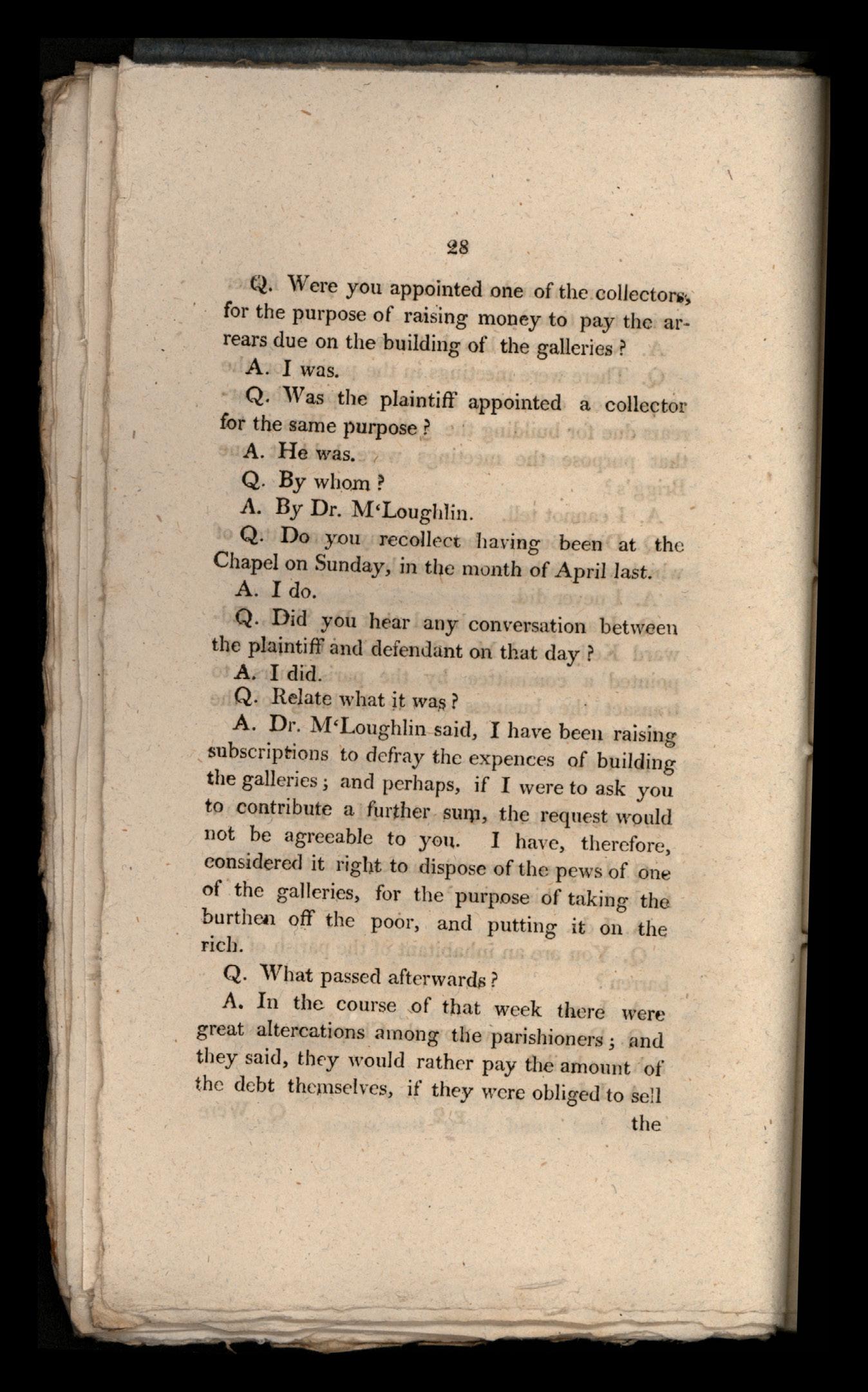
Q. ,vcrc you appointed one of the colJecton;, for the purpose of raising money to pay the arrears due on the building of the galleries ?
A. I was.
Q. ,vas the plaintiff appointed a collector for the same purpose ?
A. He was.
Q. By whom?
A. Dy Dr. ~f•Loughlin.
Q. Do yon rccollt'ct lrn\·ing been at the Chapel on Sunday, in the m0nth of April last.
A. I do.
Q. Did you hear any con\'crsation between the plaintiff and defenuant on that day ?
A. I did.
Q. Relate what it was?
A. Dr. ~!•Loughlin said, I have been raising subscriptions to defray the expences of building the galleries; and perhaps, if I were to ask you to contribute a further surp, the reqnest would not be agreeable to yoll. I ha, c, therefore, considered it right to dispose of the pews of one of the galleries, for the purpose of taking the burthen off the poor, and putting it on the rich.
Q. ,vhat passed aftcnvardJ;?
A. In the course of that week there were great altercations among the parishioners; oncl they said, they would rathC'r pay the amount of th e debt thcmsch·cs, if they were obliged to sell the

the shirts off their backs, sooner than the gentl.e men of Ballyshannon should get the pews. Two collectors were then appointed by the bishop to raise the amount of the arrear from the parishioners, and I am one of them. \Ve were not able to make up the collection in the given time, and I do not know exactly what sum was collected.
Q. Did you see the plaintiff and defendant in the Chapel together at a,ny time after this, and what did you hear Dr. M'Loughlin say on that occasion 'l
A. I heard him say he had done what he ought not to have done, and that he never should have appointed collectors, but sold the pews; then Mr. Boyle made some reply, but I do not recollect what it was. l think he said, he would not suffer it.
Q. What reply .did the bishop make?
A. He said, if Mr. Boyle would not cease, he would denounce him.
Q. What more did he say?
A. On the follc,win~ Sunday there was a great tumult in the Chapel; I heard the bishop say, he did not wish for any trouble in 'the Chapel.
Q. Were there any soldiers present ?
A. There was.
Q. Did Dr. 11'Loughlin address the soldicrs?
A. Not
A. Not to my knowledge; after some conversation had taken place, the row immediately commenced.
Cross-examined by MR: BOYD.
Q. Was not this Chapel built by public sub:sci-i ption 2
A:. It ·was.
Q. ,vas it not Dr. iiI'Loughlin who suggested the plan of building two galkric~, for the accommodation of the parishioners?
A. It was: the galleries were to have been .built by the money collected from the parish10ners. #
Q. Did not Dr. ~{'Loughlin approve of that manner of paying the expences of the buildu1g ? •
A He did.
Q. ,vas there not a certain time given to the pat·ishioners to raise the sum required ?
A. There was.
Q. How much money was raised by the collectors?
A. I do not know.
Q. ,vas it not very far short of the sum which the galleries cost ?
A. It was.
Q. Was it not on that account ~!•Loughlin proposed to dispose of the pews?
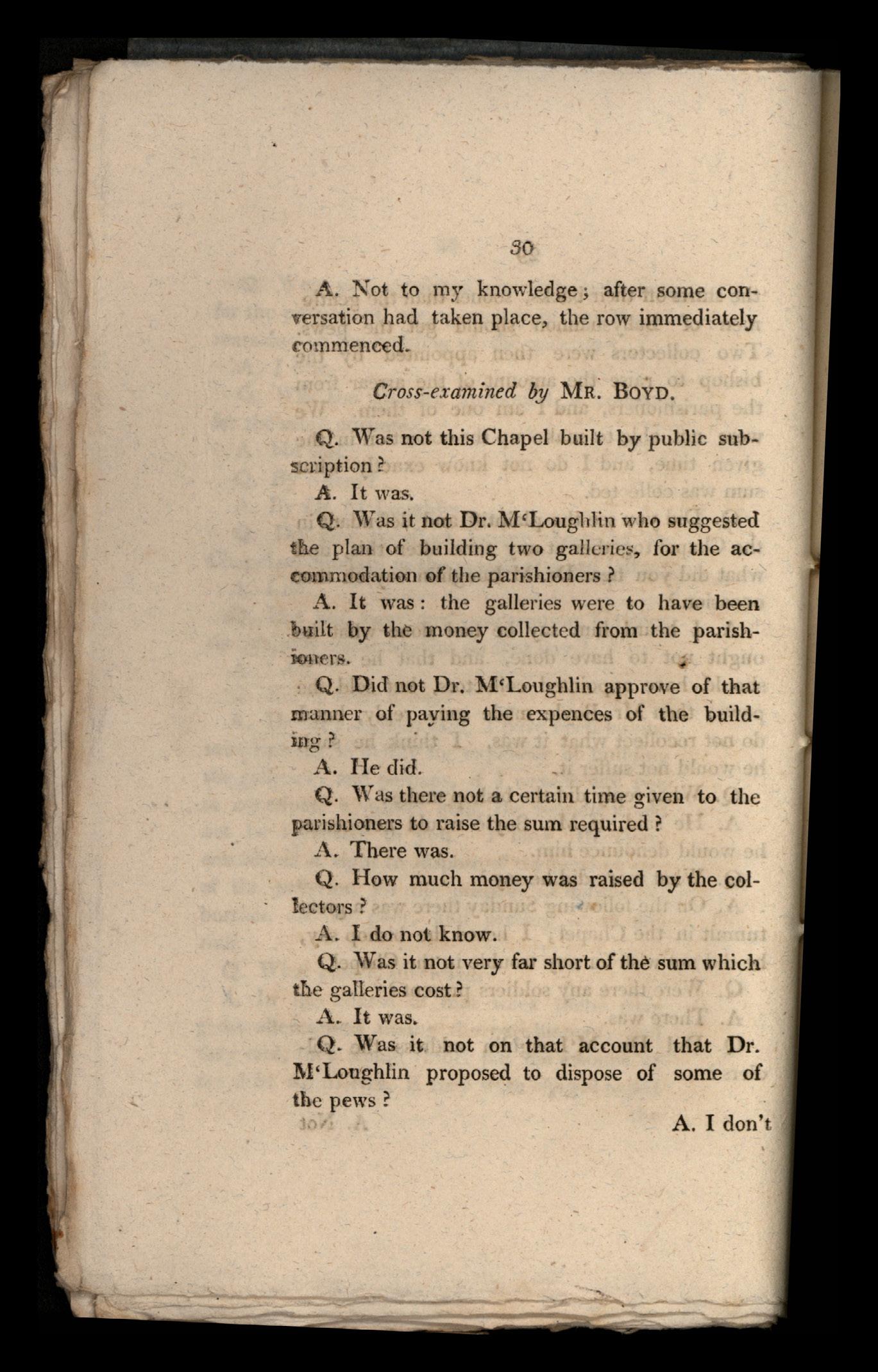
that Dr. some of
A. I don't
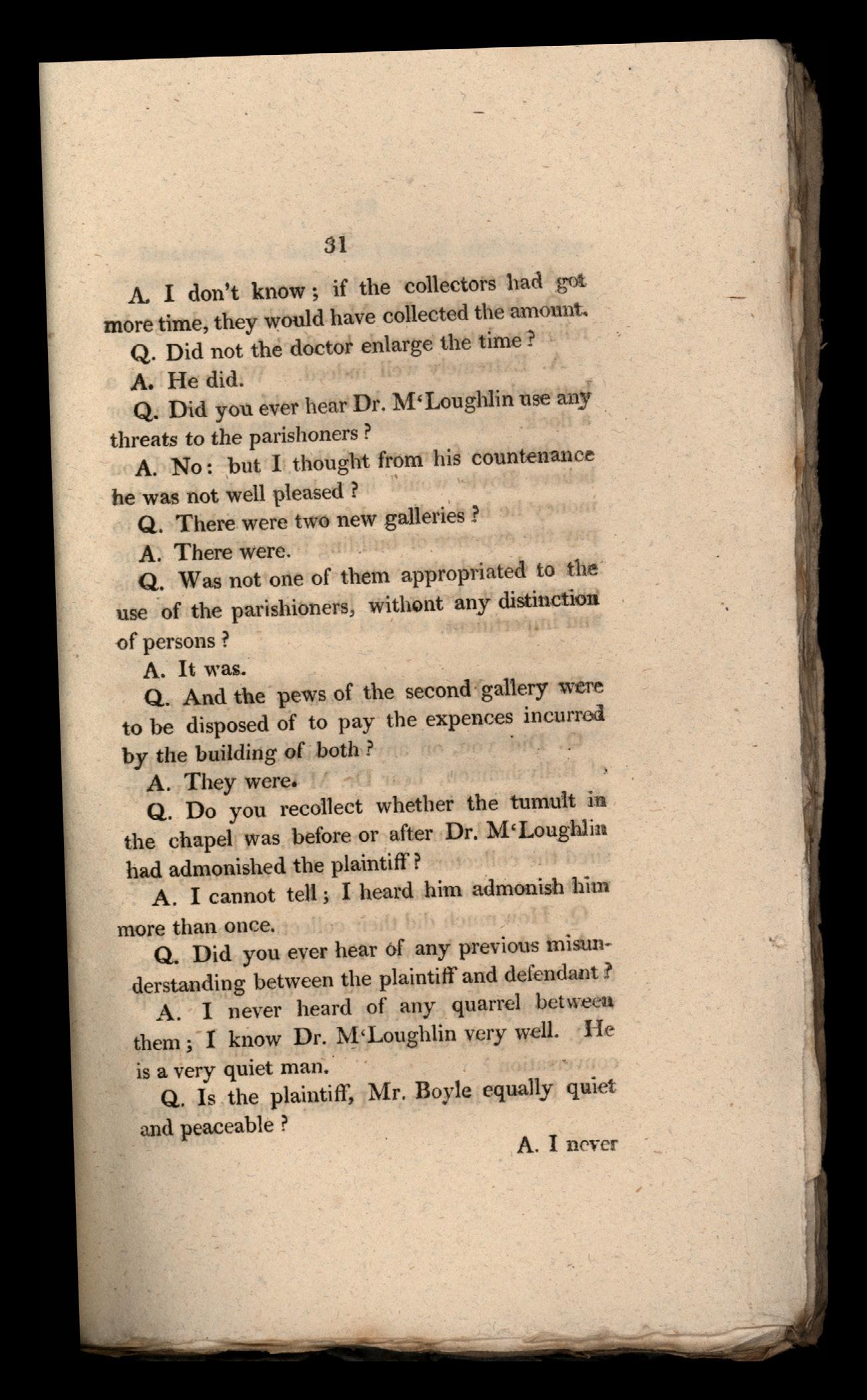
A I don't know ; if the collectors had go1 more time, they would have collected the amount.
Q. Did not the doctor enlarge the time ?
A. He did.
Q. Did you ever hear Dr. M'Loughlin use any threats to the parishoners ?
A. No: but I thought from his countenance he was not well pleased ?
Q. There were two new galleries ?
A. There were.
Q. Was not one of them approprinted to the use of the parishioners, withont any distinction of persons?
A. It Wai.
Q. And the pews of the second gallery were to be disposed of to pay the expences incurred by the building of both ? •
A. They were.
Q. Do you recollect whether the tumult in the chapel was before or after Dr. M'Lougblin had admonished the plaintiff?
A. I cannot tell; I heard him admonish him more than once.
Q. Did you ever hear of any previous misunderstanding between the plaintiff and defendant?
A. I never heard of any quarrel bct\n~<:n them; I know Dr. M'Loughlin very well. H e is a very quiet man.
Q. Is the plaintiff, Mr. Boyte equally quiet and peaceable ?

A. I never knew an honester man.
Q. How does Dr. M•Loughlin discharge hi! religious duties towards his flock?
A. Extremely well indeed. ,ve never had a bctt~r clergyman---a better could not b e had for a flock.
,Question from one of the jury.-) Did you bclie,'e Boyle would ha,·e been able, from the money he had coUected from the parishioners, to pay the expence of building the galleries ? (The judge desired the witn<'ss not to answer this question, it being, in his opinion, immatecial ancfimpertinent.
EDWARD BOYLE, examined by Mn. SMYLY.
Q. Did you, on any occasion, in the chapel of Ballyshannon, hear Dr. if •Loughlin say any thing to the plaintiff?
A. I heard him denounce him. The Dr. d esired the collectors to return their accounts, and what money they had received.
Q. How much did the ir collection amount to ?
A. I do not know. They gave in th eir returns- to Philip Boyle, and he told the bishop what money was collected.
Q. Did you, at any time, hear any farth er con\'ersation ?
A. I heard him say," Desist, you set of combinators
., binators, or I will cut you off with the wea. " pons of th e church."
Q. Was Boyle, the plaintiff, in the chapel then?
A. He was.
Q. Did yon hear the d efcnd.1nt say any thing to him on the following Sunday ?
A. He ex.communicated him on that day.
Q . \Vhat di tl the bishop say before he cxcommw1icated him ?
A. He askrd him to sign a paper. Boyle said, if he offended God, or the church, he was sorry for it; and the Dr. was not pk:a ed with that ?
Q . Do_you recollect Boyle's saying any thing to the bishop ?
A. ' lie asked the bishop to read the paper wh ich mentionecl, to withdraw h i mself from a set of combinators; and Boy le then denied hav• ing any thing to do with combinntors.
Q. I suppo. e you were areatly surprized at what followe<l after ?
A . I never heard such a thing in that chapel before.
Cross examined by Mr. COLE.
Q. Were you in the chapel each time that thcDishop admonlsne<J Ur. Doyle ?
A. I wis.

F Q. Thrre
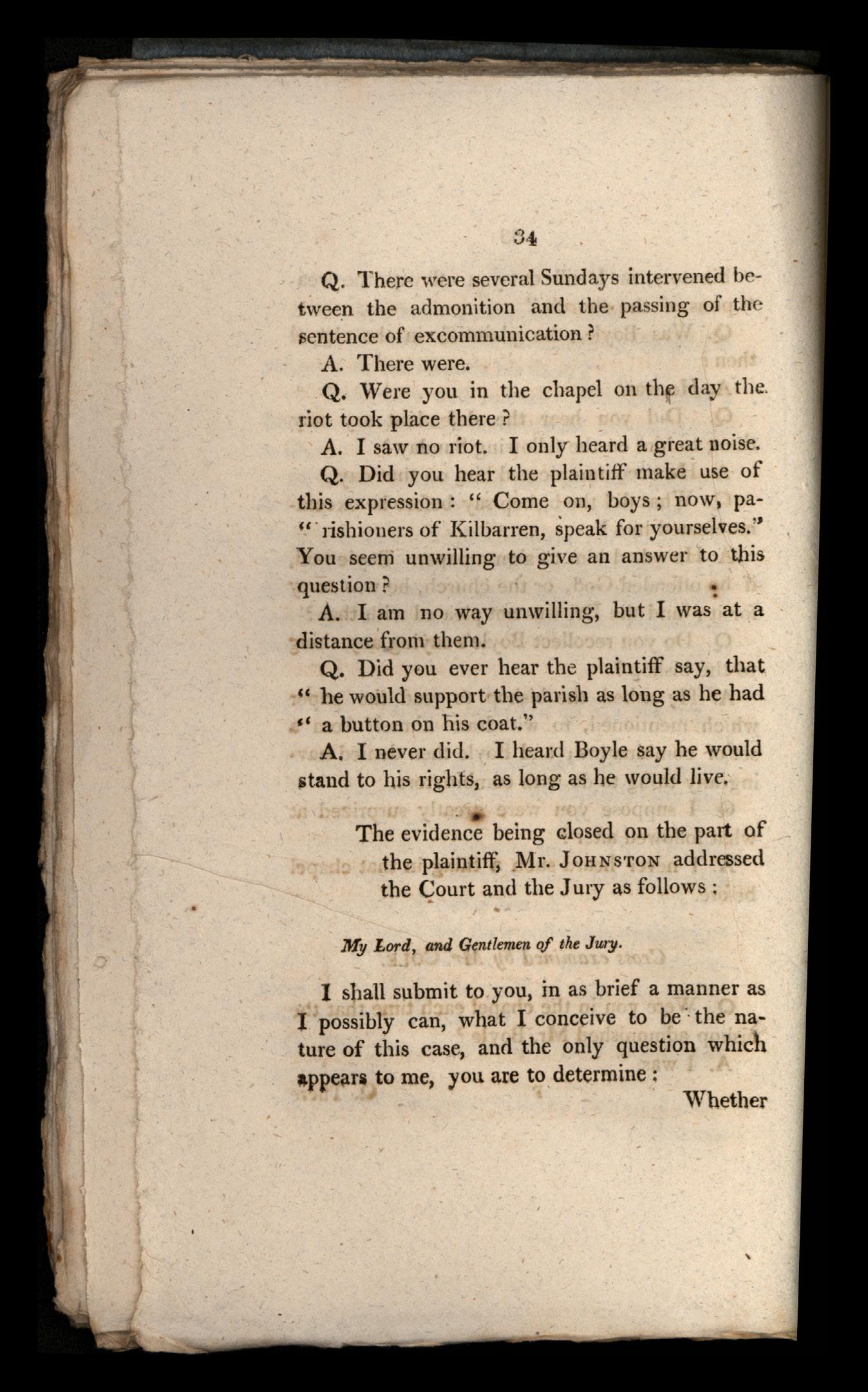
Q. There were several Sundays intervened between the admonition and the passing of th e sentence of excommunication ?
A. There were.
Q. Were you in the chapel on th f <lay the, riot took place there ?
A. I saw no riot. I only heard a great noise.
Q. Did you hear the plaintiff make use of this expression : " Come on, boys ; now I pa,, ·rishiouers of Kil barren, speak for yourselves. '' You seem unwilling to give an answer to this question? .
A. I am no way unwilling, but I was· at a distance from them.
Q. Did you ever hear the plaintiff say, that " he would support the parish as long as he had '' a button on his coat.''
A. I never di<l. I heard Boyle say he would r.tand to his rights, as long as he would live.
· • The evidence being closed on the part of the plaintiff, Mr. JOHNSTON addressed the <;ourt and the Jury as follows :
M!I Lord, and Gernlemen qf the Jury .
I shall submit to you, rn as brief a manner as l possibly can, what I conceive to be ·. the nature of this case, an<l the only question which ippeara to me, you are to determine ; " ' hether
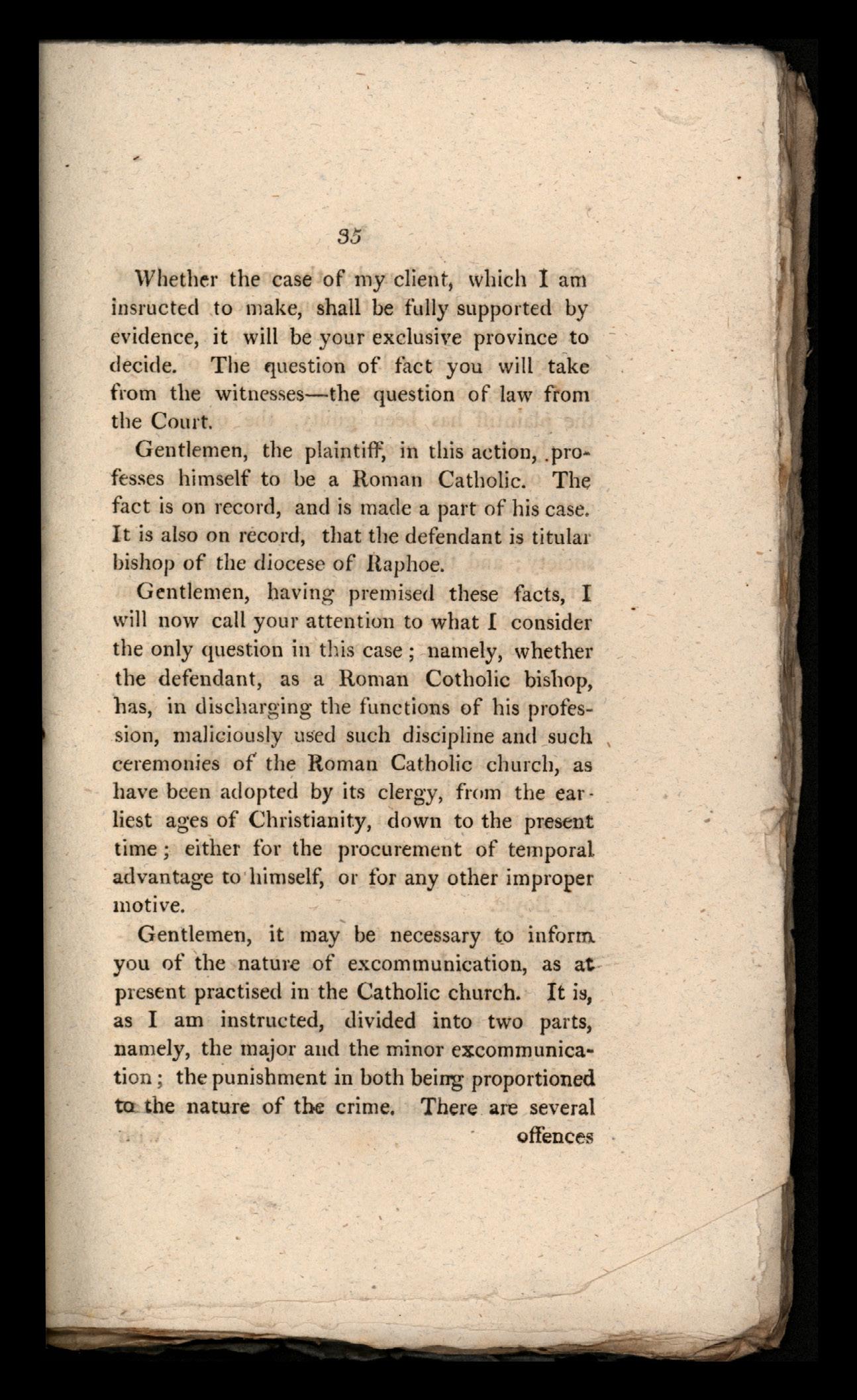
Whether the case of my cli e nt, which I am in s ructecl to make, shall be fully supported by evidence, it will be your exclusive province to decide. The f}_uesti o n of fact you will take from the witnesses-the ques tion of law from the Court.
Gentl e men, the pl aintiff, in this action, . professes him self to be a Roman Cath olic. The fact is on record, and is made a part of his case. It is also on record, that the defendant is titula1 bi shop of th e di ocese of Uaph oe.
Gentlemen, havin g premised these facts, I will now call y o ur attention to what I consider the only question in t h is case; namely, whether the defendant, as a Roman Cotholic bishop, has, in disch a rg ing the functions of his professio n, malici o us ly us-ed such discipline and such ceremoni es of the Roman Ca th olic church, as l1a, e b ee n adopted by its clergy, from the ear . liest ag es of Christianity, down to the present time; either for the procurement of temporal advantage to himself, or for any other improper moti ve
G e ntlemen, it may be ne cessary t_o inform y o u of the nature of excommunication, as at present practised in the Catholic church. It i:i, as I am instructed, divided into two parts, namely, the major aud the minor excommunica• ti on; the punishment in both being proportioned to.. the nature of the crime. There are several offences
i
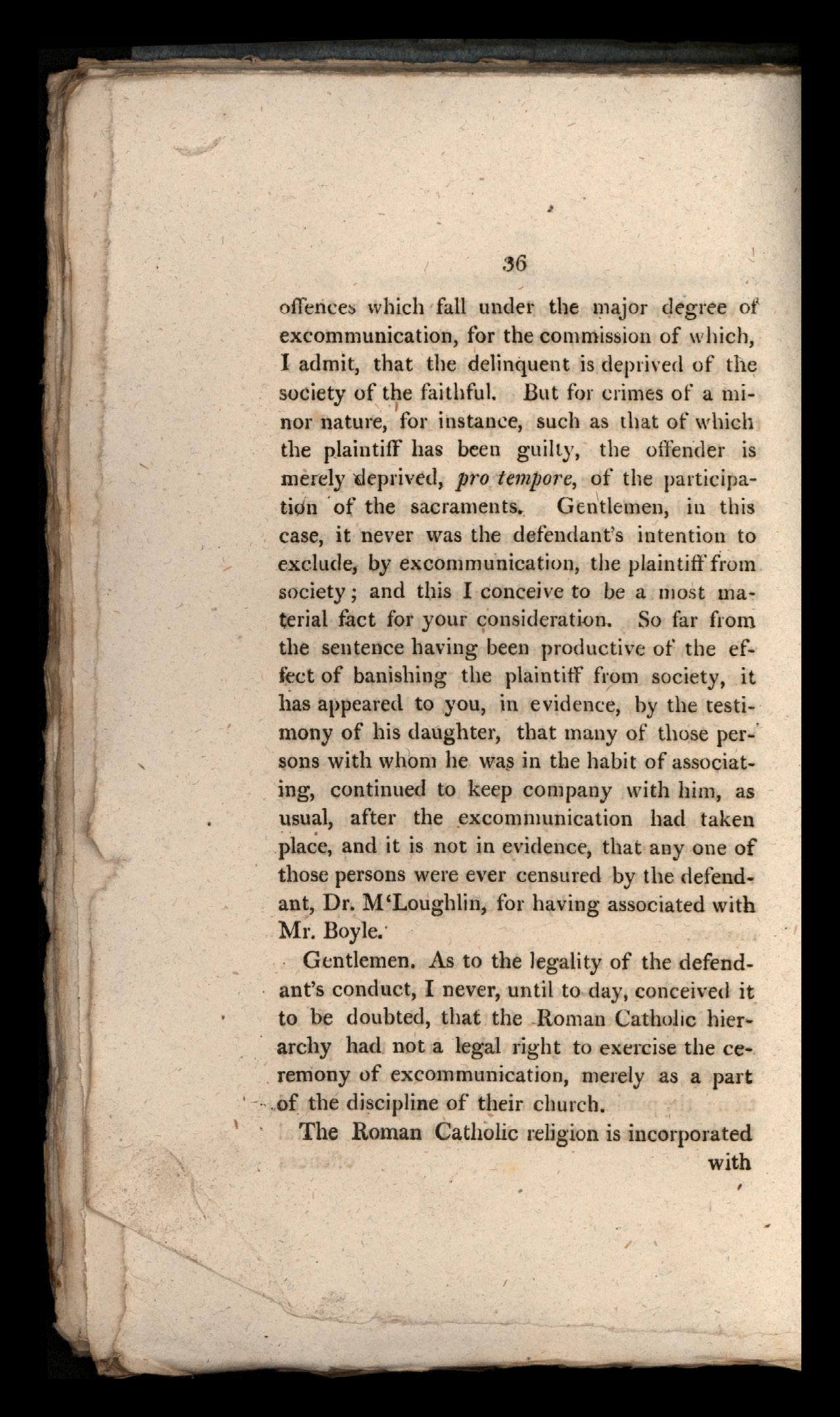
offencel> which fall under the 1~1ajor degree of excommunication, for the commission of which, I admit, that the delinquent is depri\'ecl of the society of the faithful. But for crimes of a minor nature, 1 for instance, such as that of which the p.laintiff has been guilty, the offender is merely 'deprived, pro tempore, of the participatidn •of the sacraments.. Gentlemen, in this case, it never was the defendant's intention to exclude, by excommunication, the plaintiff from society; and this I conceive to be a most material fact for your consideration. So far from the sentence having been productive of tbe effect of banishing the plaintiff from society, it lias appeared to you, in evidence, by the testimony of his daughter, that many of those per-· sons with whom he wa~ in the habit of associating, continued to keep company with him, as usual, after the excommunication had taken place, and it is not in evidence, that any one of those persons were ever censured by the defendant, Dr. M'Loughlin, for having associated with Mr. Boyle:
. Gentlemen. As to the legality of the defendant's conduct, I never, until to day, conceived it to be doubted, that the Roman Catholic hierarchy had not a legal right to exercise the ceremony of excommunication, merely as a part ·.. . of the discipline of their church.
' The Roman Catholic religion is incorporated with
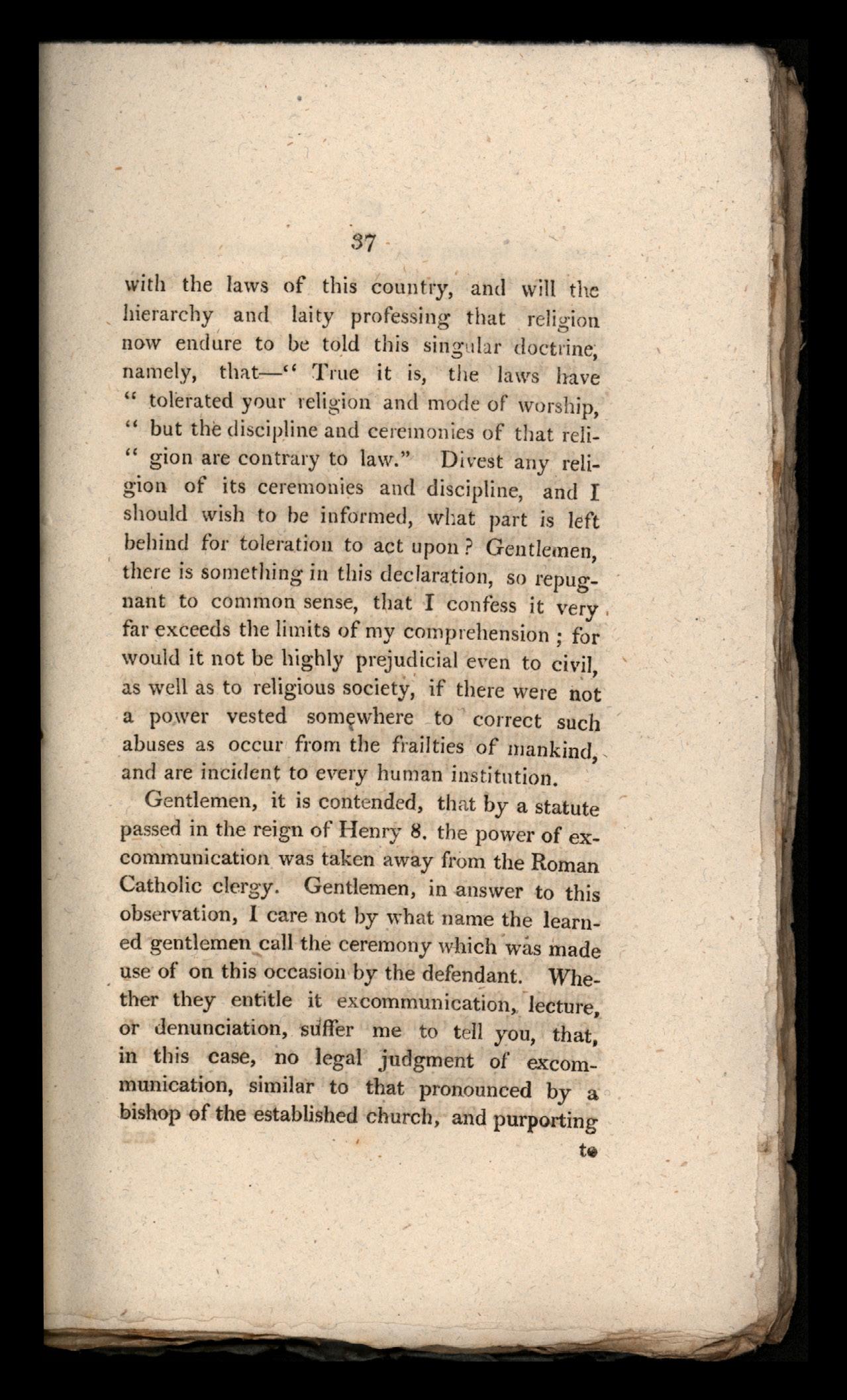
with the laws of this country, and will the hierarchy and laity professing that reli g ion now endure to be told this sin3" d .1 r doct rine, namely, that-" True it is, the laws have " tolerated your 1eligi on and mode of worsh ip, " but the di:.cipline and ceremoni es of that reli" gion are contrary to law." Divest any religion of its ceremonies and discipline, and I should wish to he informed, what part is left behind for toleration to act upon? Gentlemen, there is something in this declaration, so repugnant to common sense, that I confess it very far exceeds the limits of my comprehension ; for would it not be highly prejudicial e,·en to civil, as well as to religious society, if there were not a power vested som~where to correct such abuses a~ occur from the frailties of mankind , and are incident to every human institution. G entlemen, it is contended, th at by a statute passed in the reign of Henry 8. the power of excommunication was taken away from the Roman Catholic ck·rgy. Gentlemen, in answer to this obserrntion, I care not by wh a t name the learned gentlemen call the ceremony which was made use of on this occasion by the defendant. Whether they entitle it excommunication, lecture, or Jenunciation, suffer me to t ell you, that, in this case, no legal judgment of excommunication, similar to that pronounced by a bishop of the established church, and purporting t•

to have the same effect, app ears on rec ord~ therefore, i11 my mind, neither the statute, nor the common law, can at all apply Lo this ca se If it were otl·crwisc, and that the lnw had th e effect contended for, it would amount ~o this absur<l . anomaly- namely, that th e clisci}Jlin e of a church, tolerated by law, was ill egal.
Gentlemen, I now come to the point which I have already submitted to you, as the only question for you to exercise your judgment upon, namely-whether Dr. M.'Loughlin was influenced by a malicious motive; and I request you will keep this fact in your recollection, that it does not appear in evidence, thar the slightest misunde~standing, or quarrel, previous to tho riot in the Chapel, had ever subsisted between the plaintiff and defendant.
Gentlemen, I am happy to be informed that most of you arc acquainted with the revered character of the man, who is accused of doing an act of the greatest injustice to the plaintiO: publicly, falsely, and maliciously, and for th e procurement (as was stated by counsel) of tern• poral advantage to himself. By the. very first authority in this country I am told, that the defendant is one of the last men living who would be capable of doing an act of injustice, even to the veriest outcast of s9cicty ; or of deporting himself unbecoming the character of a dignified clergyman, or the feelings of a man of honour> and

and of a gentleman. I le is a man of the rno:.L humble, ge ntle, and conciliating manners; of the most unimpeachaulc moral conduct, and <'Xcmplary piety. Upon liis character alone, which is wdl known to all of yo u, 1 think I might saf<>ly r es t his case. For is it _µrobaLle, or can it Le imagined for a moml'nt, that such a man, in such a r,lace, i,tanding before the altar of bis God, could be g uilty of com mittin g the malicious act of ex cluding th e pb.intiff from society, without any probable cause, or previous dispute, for the base, me rcen ary motiv e of prn c urm g t emporal advantage to him se lf: Th e thing is t oo ]UOnstrous to obtain credit with you, gentlemen; and is too grossly absurd to be bclic\'ed by any rational man in the community .
Gentlemen, I shall now d etail to you th e facts of this case. Iu the year 1794, th ere being th en no Catholic Chapel in th e parish of Kilbarren, th.e parishioners entered into a sub ·cription for the purpose of buildin g a Chapel in the town of Ballyshannon. And I feel much pleasure, in having it in my power, here, to pay a compliment to ~he liberality of the Protestant inhabitants of that town, who, by their contFibutions, subscribed a sum of £200. for the laudable purpose of build- ing this Catholic Chapel.
At the expence of a large sum of mon ey, and far exceeding the amount of the subscriptions, the Chapel was built. In the year I 803 it was fouud

found too small to contain the numhcr of parishioners, who had considernbly encreased from the tim e of building the Chapel; and to remedy this in convenience, a further subscription was then entered into to build a gall ery. The addition of this gall ery had not the desir ed effect of affordin g-, in addition to the body of th e Clui pcl, suffi c ient room to contain the congregation; an d in the y ear 1804, Dr. M •Loughlin, for the purpose of accommodating the parishioner s, suggested to them the necessity of building two additional galleries The expence was to be defrayed by a sub scription, to be rai sed hy a Committee, appointed for the purpose, from the parishioners. This committee, after some time had elapsed, returned an account of the money they had received to the treasurer, and to the parish at large, and, at the same tim e, informed the defendant, that they were unable to procure a further sum from the parish. Unfortunately for my client, he had rendered himself personally liable to the architect for the sum contracted for the building of those galleries. The architect, finding that there was not a sufficient fund in the hands of the treasurer to discharge his demand, became very troublesome to Dr. M'Loughlin. He made several applications to the defendant for payment of his bill, and, after some time, threatened that he would '
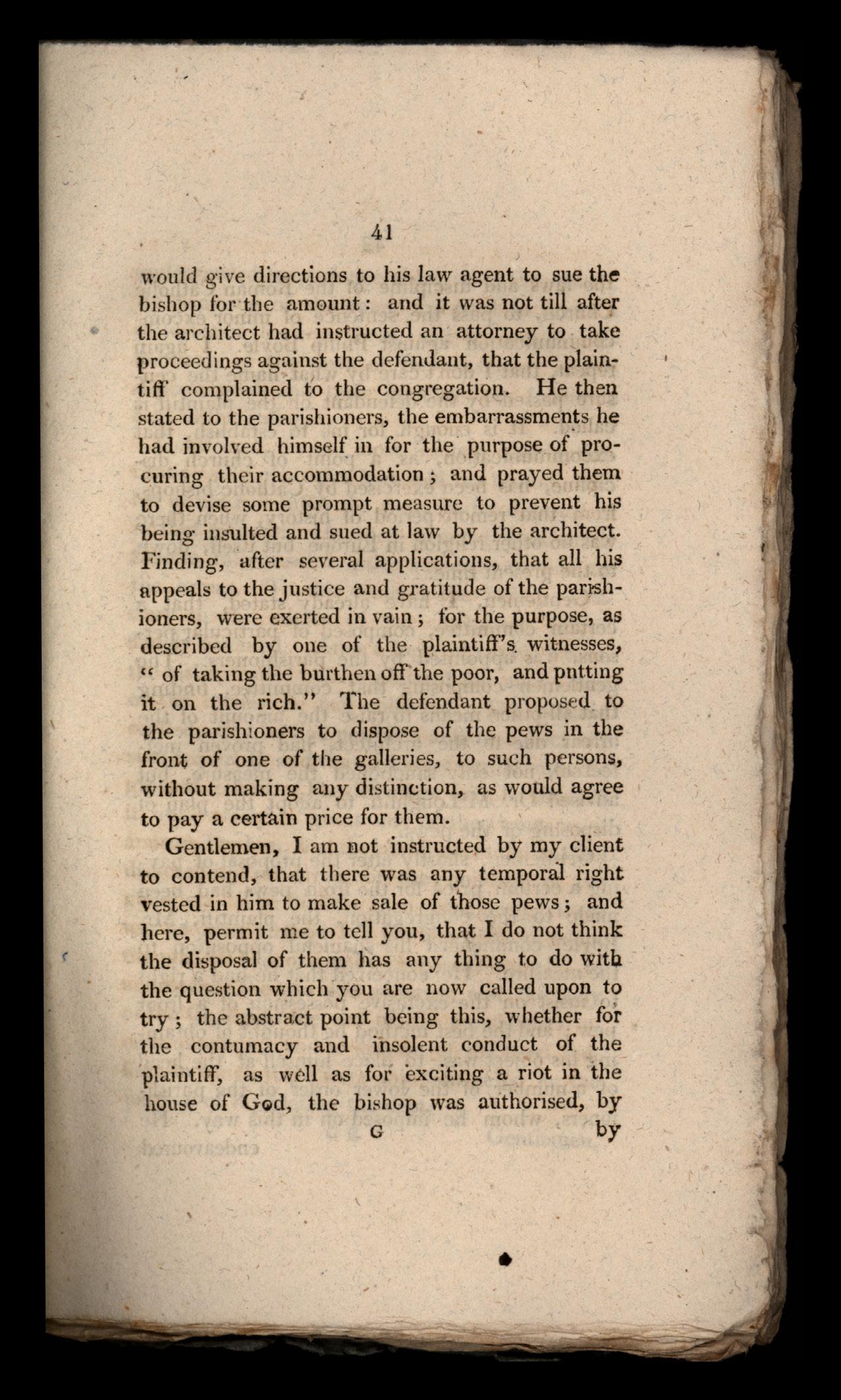
wo uld give directions to his law agent to sue the bi shop for th e amount: and it was not till after • the architec t had instructed an attorney to take proceedin gs a g ainst the d efendant, that the plaintiff co mplain ed to th e congregation. He then stated to the pari s hi on ers, the embarrassm en~s he had involved himself in for th e purpose of proc uring th e ir ac commodati on; an<l prayed them to d evise some prompt meas ure t o prevent his b e in g insulted and su ed at law by the architect Finding, after several application s, th a t all his appeal s to the justi ce and gr a titud e of the paris hioners, we re exerted in vain ; for th e purpose, as d escribed by on e of th e plaintiff's. witnesses, " of taking the burthen off the poor, and pntting it on th e rich." Th e d efend ant p ropose d to the pari sh ioners to dispose of the pews in the front of one of the gall eri es, t o su ch p ersons, without making any di stinction, a s would agree to p ay a certain price for th em.
G entlemen, I a m not instructed by my client to contend, th at there was any temporal right ves t ed in him to make sale of those pews ; and h ere, p ermit me to t ell you, that I do not think the dis posal of t hem h as any thin g to do with the question which y ou are now c alled upon to try ; th e abstr a ct point being thi s, whether for th e c ontumacy and in sol ent condu ct of th e plaintiff, as wtll as fol' exciting a riot in th e ho us e of GQd , the bi i- hop was authori se d, by G by
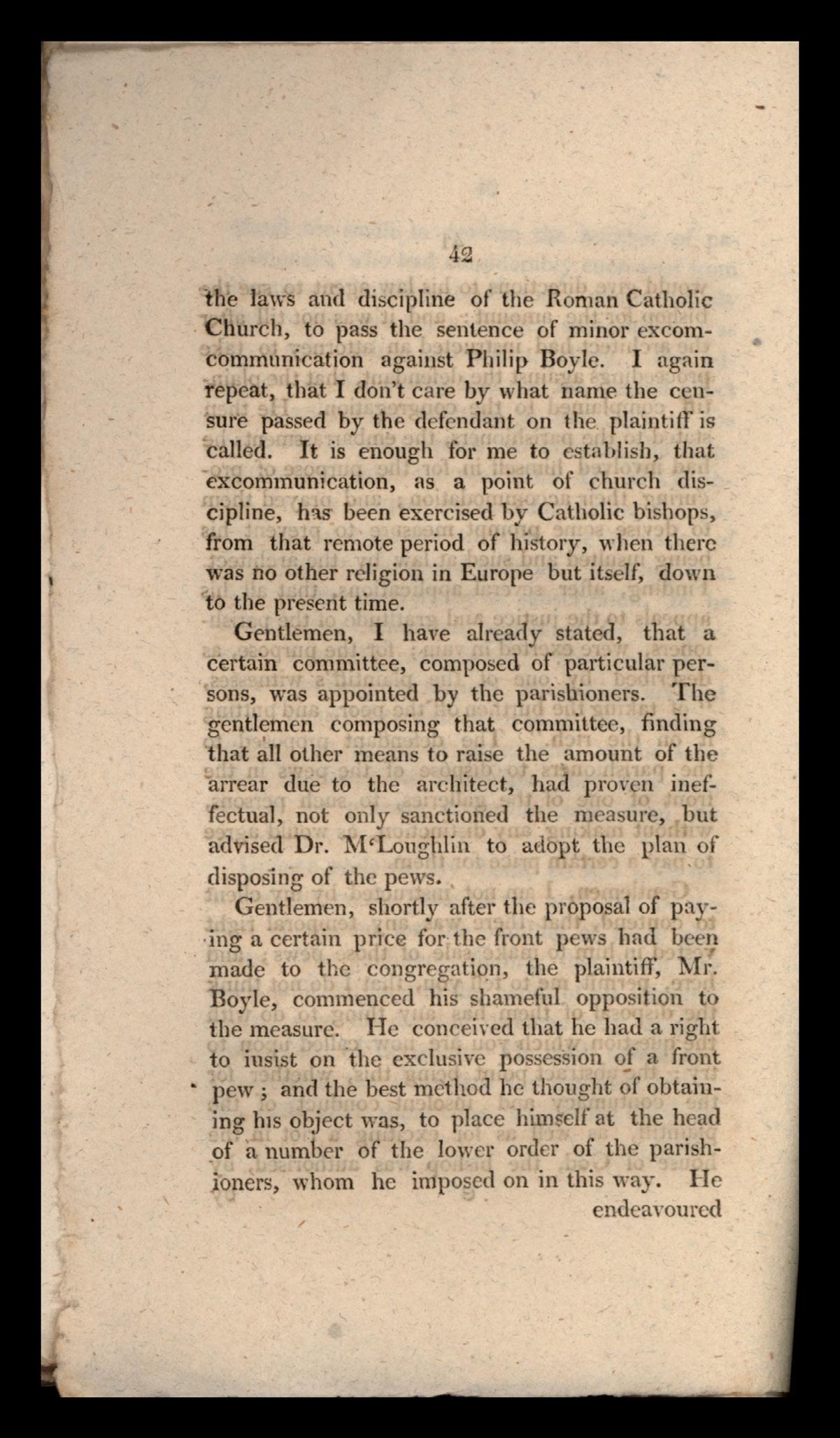
the laws and di scipline of th e Roman Cathol ic Church, to pass the senten ce of minor ex comcommunication agaiust Philip Boyle. I aga in repeat, that I don't c a re by what uame the censure passed by the dcfcnclant on the plaintiff is called. It is enough for me to es tabli sh, that excommunication, as a point of churc h di scipline, h'\S' been ex erc ised b y Catholic bi shop s, from that remote p eriod of hi st ory, wh e n there was no oth er religion in Europe but itself, d own to the present time .
Gentlemen, I have alread y st ated , th at a. certain committee, compo sed of particular p ersons, was appointed by the pari shion ers. The g entlemen c ompos ing that committee , finding that all other m eans to raise th e amou n t of th e arrear du e to th e arc hitect, h ad pro ven in e ffec tu al, n ot only sanc t ion ed the meas ure, bu t ad vised Dr. }.['Lou ghl in to a <lop t th e pla n of di sposin g of t he p ews.
G entlem en, sh ortl y a fte r th e proposal of p ayi ng a certai n p rice for the front p e ws h ad been made t o t he cong rega ti on , th e pl a intiff, 1'-Ir.
B oyle , comme n ced h is shame ful op posi t ion t o th e m eas ure . H e concei\-cd that h e h ad a ri g h t to in sist on th e excl usive p ossession oJ a fr ont • p ew; and th e b est m cthoJ. h e th ou g h t o f obt aining hi s obj ec t was, t o pl ace h imself at t he h ead of a number o f th e l owe r order of the p ar ishion ers, wh om h e imp osctl on in th is w ay. He cn dcaYourcd
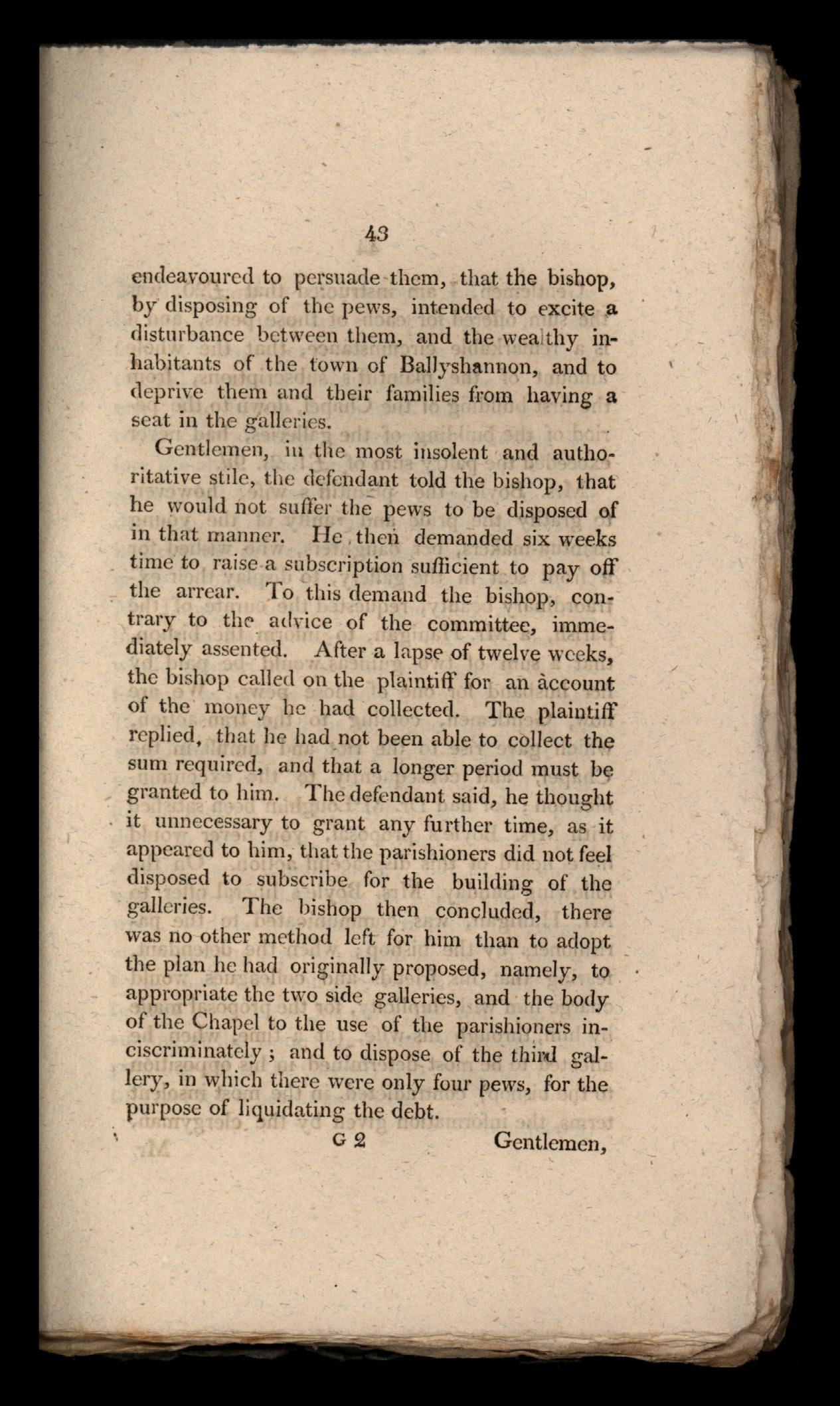
endeavoured to persuade them, that the bishop, by di sposi n g o f th e p e ws, intcndC'd to excite a ,li st nrbanc e between them, and the wea thy inh abi tants o f the town of Ballyslurnnon, and to <l cpri, e them and th e ir families from having a scat in the gall<'rics.
G e ntl e me n, iu th e most insolent and authoritative stile, th e <le.fondant told the bishop, that h e would not snOcr the p e ws to be disposed of in that manner. IIc th c1i demanded six weeks time to rai se a s ubsc ription sufficient to pay off the arrcar. To this d emand the bishop, contrary to th(' ath-ice of the committee, immediately assented. After a la pse of twelve weeks, the bi shop call e<l on the plaintiff for an account of the m on ey he had collected. The plaintiff rep li ed , that h e had not been able to collect the sum r equired, and that a longer perioc.l must be granted to him. The de fendant said, he thought it unn ecessary to grant any further time, as it appeared to him, th at th e pari shioners did not feel di spose d to subscribe for the building of the galle ries. The bishop then concluded, there was no other method left for him than to adopt th e plan h e had originally proposed, namely, to appropriate th e t\\·o side galleries, and the body of th e Chapel to the use of the parishioners inciscriminatcly ; and to dispose of the third gallery, in which there were only four pews, for the purpose of liquidating the debt.
G !.? Gentlemen,
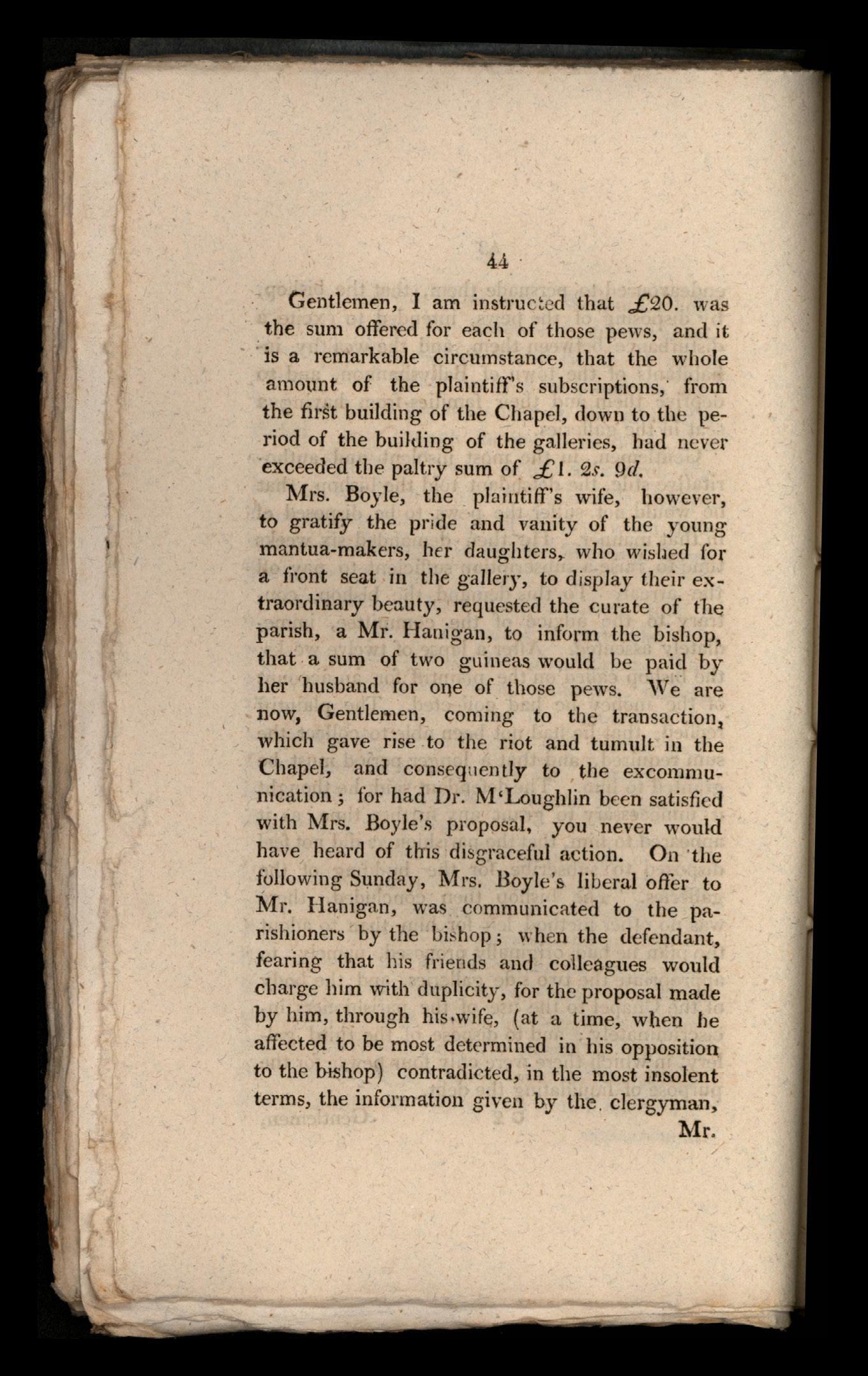
Gentlemen, I am instruc~cd that £20. " ·as the sum offered for each of those pews, and it is a remarkable circumstance, that the whole amount of the plaintiff's subscriptions,' from the first building of the Chapel, down to the period of the buil<ling of the galleries, had never exceeded the paltry sum of £I. 2s. 9d.
Mrs. Boyle, the plaintiff's wife, however, to gratify the pride and vanity of the young mantua-makers, her daughters,. who wished for a front scat in the g·allery, to display their extraor<linary beauty, requested the curate of the parish, a Mr. Hanigan, to inform the bishop, that a sum of two guineas would be paid by her husband for 011e of those pews. ,ve are now, Gentlemen, coming to the transaction, which gave rise to the riot and tumult in the Chapel, and conseqnently to the excommunication; for had Dr. M •Loughlin been satisfied with Mrs. Boyle's proposal, you never would have heard of this di!>graceful action. On ·the following Sunday, Mrs. Boyle's liucral offer to Mr. Hanigan, was communicated to the parishioners by the bi:-hop ; "hen the defendant, fearing that his friends and colleagues would charge him with duplicity, for the proposal made by him, through his,wife, (at a time, when J1e affected to be most determined in his opposition to the b-ishop) contradicted, in the most insolent terms, the information given by the . clergyman, Mr.

1\fr. Haniga n, to the bishop ; and denied that he had ever made any such proposal. The defendant's improper conduct, on this occasion, excited a general murmur, among the parishioners. The bi:,hop admonished him for thus directly contradicting a clergyman, standing before the altar, and conjured him, by every thing :.acred, not to di :sturl, the congregation in their devotion. This gentle admonition of the bishop's had not the desired effect: the plaintiff persisted in his insolence. 1le said that th e assertions of J\1r. I Ianigan were untrue; and then, addressing l1imself to his colleagues, he d eclared, that he would support the parishioners against the defendant, as long as he had a button on his coat. Ile then concluded his harangue, by giving the signal for a riot, in these words-" Now let the parishioners of Kilbarren come forth, and speak for thcmsclves."-~fr. Boyle's party were obedirnt to the signal, and a mo!'t alarming riot, shouting and tumult arose; but the plaintiff, well knowing what was to follow this watch word, had the low cunning, to leave the Chapel, and supposing a person whom he met in his retreat, (and who v,ill give evidence of the fact) to have been one of ~his party, he told him (assuming at the same time an air of triumph, and pointing out to the Chapel) that " he (the plain- iiff) had left a hot house there."
G en tlemen,
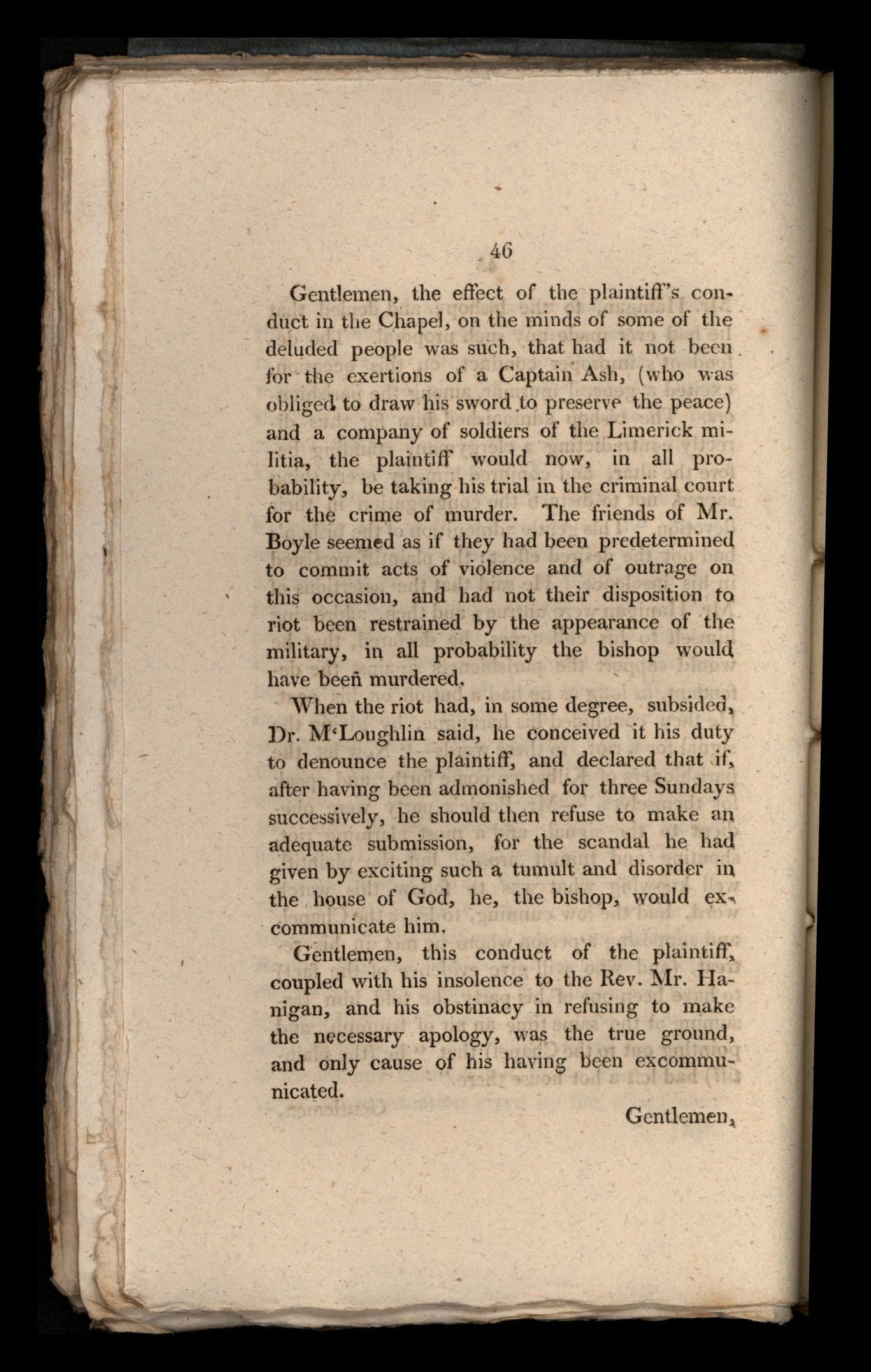
Gentlemen, the effect of the plaintiff's c onduct in the Chapel, on the minds of some of the deluded people was such, that had it not been . for the exertions of a Captain A sh, (who ·was obliged to draw his sword .to preserv<" the peace ) and a company of soldiers of the Limerick militia, the plaintiff would now, in all probability, be taking his trial in the criminal court for the crime of murder. The friends of Mr. Boyle seemed as if they had been predetermined to commit acts of violence and of outrage on this occasion, and had not their disposition to riot been restrained by the appearance of the military, in all probability the bishop would have been murdered.
,Vhen the riot had, in some degree, subsid ed, Dr. M•Longhlin said, he conceived it his duty to denounce the plaintiff, and declared that it: after having been admonished for three Sundays successively, he should then refuse to make an adequate submission, for the scandal he had given by exciting such a tumult and disorder i1\ the house of God, he, the bishop, would ex ... communicate him.
Gentlemen, this conduct of the plaintiff~ coupled with his insolence to the Rev. :Mr. Hanigan, and his obstinacy in refusing to make the necessary apology, was the true ground, and only cause of his having been excommunicated.
Gentl emen .\
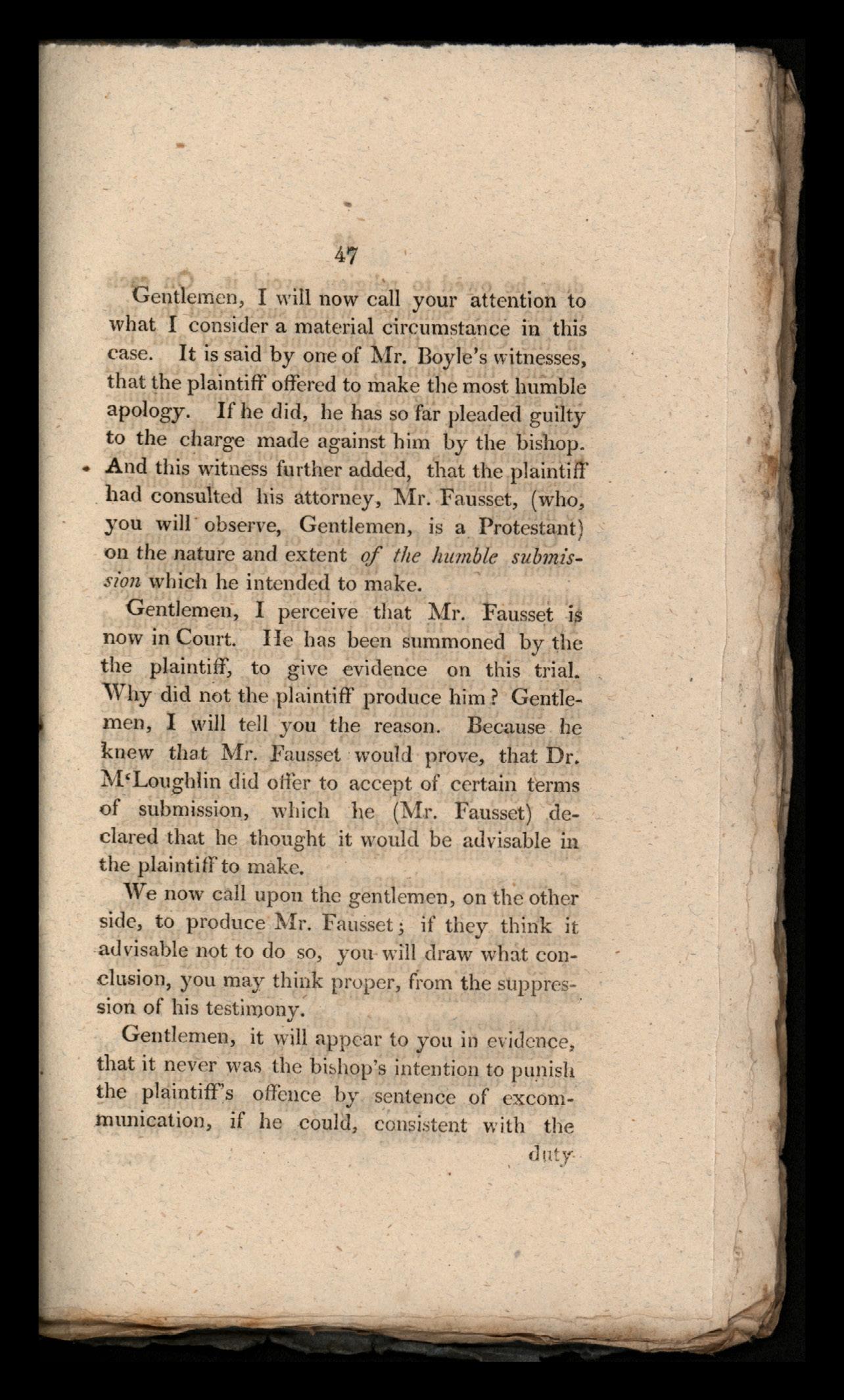
Gentlemen, I will now call your attention to what I consider a material circumstance in this case. It is said by one of l\fr. Boyle's witnesses, that the plaintiff offered to make the most humble apology. If he did, he has so far pleaded guilty to the charge made against him by the bishop.
• And this witness further added, that the plaintiff l1ad consulted his attorney, l\fr. Fausset, (who, you will obser\'e, Gentlemen, is a Protestant ) on the nature and extent of the humble submissio11 which he intended to m ake.
Gentlemen, I perceive that :Mr. Fausset is now in Comt. Ilc has been summoned by the the plaintiff, to give evidence on this trial. ,vhy did not the plaintiff produce him? Gentlemen, I will tell you the reason. Because he knew that :M r. J?aussct woul<l prove, that Dr. 1,1'Loughlin d,cl offor to accept of crrtain terms of submission, which he (1Ir. Faussrt) declared that he thou ght it ·would be a<lvisable in the plaintiff to make.
,ve now call upon the ge ntlemen, on thr other side, to produce 1fr. Fausset; if they think it acl visable n ot to do so, yon-·will draw what conclusion, you may think proper, fi·om the ::;upprr-sion of his te stirnony.
•
Gentl, •men, it "ill app ear to you in c, id cnce, that it n c v<'r ·was th e bi !:> hop's intention to punish the plaintiff's oflcnce hy sen tence of excommunication, if h e coul<l, consistent v. ith th e dn~.Y
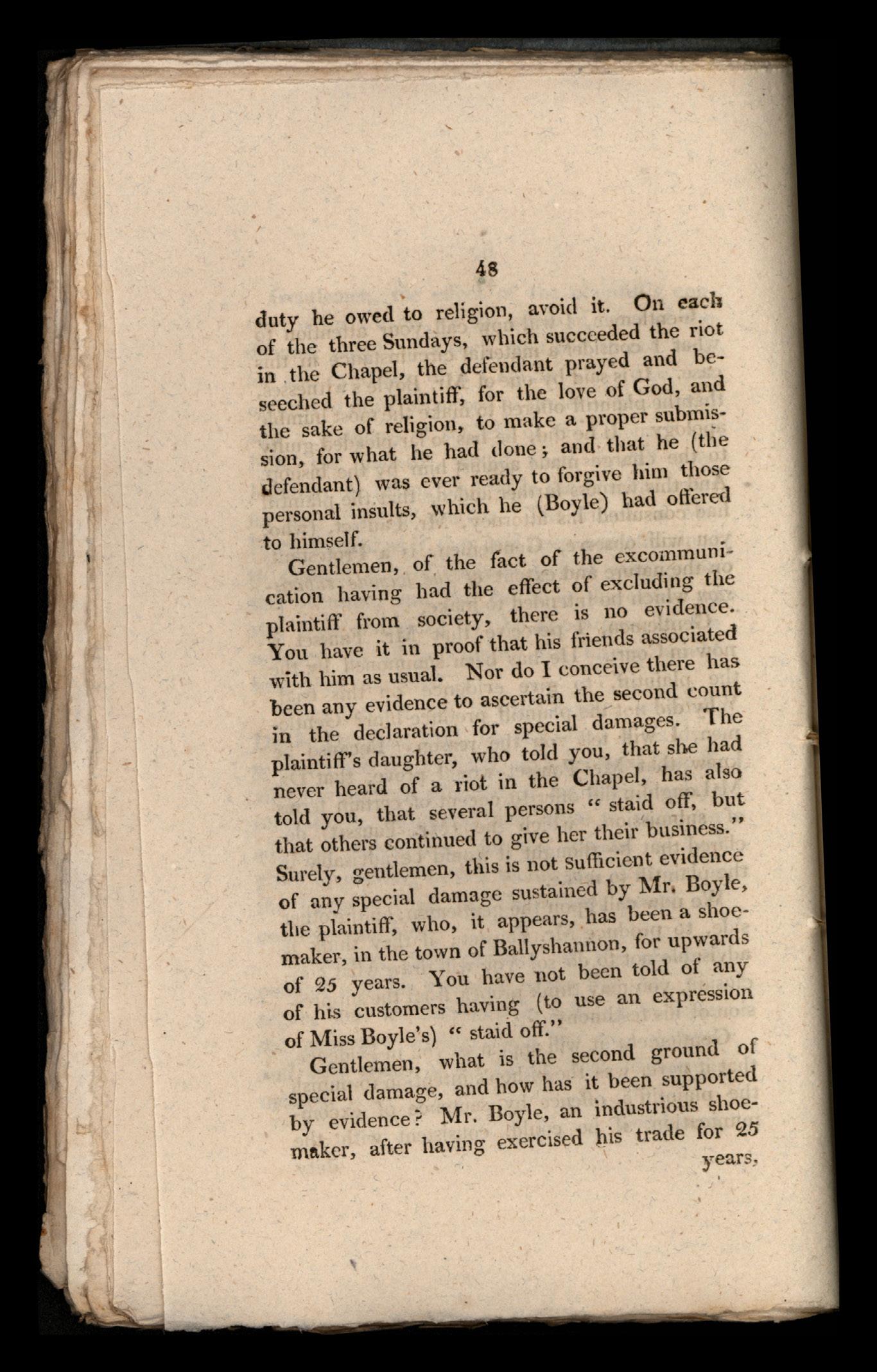
duty he owed to religion, avoid it. On eacb of the three Sundays, which succeeded the riot in the Chapel, the defendant prayed and beseeched the plaintiff, for the lov e of God, and the sake of religion, to make a proper submission, for what he had done; and that he (tlie defendant) was ever ready to forgive him those personal insults, which he (Boyle) had offered to himself.
Gentlemen, of the (act of the excommunication having had the effect of excluding the plaintiff from society, there is no evidence. You have it in proof that his friends associated with him as usual. Nor do I conceive there has been any evidence to ascertain the second count in the dec1aration for special damages. The plaintiff's daughter, who told you, that she had never heard of a riot in the Chapel, has also told you, that several persons " staid off, but that others continued to give her their business."
Surely, gentlemen, this is not sufficient evidence of any special damage sustained by ~fr. Boyle, tl,e plaintiff, who, it appears, has been a shoemaker, in the town of Ballyshannon, for upwards of 25 years. You have not been told of any of his customers having (to use an expression of Miss Boyle's) " staid off."
Gentlemen, what is the second ground of special damage, and how has it been supported by evidence~ Mr. Doyle, an industrious shoemaker, after having exercised his trade for 25 years .

years, How scLks to recO\·er the sum of £1000 from the d efenclant, for a business " in nubi bus," which l,e ha<l 011ly iutenJcd to commence. And the evidence to sustain this <lamage is, that he had purchased a shop iu Ballyshannon, and int e nded to commence grocer, and, as a matter of cour:,P-, to make a fortune.
Gentl e m en, I will not insult your understandings, by making a single comment on tliis part of the case; for can any thi11g be more absurd, than to seek to n:co,,er damages to the amount of £1000. for an il1laginary loss, which ne\'cr had existence, but in " the mind's eye" of the shoemaker, who had it in contemplation to commence grocer. It is worthy of remark, that those persons, whose names are stated in the dedaratiou, and who are said to lrnve withdrawn their business, not from the industrious shoemak e r, uut from his indw,trious <laughters, the mantua-make rs; have not b een produced to give eri<lence of the fact, of having withdrawn th e ir custom from the ~Iiss Boyles, in consequ e nce of the excommunication by the defend- ant.
Gentlemen, like !\fr. Fau sset, those pe1·sons have been summoned hy the: pt1i11tiff to give evidence on this trial, and they arr now in court, waiting to IJe called on. Afte r h a ,·ing travellcJ from Ballyshannon, it is not found adviseaule to examine them, b ecau se, a s I am iu-
structcd
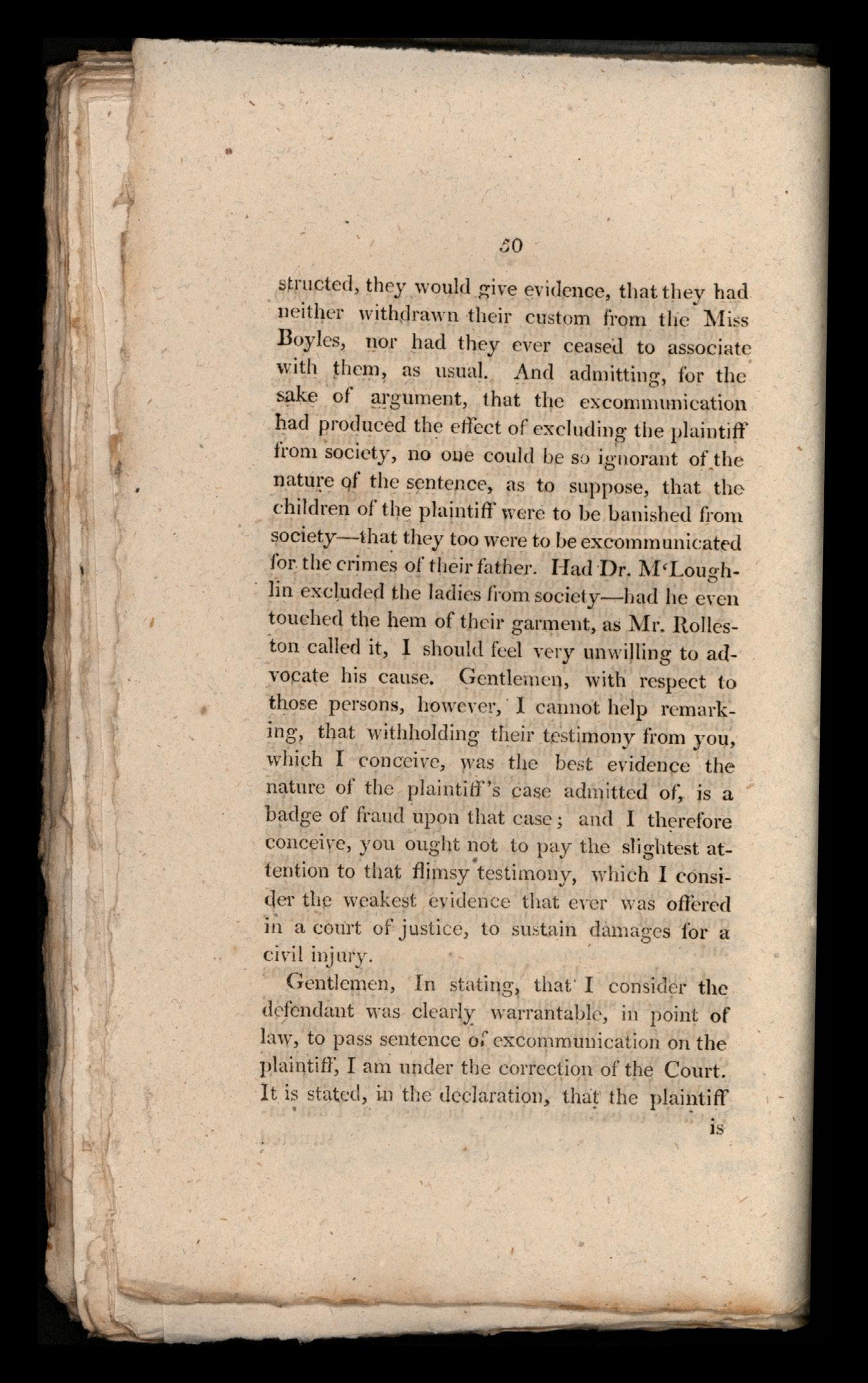
struclccl, thry woul<l give c, ·Hlencc, tlwt they ha<l ueithcr withclrawn their custom from the 11i~s Iloylcs, 11or had they eYer ceasetl to associat e ,rith them, as u sual. And admitting, for th e sake of arg ument, thut the excommunication had produced the clfrct of excluding the plaiutiff from society, no ou e could l> e so ignorant of th e nature qf th e sentence, as to suppose, that th e children of the plaintiff were to be banished from society-that they too were to be excommunicated for the crime~ of their father. Had Dr . 1\I'Lough• lin exdudcd the ladirs from society-had he c,·en touched the hem of their garmeut, as Mr. Rolles• ton called it, I should feel n:ry um, illing to ad• Yocate his cause. G cntle il1cn, ,vith respect to those p cr·ons, howcrC'r, I ca unot help rL-mark. ing, that ,rithholding th eir tc~timony from you, which I conccin', was the best e\'idcnce the nature of th e pl aint iff's casr admi tted of~ is a badge of fraud up o n that c ase; ancl I thrrcfore conecirc, you ought not to pay the sliglitcst at. tcution to that flim sy ·testimony, "·hich I consi. dcr th e weakest c , itlencc that c, er was oflcred in a court of justic.c, to sldain damages for a ci, il injnl)'·
Gentlem en, fn stating, that · I comi<lc r the dcfcn<laut was clearlY. warrautable, in poi nt of law, to pass sentence o:- excommunicatio11 Oil the plaint iff~ I am nuder the correction of the Court. I t is stat ed, iu the dcclaratiou, tha! the plai1_1tiff IS

1,; a Roman Catholic, an<l that the d efen dant is th e titular bi sho p of tlic <lioccs ' of Raph oe. ( H t' rc Mr JOHN STON was intcrrnptc <l by th e J ndgt', " ·bo said, '' Th at on no occ,tsion w hat« eye r, h a d a R oman Catholic hishop a lega l « tight to pu!1ish any of hi s parishio11ers by scn" tC'ncc of cxcoamrnuic atio n. H e furth e r sai<l, " th at he could not li c lp repea tin g, that fh e " exerc ise of sncli an authority, by the defcn<l" anl, was an assumption of power, contra,~y to ' 1 Jaw; and an w,urpation of tl1e ri g hts of th e "bishops of the e$tab li shed c hurc h.") :Mr. Jou;-;sToN", in r eply t o th e Court, obseri-ed, that the plaintiff's eon<lnct in the chape1, wh e re h e in sulte d a. cl c r gy1mm, in the act of doing his duty ;-his haring afterwards C'xcited a riot and tu m ult amon g the cot1gregation, coupled witli his several d e claratious, a11cl with persisting i11 a. refw.al, for three Sundays s u ccessively, to make the necessa ry s ubmi ss io ns, wa s sufficient grounct. in his mind, to ,instify the Lis!top, in p o int of law, to exerc ise that authority, which he bad always known, an1l co nc e ive d to be th ~ dis ci pline of his churc h. If the Plaintiff found him self in.iurccl, li e might ham appC'aled to the Primate. I t was not pretended, or re li e d on, th at the excommunication , pron ounced by Dr. i\l'Lougl1lin, luL<l th-c same cflcct of imposing di sabiliti es , on the plaintiff, a.s th e sente n ce of excommunication iii tho estab li sh e d church. In the one cas e, th e re
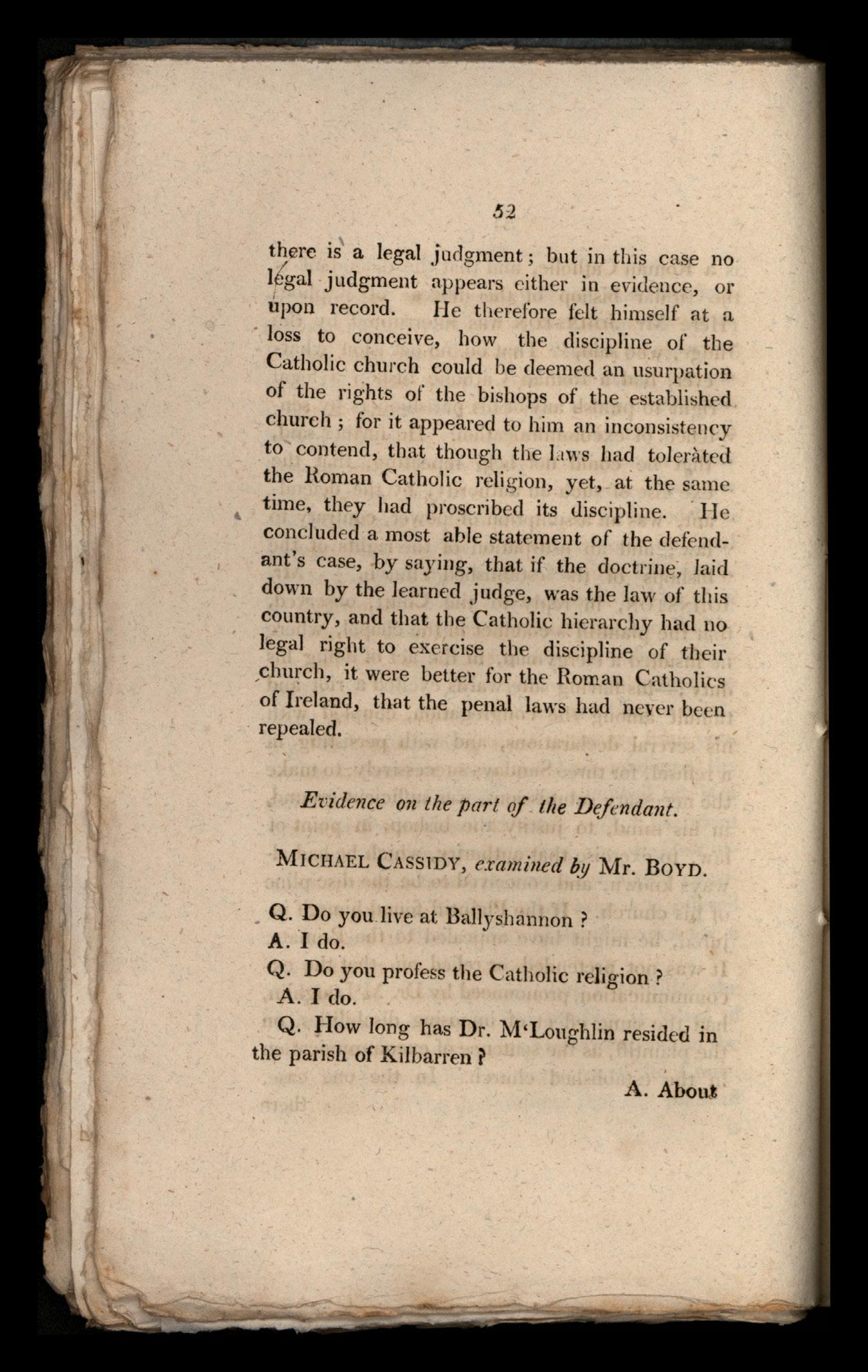
5:2
thf.!rC is a legal juclgment; but in this case no 1/igal judgment appears either in evidence, or upon record. Uc th<'refore felt himself at a loss to conceive, how the discipline of the Catholic church could be deemed an usurpation of the rights of the bishops of the e!)tablishcd church ; for it appeared to him an inconsiste11cy to contend, that though the I.ms had tolcrAtc<l the Homan Catholic religion, yet, at the same time, they had proscribed its <liscipline. I le conclud<'d a most able statc-ment of the defendant's case, by sayi11g, that if the doctriue, Ja.id down by the learned jurlge, was the Jaw of tl1is country, and that the Catholic hierarchy had 110 legal right to exercise the discipline of their church, it were better for the Roman Catholics of Ireland, that the penal laws had never been repealed.
El'idence 01z the pnrt of tl,e Defendant.
MICHAEL CASSlDY, e:r:amined ~y Mr. BOYD.
Q. Do you live at llallyshan11on ?
A. I do.
Q. Do you profe!,s the Catholic rcligion ?
A. I do.
Q. How long has Dr. M•Loughlin resided in the parish of Kilbarren ?
A. Abottt
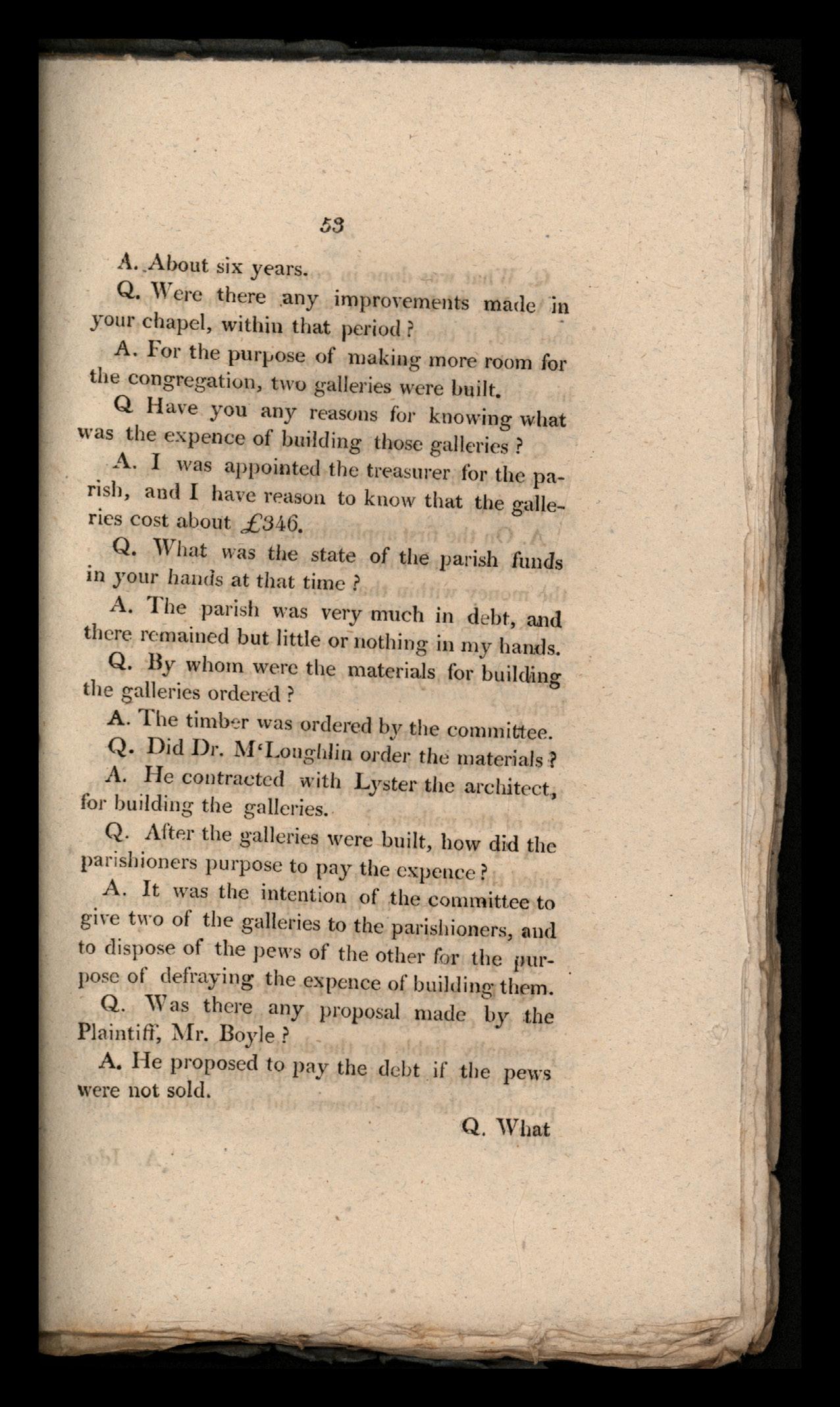
A. About six years.
Q. Were there any improYements macle in your chapel, within that period ?
A. For the puri-,osc of making more room for the congregation, two galleries were Luilt.
Q Ha\·e you any reasons for kno-..ving what was the expencc of building those galleries?
A. I was appointed the treasurer for the pa- rish, and I ha\ e rPason to know that the galle- ries cost about £3 i6.
Q. ,viwt was the state of the parish funds in your hauds at that time ?
A. The pari~h was very much in d ebt, and there remained but little or 11othing in my hands.
Q. lly whom were tl1e materials for building the galleries ordered ?
A. The timb'.: r was ordered by the committec>.
Q. Did Dr. M•Longl1li11 order the materials?
A. He contracted with Lyster the architect, for building the gnllcries.
Q. AftP.r the galleries were built, how did the par ishioners purpose to pay the cxp<'nce?
A. It was the intention of the committee to gi\·e hrn of the galleries to the parishioners, and to dispose of the pews of the other fo r the pur- pose of defraying the ex pence of building them.
Q. Was there any proposal made by the Plaintifi: 1fr. Boyle ?
A. He proposed to pny the de bt if the pewi, were not sold.

Q. "·hat was done in conseq11encc of th.i't ?
A . Dr. it•Longhlin agrcecl lo the proposal, and said, if the parishioners pai<l ti1e <le-Lt, th ey ~llOnhl have th,e en tire u se of th<'m, ns it wa s not his "ish that th=-y sho nltl be <fo,poscd of in any other way .
Q. \\' as th ere nny time given to {he parish ioners to collect, from among themseh cs, th e amou11t , of the dcl.,t ?
A. On the first application, the Dr. gave them 11ine wcch , a111l finding that th <'y could not raise the money within that time, he gave them three weeks longer.
Q . After the cxpiratioh of twclrc wcc-ks, wh at ~um of money did you rec-ci\·e from th e collcctorc;?
A. Not one farthing at alf.
Q. Ilave you any J'cason to know that Boy l ~, the plaintiff offered any mon ey for a front scat in one of the galkrics ?
A. I know that he offered t"o guineas, provided the parish a.grcNl to it.
Q. Were you in the chapel of Ballyshnnnon, on the fir·t Sunday of last Lent ?
A. I was.
Q. Do you recollect Dr. :\['Loughlin ncklrcs~ sing the <.:ongrcgation on the su~j cct of !;is being person n.Hy liabl e for the debt to the contractor, an<l on the nccrssity of di sposing of the p <:!,,•s, provide d the parishioners did nol di sc harge the arrcar .
A. ld o .
,5[,
A. I do. When 1-[r. Bork got up, and said, lie would not allow any pc\\ s in the chapel to be llispose<l of.
.

Q. Did Dr. ~{'Loughlin make auy reply?
A. After some co11vcJ·sation, he told Mr. 13oyle that if he di<l not desist, hi' must he under the ,uccessity of denouncing him.
Q.. ,Vhal follow<'d?
A. 'Mr. Boyle got up, and said " he would support the parishioners a:> long as he had n l>utto11 ou his coat."
Q. Di<l he say a.n.r thing more?
A. He then came forwar<l, aml turned round to the peOj)le, au<l said-'' I ha\C' spoken for the pari:,b: now let the parishio11C'rs come forward, aiul !>peak for thcmsclY~-
Q. "'hen he was makiug this speech, in what tc111pcr of mind did he app<•ar?
A. l le app~arc<l to me to be as full of yc1,om and ma\ice as anv man I c,·cr saw, Cl. Whal happened 11e::-...t?
'/'.. A great many of the p('Ople then gol up, ~in<l !--Otn<' of tlwm adrnnce<l towar<ls Dr. ~!•Loughlin, as if they were going to destroy him.
Q. In this situation what did Dr. 'M'Longhlin do?
A. IIc told th<'m that if they attempted to treat him improperly, lw would punish them most sever<'ly.
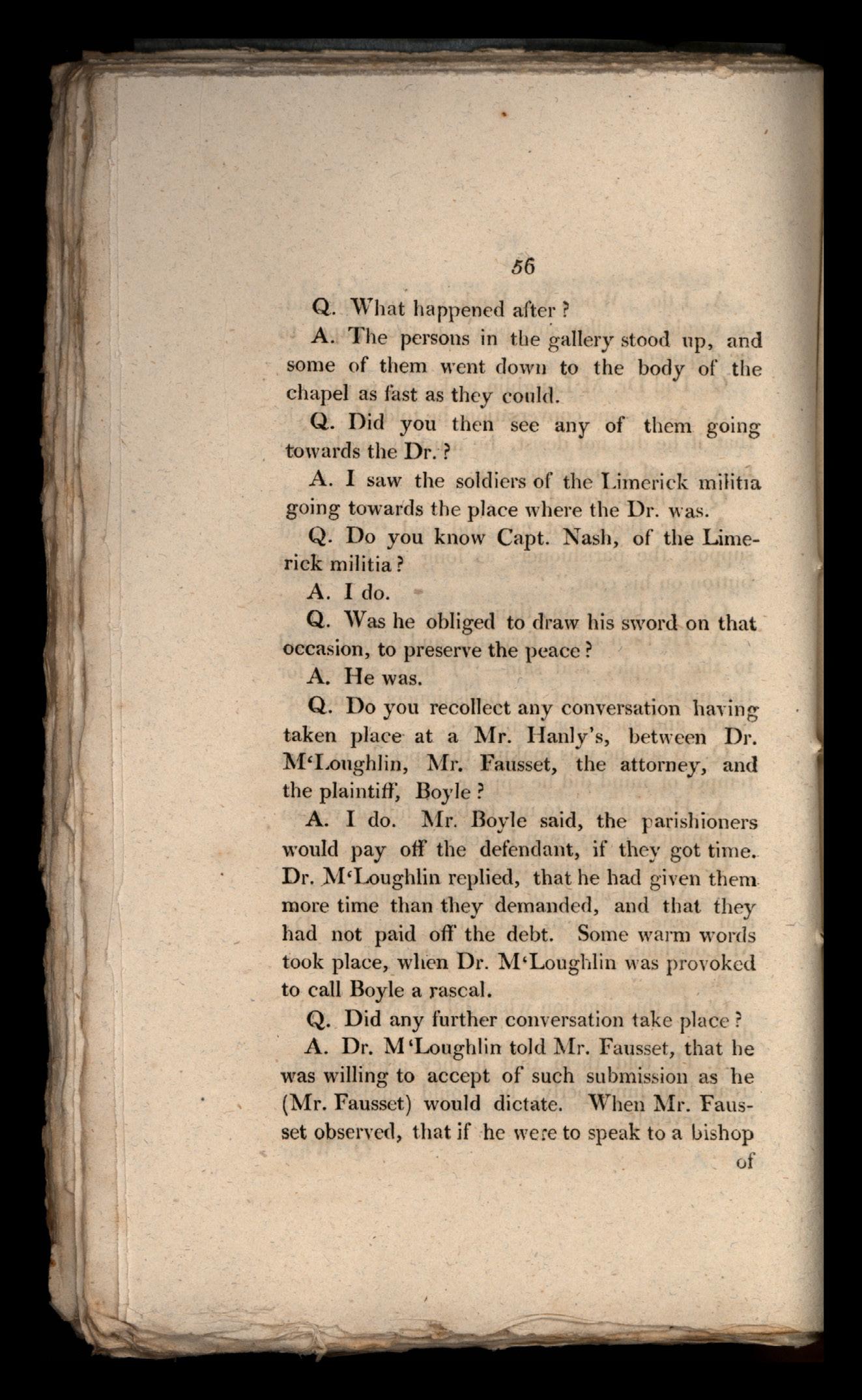
Q. "\Vhat happencd aftc~·?
A. The persons in tu e gallery stood up, and some of them went dow11 to the body of th e chapel as fast as they could.
Q. Did you th en sec any of th em going towards th e Dr. ?
A. I saw th e soldi cl's of th e Lim e rick militm going towards the place where th e Dr. was .
Q. Do you know Capt. Nash, of the Limerick militia?
A. I do.
Q. ,vas he obliged to draw hi s sword on that occasion, to preserve the peace?
A. He was.
Q. Do you recollect any conversation hayin g taken place at a Mr. IIanly's, betwcm Dr. ~{'Longhlin, Mr. Fausset, the attorney, and the plaintiff: Boyle ?
A. I do. :Mr. Boyle said, th e rarishion ers would pay off th e defendant, if they got tim e . Dr. ~{'Loughlin replied, that he had g iven them more time than th ey dema11d c<1, and that they had not paid off the d e bt. Some warm word s took place, wltcn Dr. l\1•Loughlin was provoked . to call Boyle a rascal.
Q. Did any furth er conv ersa tion tak e place ?
A. Dr. M 'Loughlin told :M r. Fau sset, th at he was willing to accept of such submis~iou as h e (Mr. Fausset) would di c tate. ,vh en l\Ir. Fau sset obserre<l, that if he were to speak to a bishop of

of his church in the manner that Boyle had spoken to Dr. M'Loughlin, he (the bishop) would order his footman to kick him out of the llouse.
Cross-examined by 1IR. ROLLESTON.
Q. Did you hear Boyle, on any occasion, offer to make a submission to Dr. M'Loughlin?
A. I heard him say, " If I have offended God or the church, I am sorry for it."
Q. Was that all the submission you heard him make?
A. It was.
Q. Did you hear the bishop make use of these words-" In the name of the Father, and of the Son, and of the Holy Ghost, I, Peter :M•Loughlin, titular bishop of the diocese of Raphoe, &c. &c. do excommunicate you, Philip Boyle, until you sign this paper."
A. I did.
Q. You are a Catholic-would you consider y0m.:;elf entitled, by the rules of your church, to associate with the plaintiff after the excommunication ?
A, I would not like it: but I have spoken to him several times since, and Boyle himself refused to speak to me.
Q. According to the tenets of -y<mr religion, by virtue of your oath, could you hold the same I • communiQn
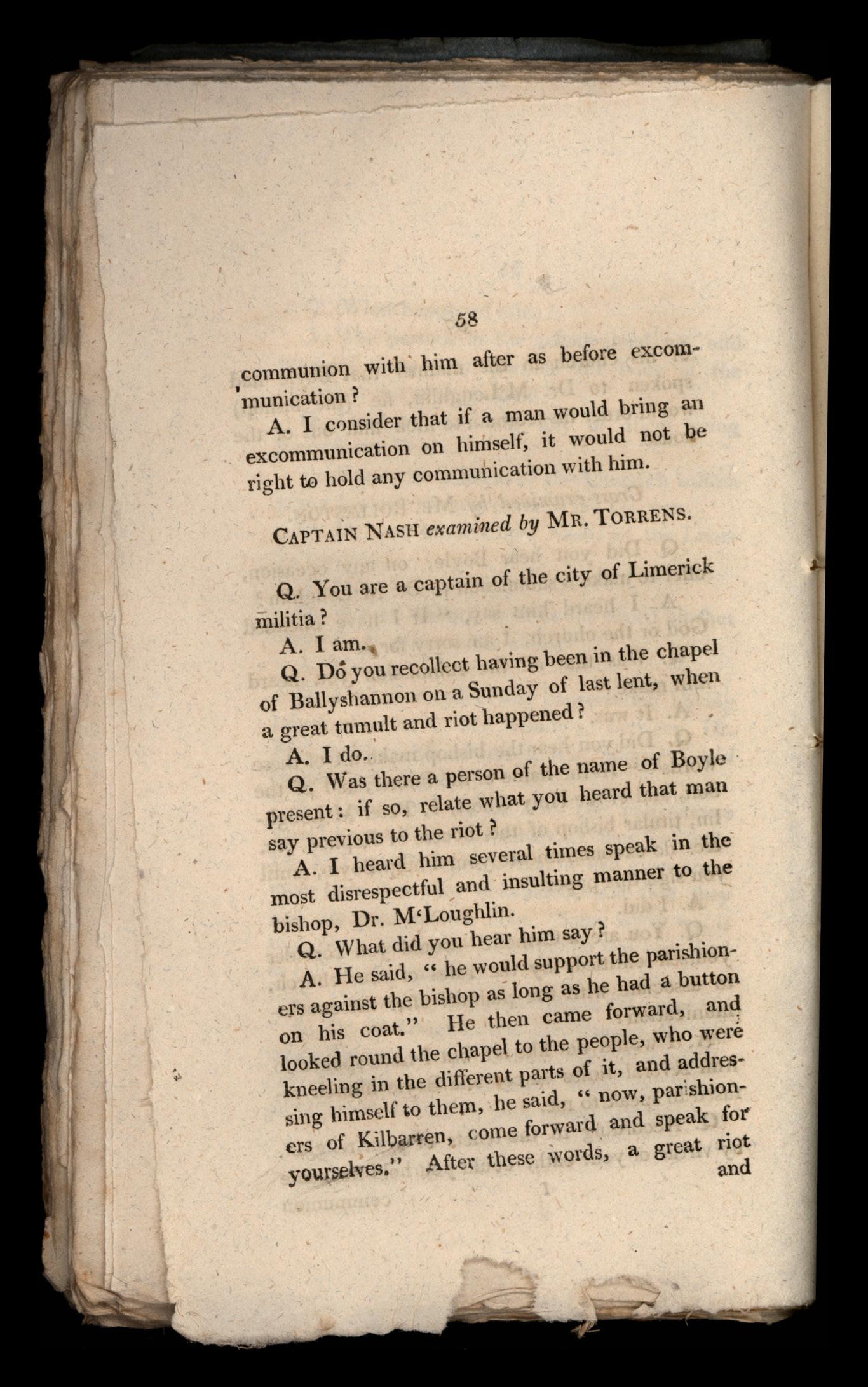
communion with him after as before excom' munication?
A. I CQnsidcr that if a man would bring an excommunication on himself, it would not be right to hold any communication with him.
CAPTAIN :TASH e.-<amined by MR. TORRENS,
Q.. You are a captain of the city of Limerick militia?
A. I am.
Q. Do you reco\kct having been in the chapel of Ballyshannon on a Sunday of last lent, when a great tumult and riot happened?
A. I do.
Q.. Was there a person of the name of Boyle present: if so, relate what you l1eard that man say previous to the riot ?
A. I heard him several times speak in the most disrespectful and insulting manner to the bishop, Dr. M'Loughlin.
Q. What did you hear him say?
A. He said, " he would support the pari!'hioncrs against the bishop as long as he bad a button on his coat." He then came forward, am~ looked round the chapel to the people, who were kneeling in the different parts of it, and addressing himself to thefl\, he said, " now, par'shioners of K.ilbarren, come forward and speak for yourselves.'' After these wo1·ds, a great riot and
and shocking noise arose from every part of the • chapel. The tumult and cries of the people were so shocking, that I could compare it to nothing that I ever heard but an Indian warwhoop.
Q. Did the people press forward towards Dr. 1'I•Lo11ghlin? •
A. They <lid; a1~d from their manner and violence, they appeared to me, as if they had formed the de::.ign of taking his life. I was very much alarmed for the bishop's safety, and I told him the fears I had entertained, and begged of him to retire from the chapel. He replied, '' They will not, I am persuaded, attempt to hurt . me. God help and forgive the poor deludr<l people, they know not what they are doing."
Q ,vhat was ~fr. Boyle doing during this time? Did he not take an aclire part?
A. lie did. llc clenched his fo.t, and shook it in a menacing manner at the place where the Dr. wai-.
Q. How soon after Boyle had addressed the parishioners, did the riot commence?
A. Immediately afterwards; and had not a number of the soldiers of our regiment been present, I certainly think that the mob would have taken the bishop's life?
Q. What did you do upon that occasion?
I 2

A. I went
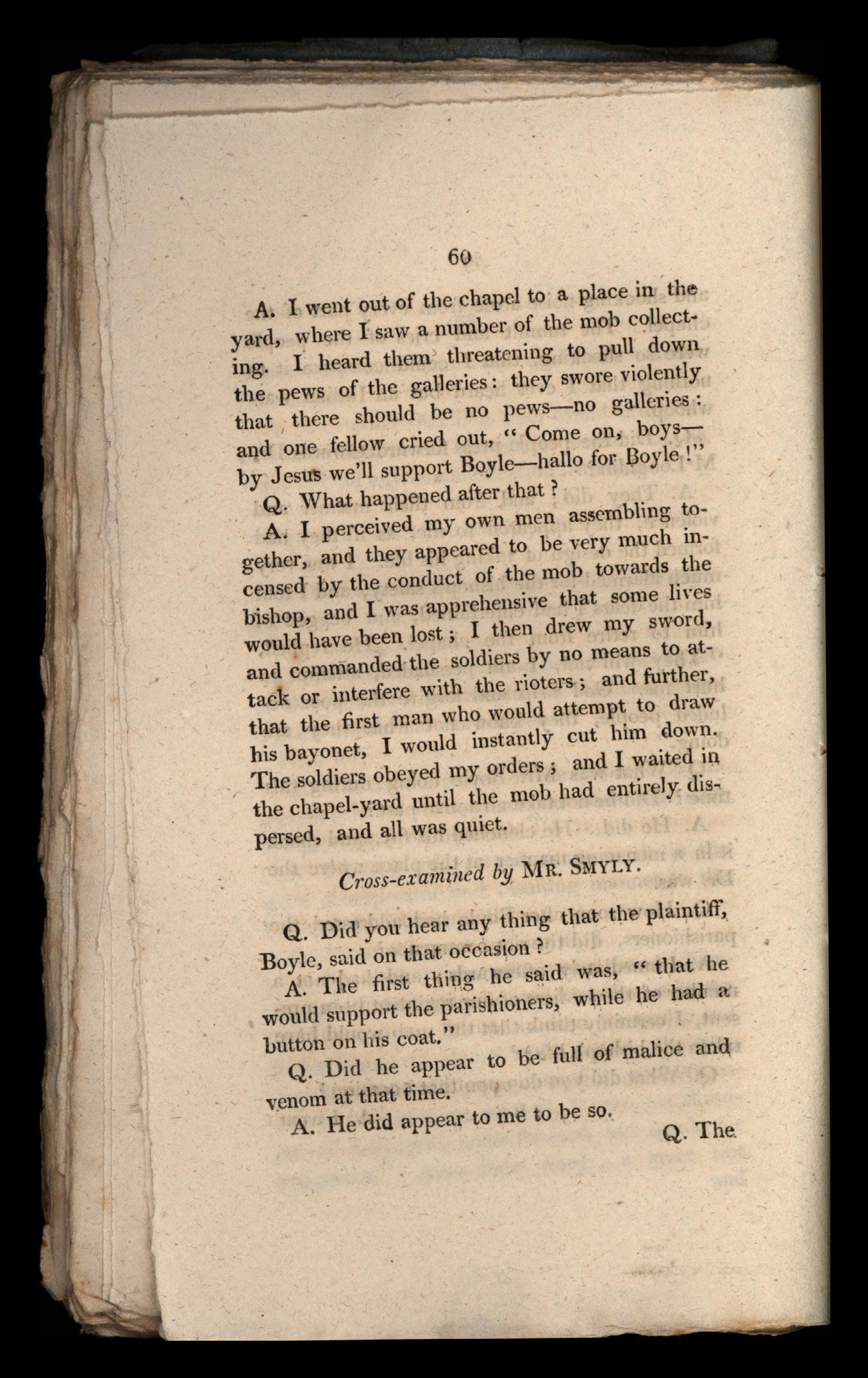
A. I went out of the chapel to a. place in the yard, where I saw a number of the mob collecting. I heard them threatening to pull down the pews of the galleries: they swore violently that there should be no pews-no galleries : and one fdlo,v cried out, " Come on, boysby Jes~ we'll support Boyle-hallo for Boyle!"
Q. ,vhat happened after that ?
A. I perceived my own men assembling together, and they appeared to be yery much incensed by the conduct of the mob towards the bishop, and I was apprehensiYe that some li,·cs would have been lost; I then drew my sword, and commanded the soldiers by no means to attack or interfere with the rioters; and further, that the first man who would attempt to draw his bayonet, I would instantly cut him down. The soldiers obeyed my orders ; and I waited in the chapel-yard until the mob had entirely dispersed, and all was quiet.
Cross-examined by :\IR. SMYLY.
Q. Did you bear any thing that the plaintiff, "Boyle, said on that occasion ?
A. The first thing he said was, " that he would support the parishioners, while he had a button on his coat."
Q. Did he appear to be full of malice and ,•enoro at that time.
A. He did appear to me to be so. Q. The.
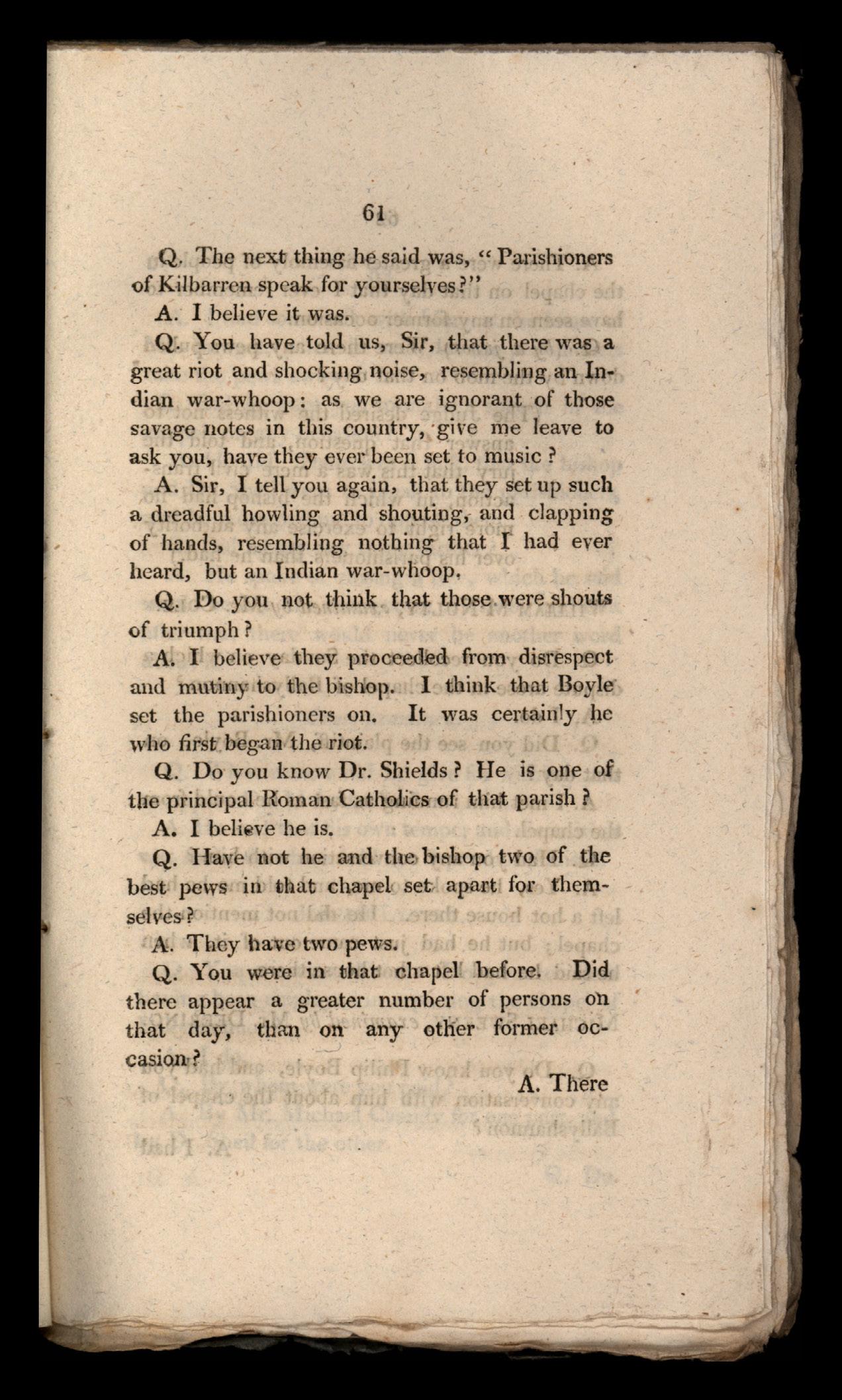
Q. The next thing he said was, " Parishioners of Kilbarrcn speak for yourselves?"
A. I believe it was.
Q. You have told us, Sir, that there was a great riot and shocking noise, rcscmbliug an Indian war-whoop: as we are ignorant of those savage notes in this country, gire me leave to ask you, have they ever been set to music ?
A. Sir, I tell you again, that they set up such a dreadful howling and shouting, and clapping of hands, resembling nothing that I had ever heard, but an Indian war-whoop.
Q. Do you not think that those were shouts of triumph?
A. I believe they proceeded from disrespect and mutiny to the bishop. I think that Boyle set the parishioners on. It was certainly he who first bcg.:m the riot.
Q. Do you know Dr. Shields? He is one of the principal Homan Catholics of that parish?
A. I beli ve he is.
Q. Have not he and the bishop two of the best pews in that chapel set apart for themselves?
A. They have two pews.
Q. You were in that chapel before. Did there appear a. greater number of persons oh that day, than on any other former occasiQJl?
A. There

A. There were a greater assembly of people io the chapel on that day that I ever remember to have seen on any former occasion.
Q. (by a juror) "rere there any pews pulled down by the mob on tbat day ?
(The Judge desired the wit0ess not to answer that question, and told the jury that thi~ was a mere cid transaction, in which the bishop bad no more right to exercise any au hority over his parishioners than he had,)
"~ll.LL\M ).{• :ruLTY, examined by 'Mr. COLE
Q. Do you recollect the Sunday on which a dispute arose in the chapel of BaUyshannon?
A. I do.
Q. Did you see the plaintiff, ·Mr. Boyle, on that day? ,
A. I met him running as fast as l:e could fron, theQ.chapel. Had you any comcrsation with him ?
A. Yes, he spoke to me, and told me he had left a. hot house there. He did not mention the chapel; but he had just came out of it,. ~hen he said he had left a bot ho.use there,
}.hCHAEL SWEENY,. examined by :Ur. DEERING.
Q. Do you know Philip Boyle, and had you any conversation with him about the chapel of Ballysl1annon?
A. l had

A. I ha<l some talk with him, at tltc house of ~fr. Bridges, when he said, let the parishioners take the pews away.
Q. Did he want you to make a speech in the chape), on any occasion ?
A. He did. There was a talk, that t~e Li:i;hop and Dr. Sheil were to speak to the parishioners, and he requested me to oppose tl1 cm.
Q. Did he say any thing further?
A. He spoke of raising a row, which he said would be like the convention of Paris, and that after that there woHld naver be another word about it.
Cross-c2·amh1ed.
Q. ,vhat reason did he g ive for wishing you to oppose Dr. M•Loughlin ?
A . He said that his own temper and di sposition was sucb, that he woul<l not depend on himself.
JOSEPH LY ST E R.
Q. You are an .archit ect. Do you recollect l1aving been employld i n .repairing tl1e cl1apel of Bally shannon ?
A. I do.
_ Q. By whom were you pai<l?
A. By 1\Ir. Michael Cassidy for on e p a rt, and by Dr . Sheil for the othe r.
Q . Do

Q. Do you remember applying, at any time, to Dr. }\!<Loughlin for payment of your contract?
A. I made several applications, se,·eral times, to get my money. .
Q. Did you apply to Dr. :\I•I..oughlin?
A. I spoke to him to get me my money. ,..
Q. By virtue of your oath, did you not apply to an attorney, to take legal stc>ps against Dr. }.!'Loughlin, if he did not pay you ?
A. I did, if be would not pay me.
Dr. SHEIL, examined by }.!R. JOHNSTON.
- Q. You know the plaintiff and defendant in this action ?
A. I do.
Q. Do you recollect the building of the chapel of ijallyshannon ? " •
A. I do. It was built by public subscription.
Q. Do you recolleet the building of two gal-lcries?
A. I do.
Q. ,vas there a committee appointed by the parishioners, to superintend the work ?
A. There was a committee appointed, which continued to act for two or three months.
Q. From the time of Dr. MtLoughlin's succeeding to the parish, who managed the business of the galleries ?
A. Dr.
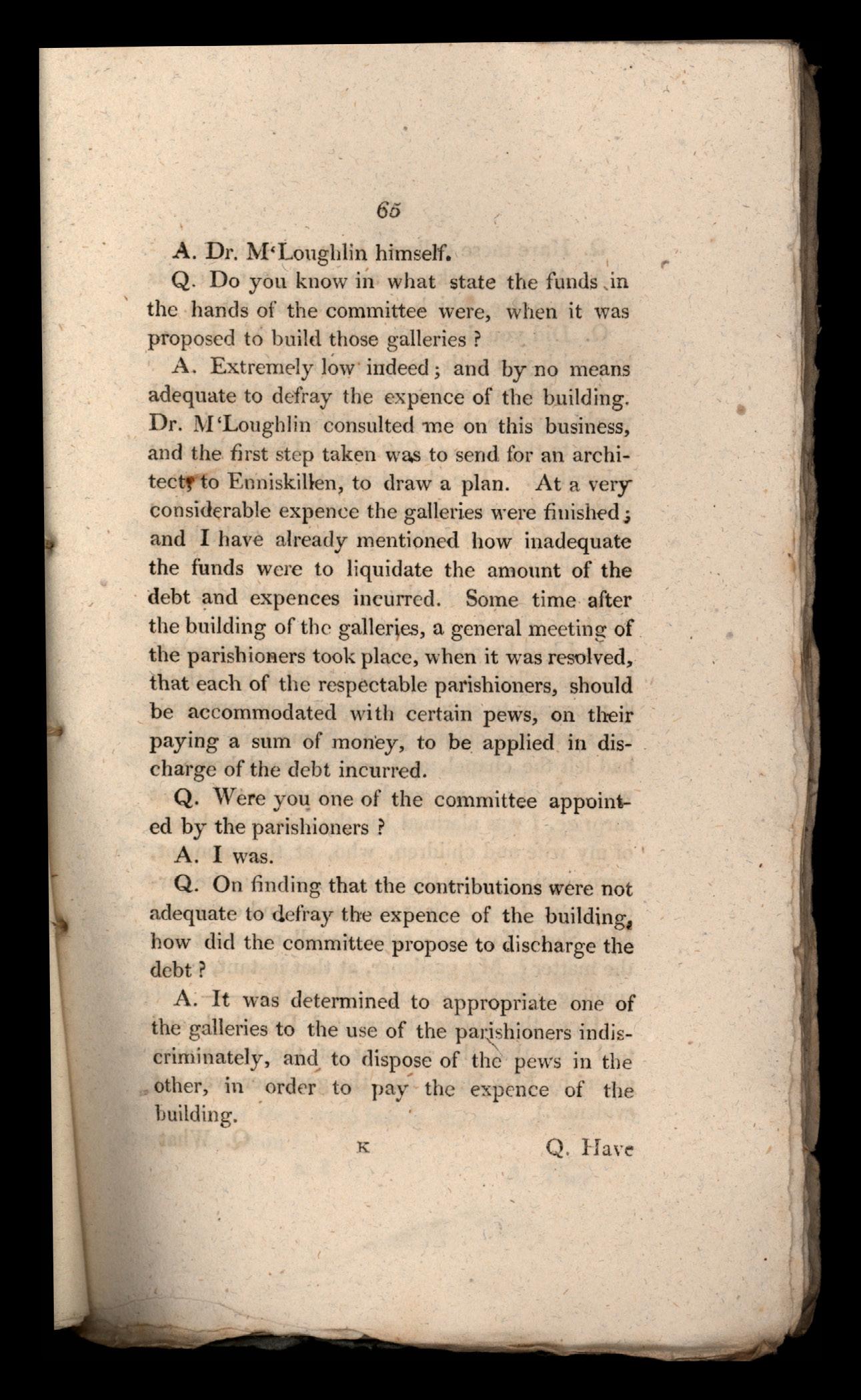
A. Dr. M•Longhlin himself.
Q. Do you know in what state the fun<ls in the hands of the committee were, when it was proposed to build those galleries ?
A. Extremely low indeed; and by no means adequate to de:fray the expenee of the building. Dr. .\!'Loughlin consulted me on this business, and the first step taken was to send for an architectf to Enniskillen, to draw a plan. At a very considerable expence the galleries were fiuished; and I have already mentioned how inadequate the funds were to liquidate the amount of the debt and expenccs incurred. Some time after the building of the galleries, a general meeting of the parishioners took place, when it was resolved, that each of the respectable parishioners, should be accommodated wi tl1 certain pews, on their paying a sum of money, to be applied in discharge of the debt incurred.
Q. ,vere you one of the committee appoin\.cd by the parishioners ?
A. I was.
Q. On finding that the contributions were not adequate to <lefray the expence of the building. how did the committee propose to discharge the debt?
A. It was determined to appropriate one of the galleries to the use of the parishioners indiscriminately, and to dispose of the pews in the other, in ordrr to pay the expcnce of the lJUilding.

Q. Have those galleries been yet paid for ?
A. All the workmen are paid," but there 1s still a sum due, which has arisen from~ loan.
Q.. Did you desire the architect, Mr. Lyster, to furnish you with his account ?
A. I did, and at the same time told him, that I would pay him the Hmount of his account, in adoition to the sum of £50. which 1 had originally subscribed. The chapel was then consiuerably indebted to me, having already advanced the sum of £122. to ·defray the expencc of building theQ.galleries. Were you in the chapel on the day the riot took place?
A. I had been there before its commencement, but was called away on professional duty. I think jt necessary to state, that my gar<len communi• cates with the chapel yard. Some time after I had left the chapel, -and had returned home, I · was walking in my garden, where, to my great surprize, I was alarmed by the cries and shrieks of my wife and children, who, at that moment, were escaping from the riot, and entering the garden gate. I ran to their assistance, and entreated Mrs. Sheil, for God's sake, to tell me what was the matter? My gardener, at that instant, came running towards me, and told me that(Here the Judge interrupted Dr. Sheil, and told him that the account of the transaction given by Mrs. Sheil, and ' the gardener was not evidence.)
Q. What
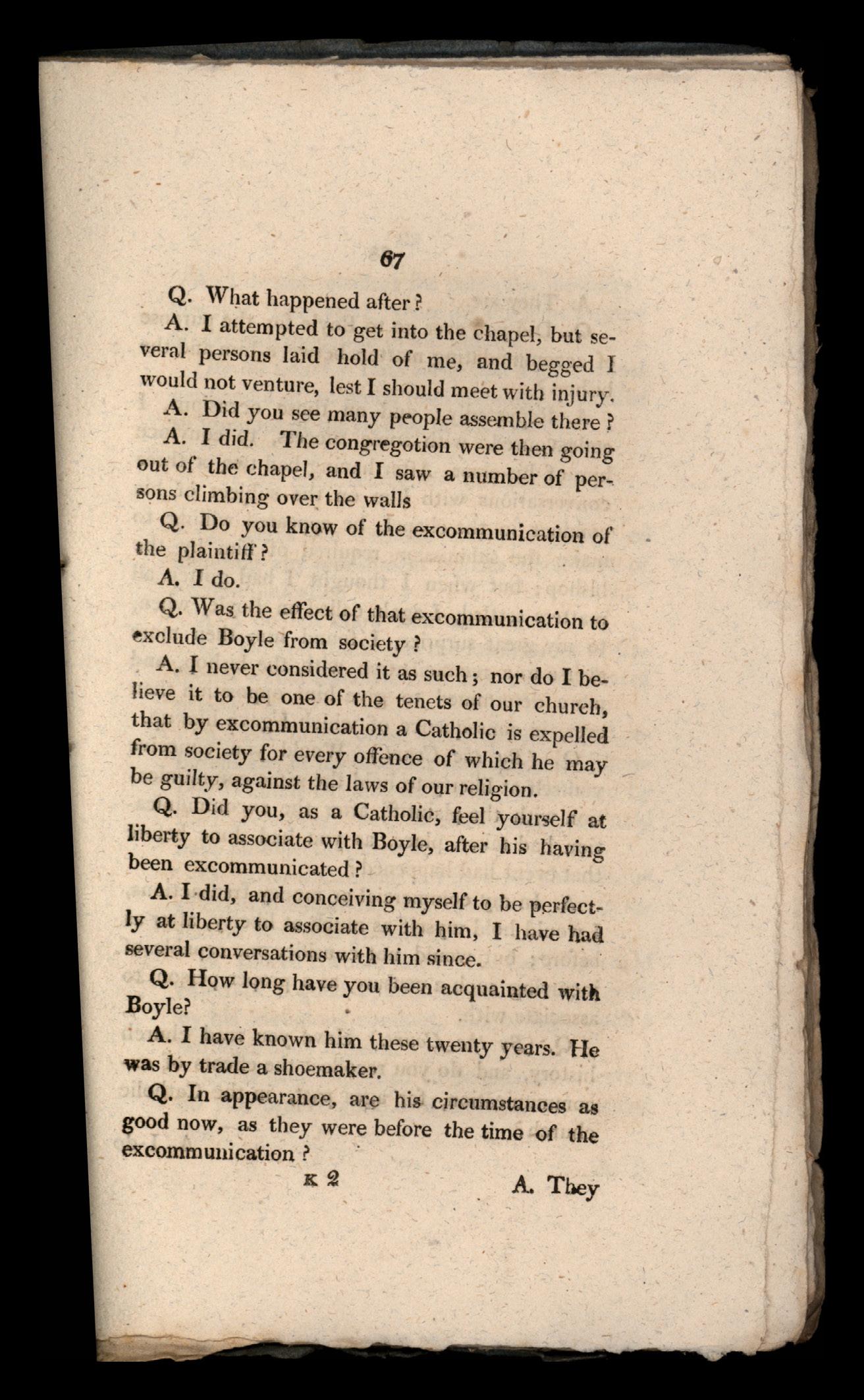
Q. ,vhat happened after?
A . I attempted to get into the chapel, but e- veral persons laid hold of me, and begged I would not venture, lest I should meet with inju ry.
A. Did you see many pe-ople assemble there ?
A. I did. Tile congregotion were then going out of the chapel, and I saw a number of per- sons climbing over the walls
Q . Do you know of the excommunication of t he plaintiff?
A. I do.
Q. Was the effect of that excommunication to exclude Boyle from society ?
A. I never considered it as such; nor do I be- lieve it to be one of the t enets of our church, that by excommunication a Catholic is expelled from society for every offence of which he may be guilty, against the laws of our religion.
Q. Did you, as a Catholic, feel yourself at liberty to associate with Boyle, after his having been excommunicated ?
A. I did, and conceiving myself to be perfect- ly at liberty to associate with him, I have had several conversations with him since.
Q. How long have you been acquainted with Boyle?
A. I have known him these twenty years. He was by trade a shoemaker.
Q. In appearance, are his circumstances as good now, as they were before the time of the excommuuication ? • 1t 2
A. They

A. They are.
Q. Did yott c,·er go to Boyle for the purpose of accommodating matters between him an<l the bishop? , A. Repeatedly: and on t\1ose occa>ions, I endeavourcl\, with some success, to convince l1im of his error. After having had two 01 three conversations with him on the subject of his conduct in the chapel, be appeared wining to n1ake the submission required of him by the bishop; bnt when I thought I had gotten all matters settled, I again called on Boyle, when, to my great surprize, l found him then more ~verse to a reconciliation with the bishop, and more determined to give him opposition than ever, in consequence of which 1 gan! l1im up.
Q, (By the Cvnrl,) \Vould you conceive ·yourself at liberty to hold the same communication with the plaintiff, after the excommunication had taken place, as you l1ac\ done before that event had happened?
A. In n1y comn1e1·cial or money transactions, I would hold myself as much at liberty, after as before; but would not consider one capable of incurring such a censure, as a proper person to asso~iate witl1.
Q. (BY the Court.) Have you read church history, and do you recollect the effects of ex., communication, for ages past, in the Catholic church?
A. I do
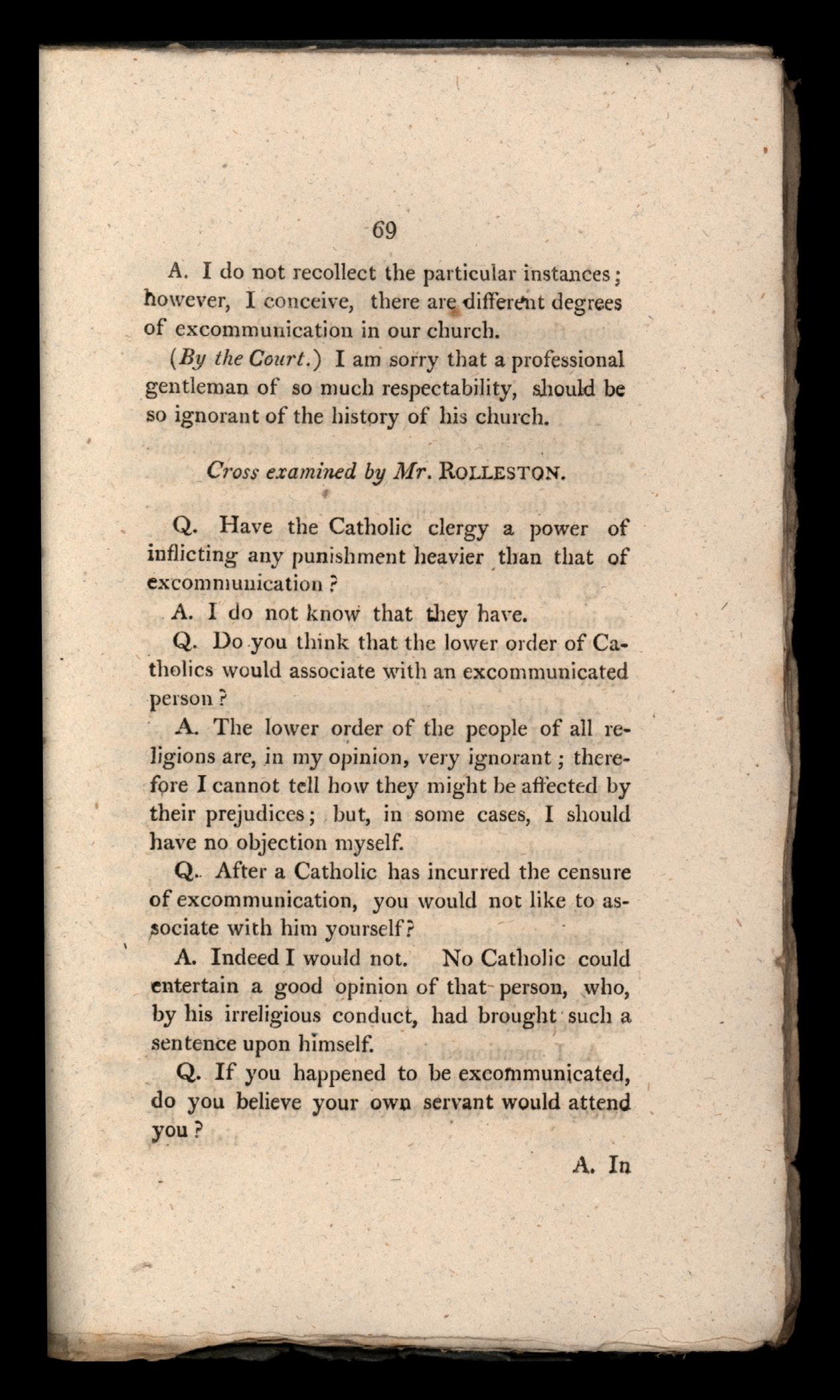
A. I do not recollect the particular instaJ.1ces; however, I conceive, there are different degrees of excommunication in our church.
(By the Co1a·t.) I am sorry that a professional gentleman of so much respectability, should be so ignorant of the history of his church.
Cross e.rami11ed by Mr.
ROLLESTON.
Q. Have the Catholic clergy a power of inflicting any punishment heavier than that of cxcommuuication ?
A. I do not know that they ha,·e.
Q. Do you think that the lowtr order of Catholics would associate with an excommunicated person?
A The lower order of the people of all religions are, in my opinion, very ignorant; theref9re I cannot tell how they might be aftected by their prejudices; but, in some cases, I should have no objection myself.
Q~ After a Catholic has incurred the censure of excommunication, you would not like to as,sociate with him yourself?
A. Indeed I would not. No Catholic could entertain a good opinion of that person, who, by his irreligious cond.uct, had brought ·such a sentence upon hi'mself.
Q. If you happened to be excommunicated, do you believe your own servant would attend you?
A. In '

A. In some cases, I think he wouki.
Q. Has not excommunication, in your opinion, the effect of depriving the delinquent fiom aociety, until, by doing penance, he shall bt: permitted to re1Jm1 within the pale of the church?
A. In my opinion (as I before expressed myself) there are different degrees of excommunication; one of which goes to the length of depriving the delinquent of participating in the sacraments, until, by sincere repentance, the censure is taken away.
Q. By virtue of your oath, did you, directly or indirectly, interfere with the parishioners of Kilbarren, to prevent their paying the amount of their subscription?
A. I did; and for these reasons only :-First, because I considered the resistance given by Boyle to the bishop, to raise the amount of the debt, by disposing of the pews, as an act of the greatest ingratitude, as well as of injustice to him; and secondly, because I found those combinators were composed of the very lowest order of the parishioners ; and I had sufficient reasons for knowing the dangerous consequences of ~ither sufft:ring or encouraging such associations.
Q. Did you ever speak of the transaction to any person?
A. I mentioned it to a gentleman who was then, on a visit at my house; and before I interfered, I was very well convinced, that the parishionera

rishioners would never pay the tlcbt due on ac- count of the galleries.
Q. If you thought so, why did you interfere • to prevent them r
A. I interfered to prevent the formation of associations, which I was convinced, from what had happened in other places,wo uld be pro- ductive of the most dangerous effects.
[The case bein~ closed on the part of the defendant, Mr. S.\£YLY spoke to evidence to the following effect : ]
JJI_y Lord, 11nd Gentlemen of tlie Jury,
1 t is with sincere regret, that I trespass on your time, at so late an hour. His lordship has in- timated, that this case is of sufficient importance, to call for the observations of counsel on the evi- dence, and much as I must despair of throwing any light on the testimony, which you ha,,e with so much patience and attention heard, yet I should be wanting in zeal to my cJient, and offer vi_olence to my own anxious feelings, were I to with-hold my humble efforts for the plaintiff's success, from any motives-even from the con- sciousness of inability to do justice to his cause. Permit me, however, to congratulate him, and myself, that he lives under laws, which have.. provided him with a tribunal, where-, if he has been
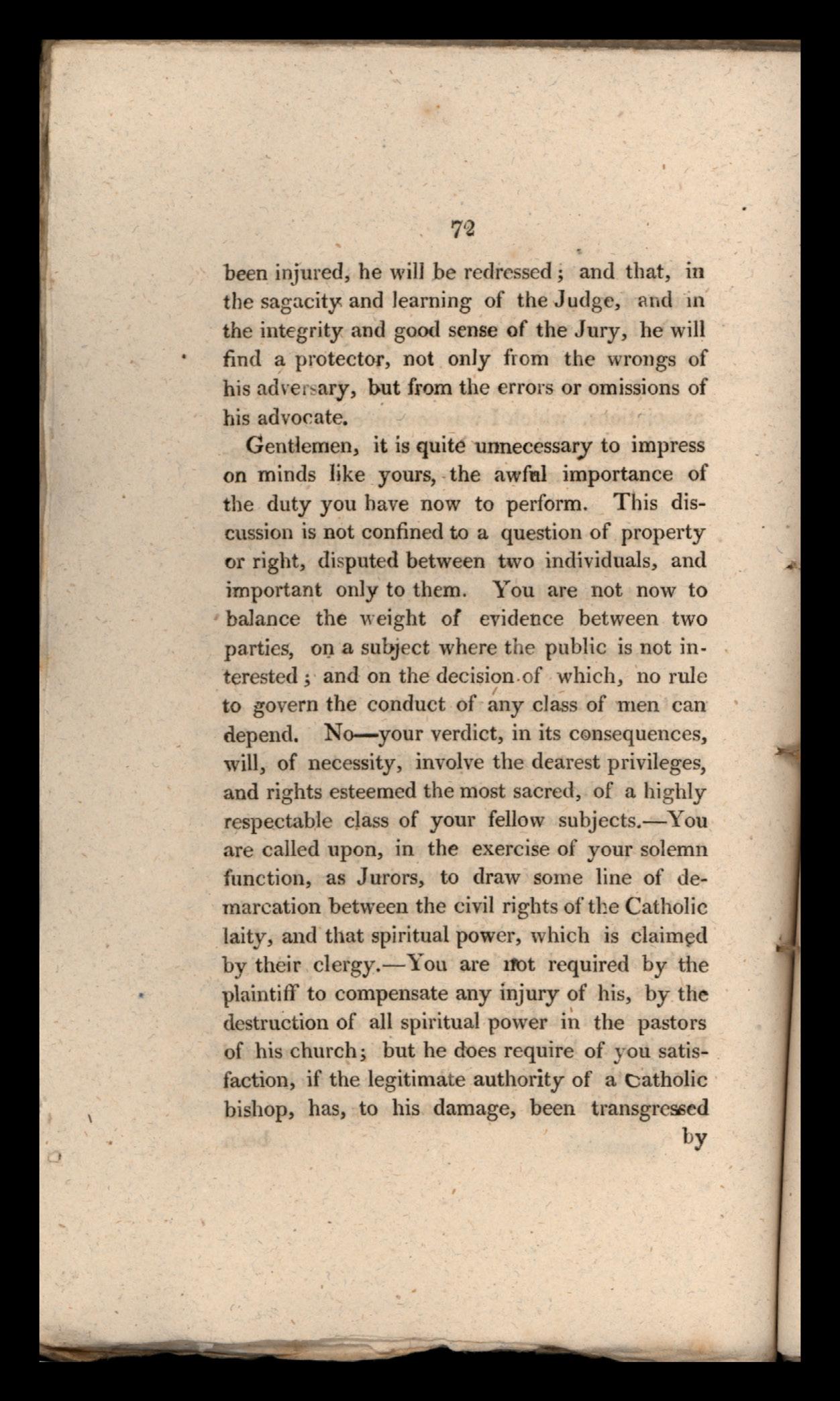
7'2
been injured, he will be rcdrc-ssed; and that, m the sagacity and learning of the Judge, and 111 the integrity and good sense of the Jury, he will find a protector, not only from the wro11gs of his adrer-:uy, but from the errors or omissions of his advocate.
Gentlemen, it is quite unnecessary to impress on minds like yours, the awfnl importance of the duty you have now to perform. This discussion is not confined to a question of property or right, disputed between two individuals, and important only to them. You are not now to balance the weight of evidence between two parties, on a sul>Ject where the public is not interested; and on the decision .of which, no rule to govern the conduct of any class of men can depend. No-your verdict, in its consequences, will, of necessity, involve the dearest privileges, and rights esteemed the most sacred, of a highly respectable class of your fellow subjects.-You are called upon, in the exercise of your solemn function, as Jurors, to draw some line of Jemarcation between the civil rights of tbe Catholic laity, and that spiritual power, which is claimed by their clergy.-You are 11t>t required by the plaintiff to compensate any injury of his, by the destruction of all spiritual power in the pastors of his church; but he does require of you satisfaction, if the legitimate authority of a catholic bishop, has, to his damage, been transgressed uy
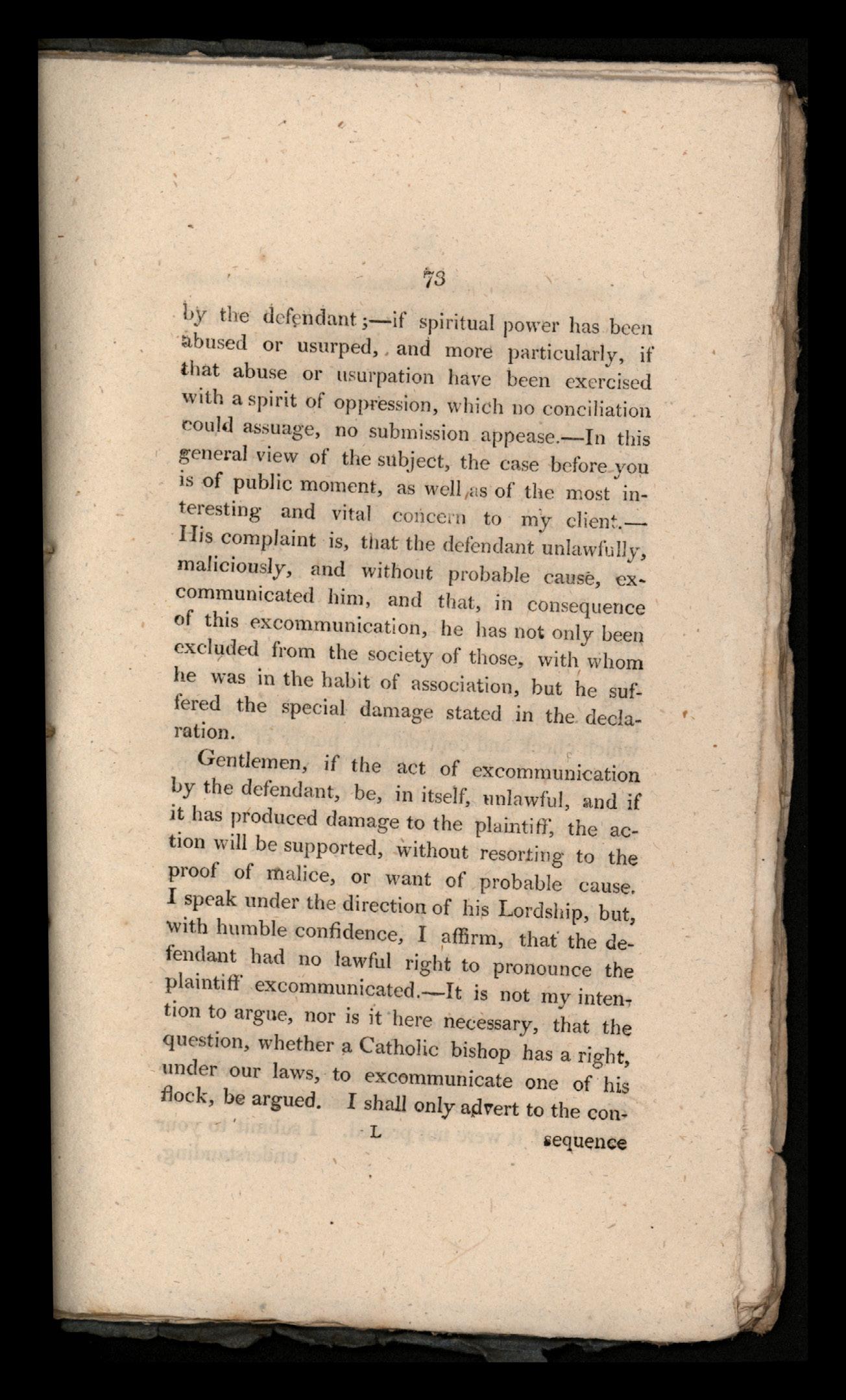
l,y the d efp1Cbnt ;-if spiritual power h as been ~buse<l or usurped, and more partic ularly, if that abuse or usur patio n hare been exercised with a spirit of oppression, \\ hich 110 conciliation rould al>,,uage, no submission appcasc.-In this tencra l view of tlie sn~ject, the case bC'fore ) ou is of public moment, as wdl : s of the most in- teresting and vital eu1cc, 11 to my clien~.- liis complaint is, that th e ddcn<lant unlawfully, maliciously, and without probable cause, ex ~ communicate d him, an<l that, in consequence of this excommunication, he has not Oll ly been excluded from the society of those, with whom he \'Vas in the ha.bit of assoc:iation , but he suf- fered the special damage stated in the decfa.- rotion.
G entlemen, if the act of excommunication by the d efendant, be, in itself, unlawful, and if it has producC>d dam age to the plaintiH: the ac- tion will be supp or ted, without resor.tiug to the proof of malice, or want of probable cause. I speak under the direction of hi s Lordship, but, \Vith humble confidence, I affir m, that' the de- fendant had no lawful rig ht to pronounce the plaintiff excommunicatcd.-It is not my inten- ti on to argue, nor is it ' here necessary, that the qu<'st ion, whether a Catholic bishop has a right, unde r our laws, to excommunicate one of his flock, be argued. I shall only apvert to the con.
iequence

sequence of supposing sue!~· a right to uc cithe: prored or conceded.
In the E stabl ished Church, excommunication is the sentence o f a Court, in which the person to be sentencC'd has the means of defence, an d sur ei:ior C ourts to which he may appeal. Tlie forms of the Catholic Church, wil('re it is C!; t abli she <l, allow, ::md, in these coun tri es , before the reformation, afforded the same just indulgrncc to parti es accu sed . Ilnt if the • right claimed by the defendant, be affir med , to excommunicate without notice, means of defence, or power of appeal, what dreadful power will be lodged in the Catholic bi shop? Can it be seriously contended, that th e Jaws of this country, which check and controul the power of €'XCOmmunication in the established Protestant bishop, would indulge the tolerated Catholic with the same power, unfettered with any form, and uncontroulable by any corrective ? In this view of the subject, without pretending to any detail of arg ument, and looking only to one obvious consequence, I utterly deny that the defendant had a right to excommunicate my client; an<l if the act itself were unlawful, the action is sm,.,_ taincd by the evidence.
Much stress is indeed laid by Mr. Johnston on the word malice, in the declaration, as if evidence of express malice were necessary, or if necessary, as if it were not proved. I submit to your understanding,

m1<lersta11ding, "hctll(•r ubuncfant evicknce jJ; not Iai<l before' you, from \\'hence uwlice is to be direc tly infi:·rreJ; ..-n<l if no such C\ idencc we re gi \·cu, I i,till asser t, th at it was not n eces- i-ary. If the act we re unl awfu l, and occnsioned datnage to the I Iaiutift~ the hlw \\ ou ld infer an d supply that species of malice \\ hich the Jcda- ration allc•gei,.
Here th l' 11 I might rest the case of lhe plain- tiff, and at once call on you for a verdict and damages, commc·nsurate \\ ith his t emporal loss, adequate to compc'11satc• the woull(h which his character a n<l feelin gs have sustained, from the misconduct of the tlefoudant. But I willingly surrender t!tis impreg nable fortress, Ull(], con- fiding in the strength of my cause, I dare to take the open fiel<l. I submit to you, that even if I concede to the <lefendant the power of excom- munication, it will yet appear that he has • abused that pow <.'r, b_y applying it to temporal purposes. I go still farther, an d affirm, that, even if h e possc-i:;s s uch power, and may apply it to tempo ral u ses, h e has exc<:edeJ <ive u this la- titude, hy exercis ing, in this case, spiritual a u- thority for tempol'al purpose~, ,~ hith he kn ew to b e uujust.
Gentl~m en, allow m e to direct y~ur minds to the history of this transactiou, a~ it i:- to b~ collected fro m the evidt·nce. It appears that tl1is chnpcl m1s orig inally built l,y p uu lic ~ub~ L 2 ~cription :
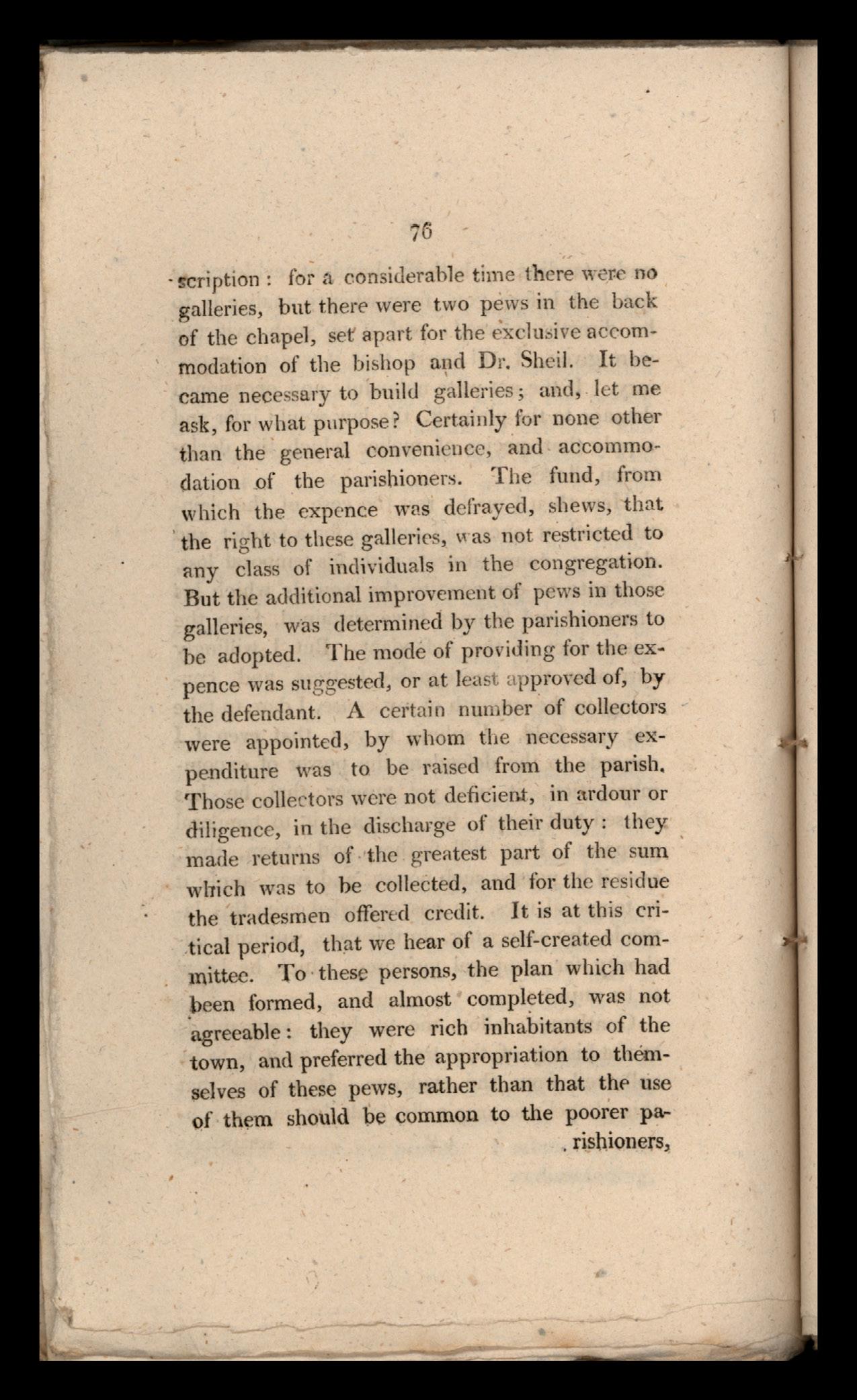
· scri pt1011 : for a consi<lerable time there "ere no galleries, but there were two pews in the back of the chapel, set' apart for the exclu,,ivc accom• modation of the bishop and Dr. Sh ei l. It became necessa ry to build galleri es; and, let me ask, for what p11rpose? Certaiuly for none other than the general convenience, and accommodation of the parishioners. The fund, from which the expcnce was defrayed, shews, that • the ri g ht to these galleri<'s, "as not r estricted to any class of individuals in the congregation. But the additional improvem e nt of pews in those galleries, was determined by the parishioners to be adopted. The mode of providing for the expence was su ggested, or at least ,1 1>pr0Yed of, by the defendant. A certain number of collectors were appointed, by who m th e necessary expenditure was to be rai sed from the parish. Those collectors were not defici e nt, in ardour or diligen ce, in the discharge of their duty : they made r eturns of the g reatest part of the sum which wns to he collected, and for th e resid ue the tradesmen offered credit. It is at this cri• tieal perio<l, that we hear of a self.created committee. To these persons, the plan which had ;been formed, and almost compl~ted, was not agreeable : they were rich inhabitants of the town, and preferred the appropriation to themselves of these pews, rather than that thf' use of them should be common to the poorer pa. rishioners,
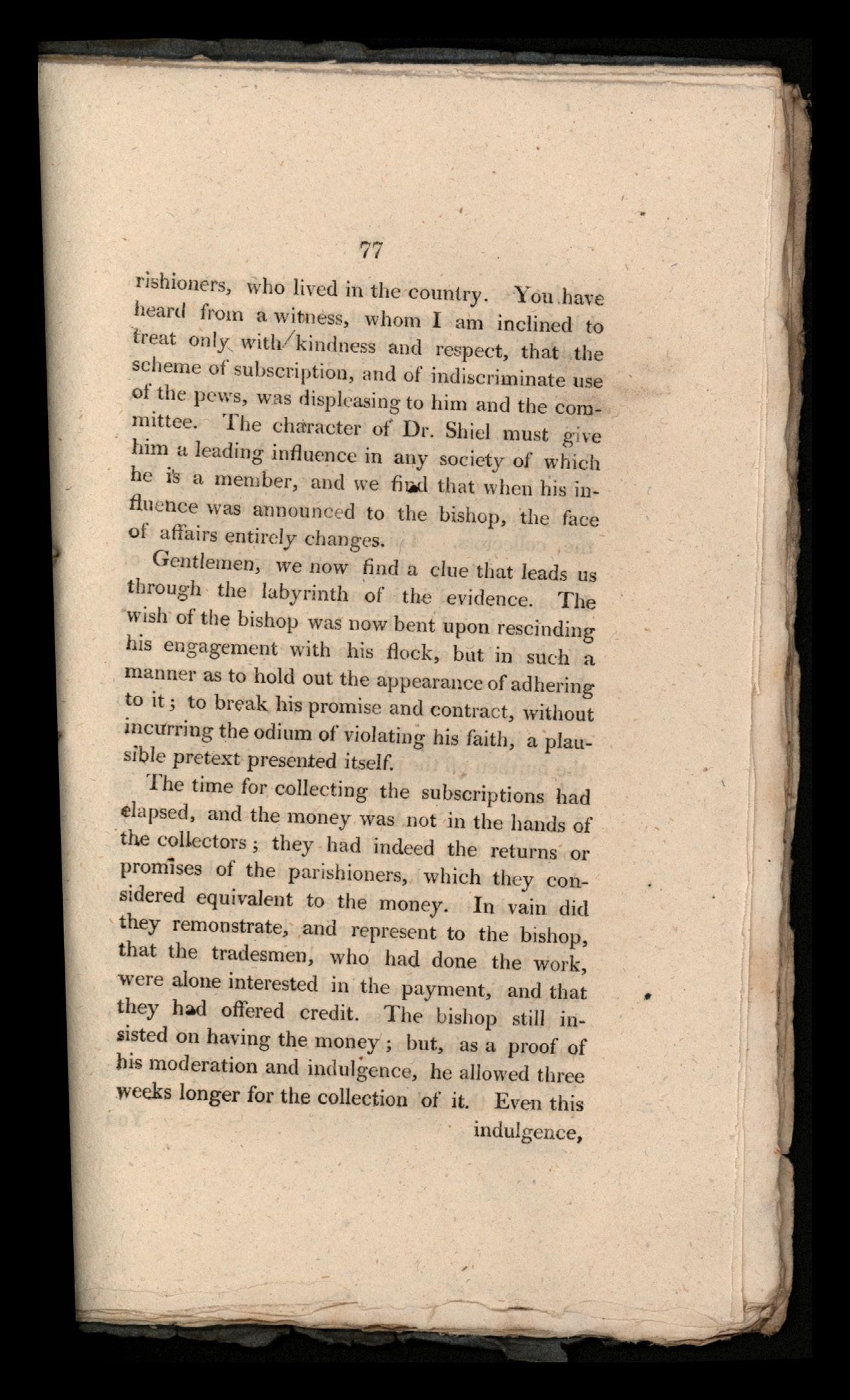
rishioners, who Ii,ed in tltc country. You luwe heard from a witness, whom I am inclined to treat only with / kindness and respect, that the scheme of subscription, and of in<lii,criminate use of the p<:ws, W'.'ls displeasing to him and the com- mittee. The clmractcr of Dr. Shiel must g \e him a leading influence in any society of which he i~ a meniLer, and we fi1aC.l that nhcn his iu- fl.u ~nce was annonn c• d to the bishop, the face of affairs cntirdy dianges.
Gentlemen, we now finc'I a clue that leads us through the labyrinth of the e\'idencc. The wish of the bishop was now bent upon rescinding his en gagement with his flock, but in such a mann er as to hold out the aµpcarance of adhering to it; to break his promisP and contract, without incurring the odium of violating his faith, a plau- sible pretext presented j1:5clf.
The time for collecting the subscriptions had elapsed , and the money was not in the hands of the collectors ; they had indeed the returns or promises of the parishioners, which th ey con- sidered equivalent to the mon ey. In vain did they remonstrate, and represent to the bishop, that the traJesmen, who had done the work, were alone interested in the payment, and that • they had offered credit. The oishop still in- iisted on having the money ; bnt, as a proof of his moderation and indulgence, he allo-ncd three weeks longer for the collection of it. Even this indulgence,
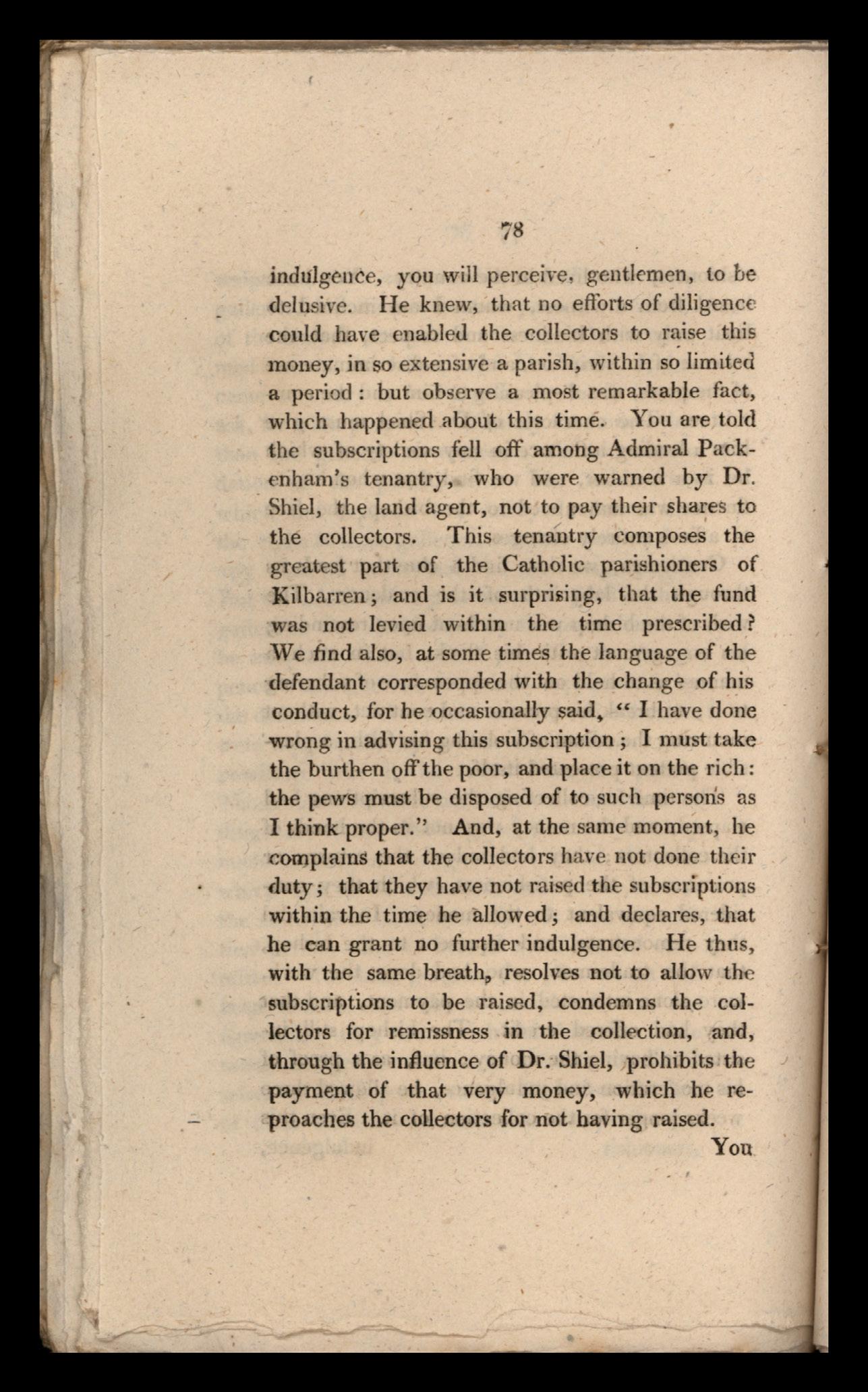
indulgence, you will p erce ive, ge ntlem en, to b e delu sive . He knew, th a t no e ffort s of dili ge n ce could have enabl ed the collectors to rai se thi s money, in so extensive a parish, within so limited a p eri od : but ob se rve a most r e ma rkable fa ct, which happ en ed about this time. You are told the sub scriptions fell off among Admiral P ac kenham' s t cnant ry, who were warned by Dr. Shiel, the land agent, not to pay their shares to the collectors. This t enantry composes the greatest part of the Catholi c parishioners of Kilbarren; and is it surprising, that the fund was not levied within the time prescribed ? "\Ve find also, at som e tim es th e language of th e defendant corresponded with the chan g e of his conduct, for he occasionally said. " I have done wrong in advising this subscription; I must take the burthen off the poor, and place it on th e rich : the pews must be disposed of to such p ersons as I think proper.' ' And, at the same moment, he complains that the collectors have not don e thei r duty; that they have not r aised the subscription s within the time he allowed; and d eclares, that he can grant no further indulgence. H e thu s, with the same breath,, resolves not to allow the subscriptions to be r a ised, condemns the collectors for remissness in the collection, and, through the influence of Dr. Shiel, prohibits th e payment of that very money, which he reproaches the collectors for not having raised. You
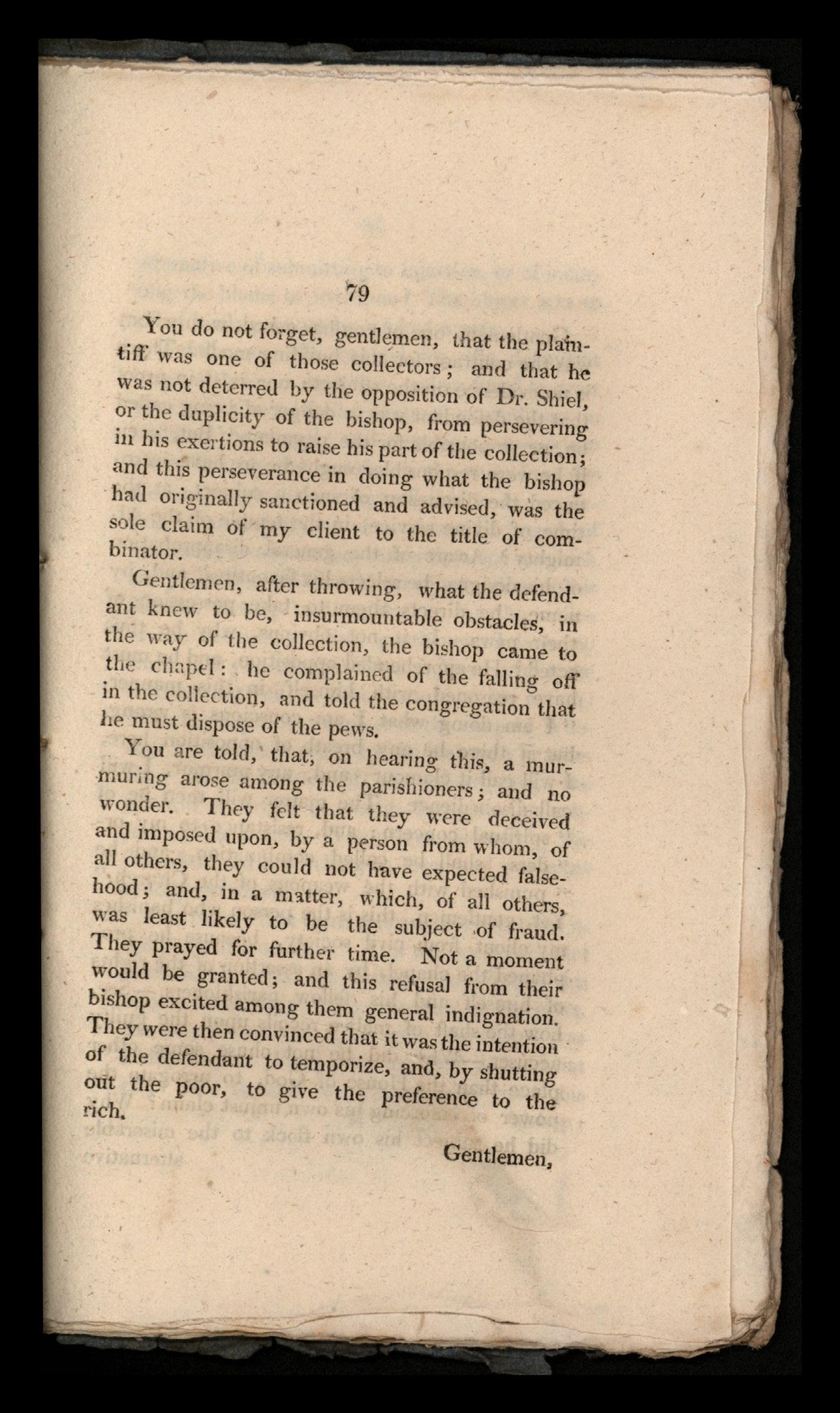
You do not fo;-get, gentlemen, that the plain- tiff was one of those collectors ; and that he was not deterreJ by the opposition of Dr. Shiel, or the duplicity of the bishop, from persevering in his exertions to raise his part of tl1e collection; and this perseverance in doing what the bishop ha<l originally sanctioned and advised, was the sole claim of my client to the title of com- binator.
Gentlem<'n, after throwing, what the defend- ant knew to be, insurmountable obstacles, in the way of the colJcction, the bi!'.'hop came to tl1e ch:ip( I : he complain<'d of the falling off in the collection, and told the congregation that lie must dispose of the pews.
You are told, that, on hearing tl1is, a mur- mur;ng arose among the parisf1ioners; aud no wonder. They felt that they were deceived and impose<l upon, by a person from "" horn, of all others, they could not have expected false- hood; and, in a m'ltter, which, of all others, was least likely to be the su~ject of fraud. They prayed for further time. Not a moment would be granted; and this refusal from their bishop excited among them general indignation. They were then convinced that it was the intention of the defendant to temporize, and, by shutting ont the poor, to give the preference to the rich.
Gentlemen,
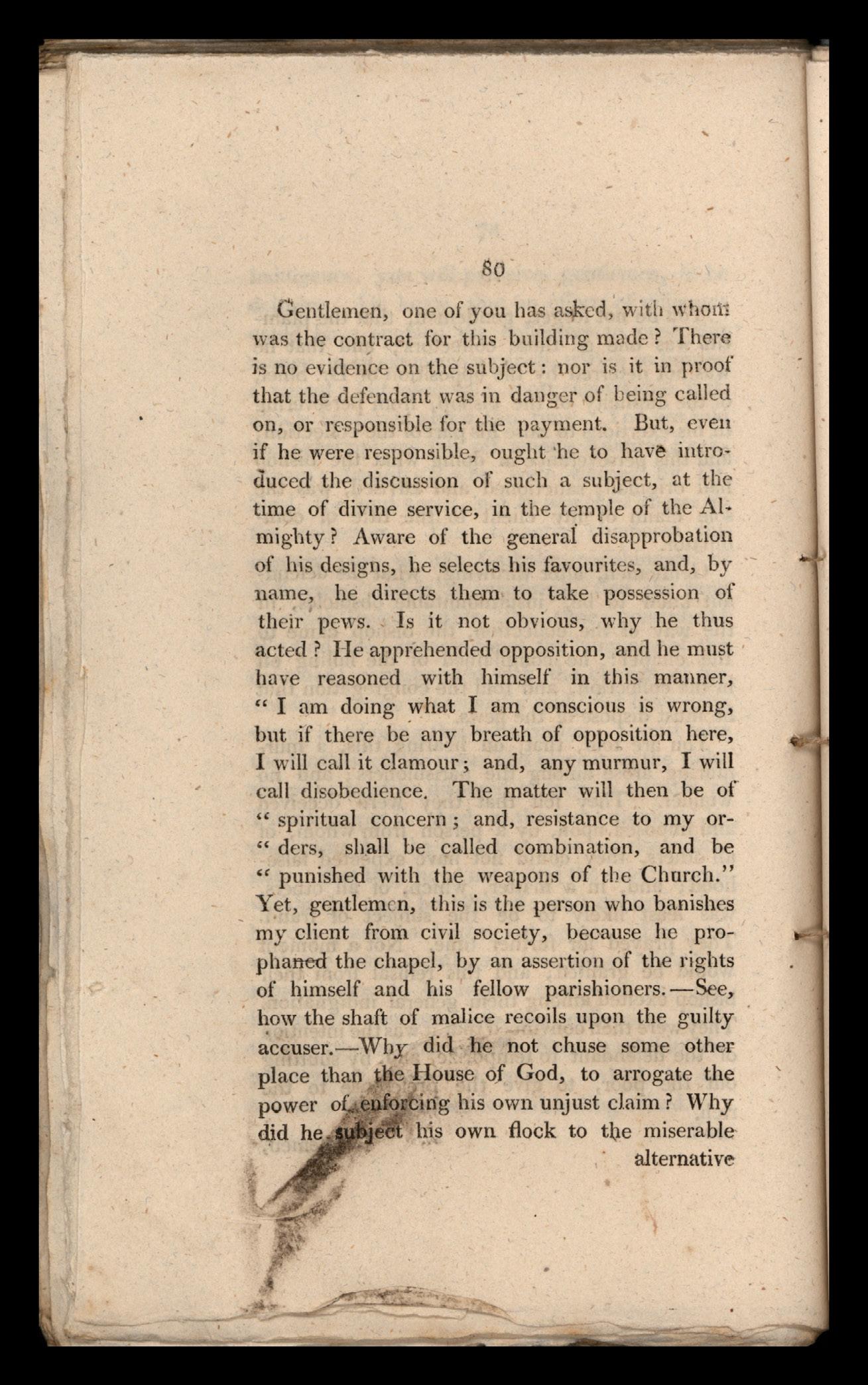
Gentlemen, one of you has asked, with wh 011, was the contract for this building made? There is no evide nce on the subject : nor is it in proof that the defendant was in dallgcr of bei n g called on, or respon sible for the p ayme nt. But, even if he were respons ible, ought ·he to h ave introduced the discuss ion or su ch a subj ect, at the time of divine service, in th e temple of the Almighty? Aware of the generai di sap pro bation of his designs, he selects his favomites, and, b y name, he direc ts them to take po ssession of their pc ws. Is it not obvious, why he thus acted ? Ile apprehended opposition, and he must have reason ed with him self in this manner, " I am doing what I am conscious is wrong, bnt if there be· any breath of opposition here, I will call it clamour; and, any murmur, I will call disobedience. The matter will then be of " spiritual conce rn ; and, resistance to my or" dcrs, shall be called combination, and be "punished with the wea pons of tb e Church . " Yet, gentlemrn, this is the person who banishes my client from civil soci ety, because h e prophaned the chapel, by an assertion of the rights of himself and his fellow parishion ers. -See, how the shaft of malice recoils upon the guilty ~ccuser. - Why did he not chuse some other place than the House of God, to arrogate the power 04e~rting his own unjust claim ? Why ~d he his own flock to tQe mise rable alternative
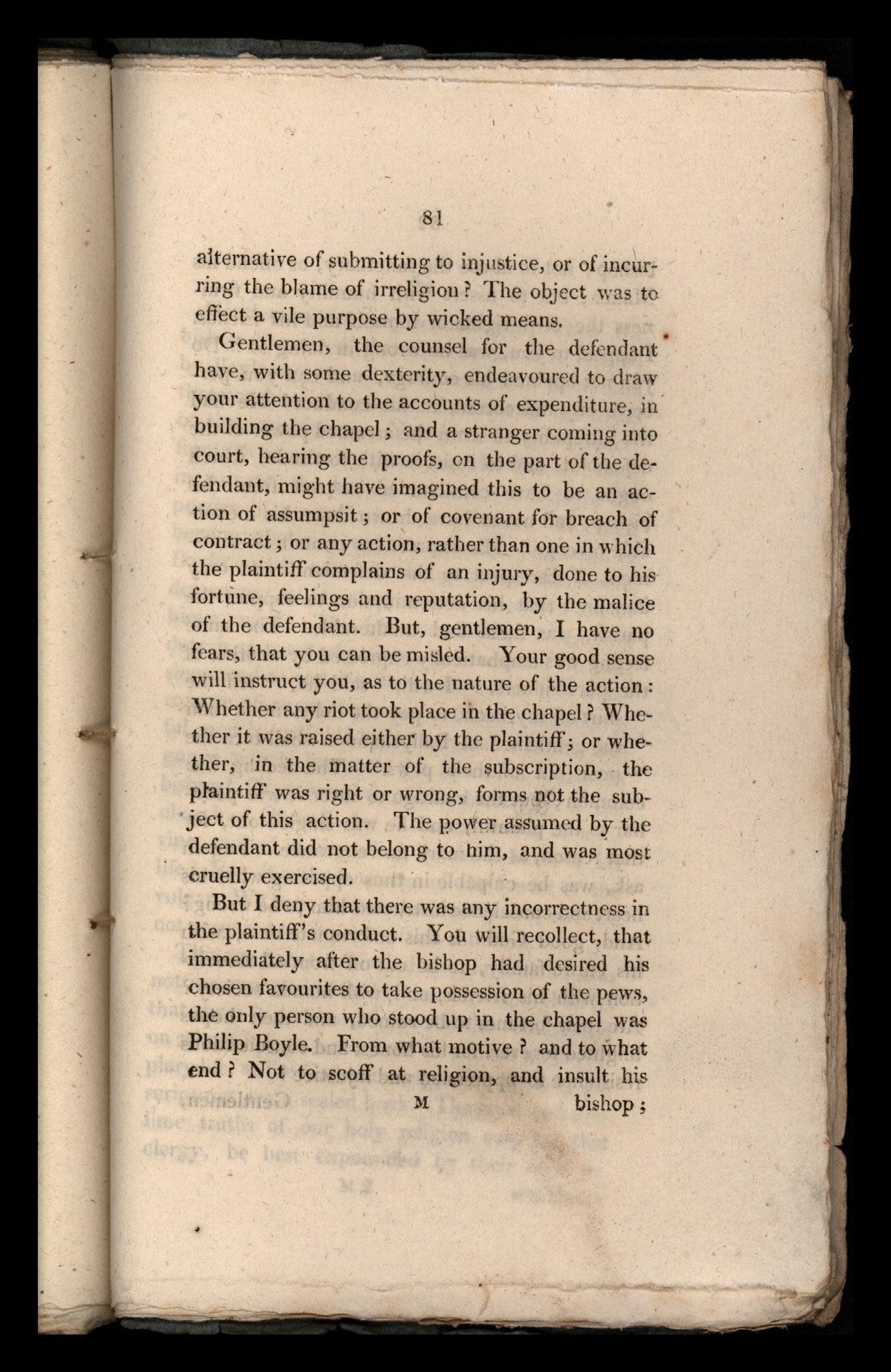
alternative of submitting to injustice, or of incurring the blame of irreligiou? The object was to effect a vile purpose by wicked means.
Gentlemen, the counsel for the defendant have, with some dexterity, endea\'oured to draw your attention to the accounts of expenditure, in · building the chapel; and a stranger coming into court, hearing the proofs, on the part of the defendant, might have imagined this to be an action of assumpsit; or of covenant for breach of contract; or any action, rather than one in which the plaintiff complains of an injury, done to his fortune, feelings and reputation, by the malice of the defendant. But, gentlemen~ I have no fears, that you can be misled. Your good sense will instruct you, as to the nature of the action: "'hether any riot took place in the chapel ? Whether it was ra.ised either by the plaintiff; or whether, in the matter of the subscription, the ptaintiff was right or wrong, forms not the subject of this action. The r.ower assumed by the defendant did not belong to him, and was ·most cruelly exercised.
But I deny that there was any incorrectncss in the plaintiff's conduct. You will recollect, that immediately after the bishop had desired his chosen favourites to take possession of the pews, the only person who stood up in the chapel was Philip Boyle. From what motive ? and to what end ? Not to scoff at religion, and insult his M bishop;
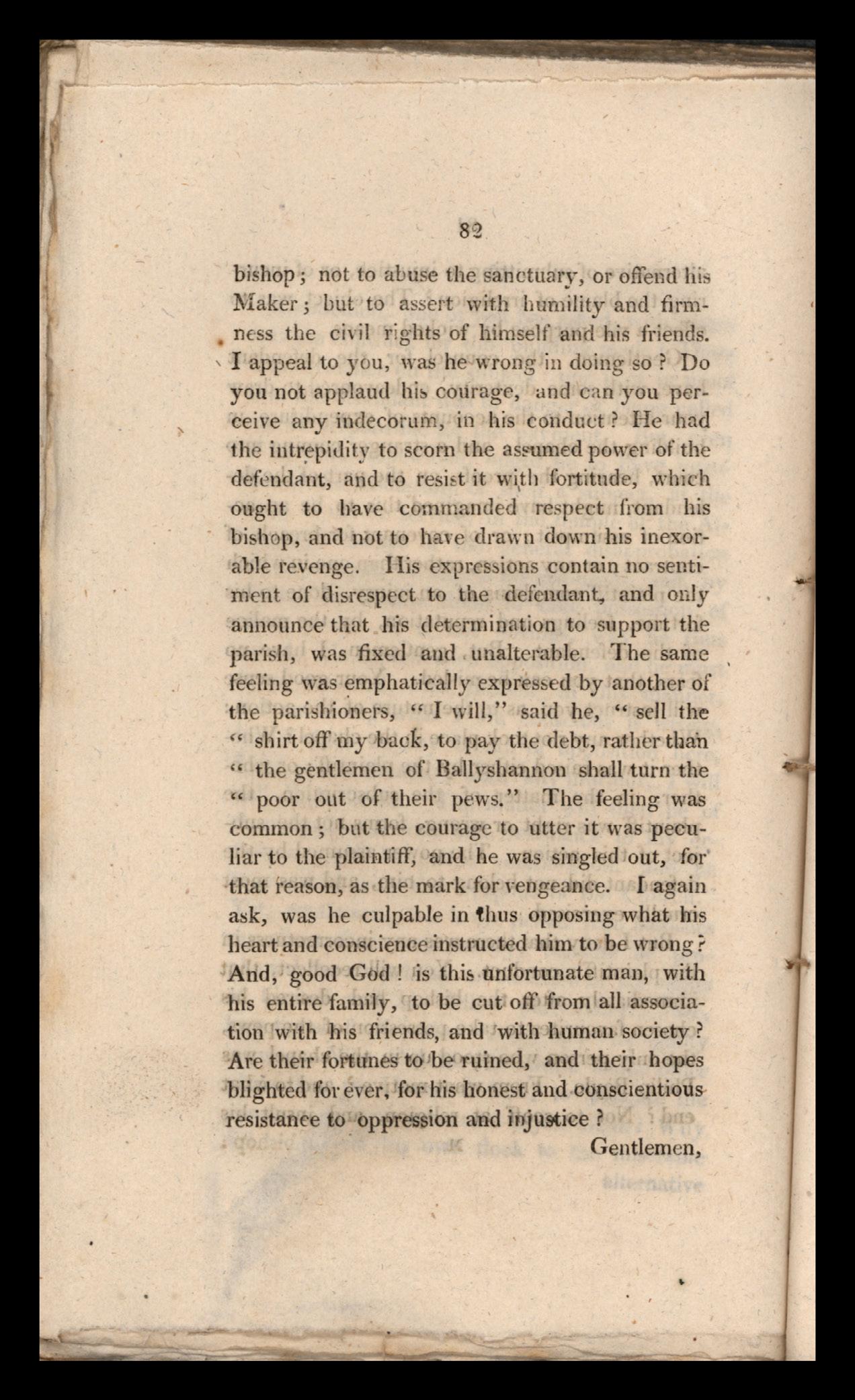
bishop; not to abuse the sanctuary, or offend hi:. Maker; but to assert with humility and firm. nt:ss the ci\ il r ights of himself anrl his friends. , I appeal to you, was he wrong in doing so ? Do you not applaud his courage', und can you perceive any indecorum, in his conduct? He had the intr~pi<lity to scorn the asrumed power of the defendant, and to tesi ~t it wi,th fortitude, which ought to have commanded rc1-pect from his bishop, and not to hare drawn down his inexorable revenge. Ilis exprcs~ions contain no sentiment of disrespect to the defendant, and only announce that his determination to support the parish, was fixed and unalterable. The same feeling was emphatically expressed by another of the parishioners, " I will," said he, "sell the " shirt off my back, to pay the debt, rather than " the gentlemen of Ballyshannoll shall turn the " poor out of their pews." The feeling was common; but the courage to utter it was peculiar to the plaintiff, and he was singled out, for that reason, as the mark for ,·engeance. f again ask, was he culpable in t hus opposing what his heart and conscience instructed him to be wrong?And, good God ! is this unfortunate man, with his entire family, to be cut off from all association with his friends, and with human society ? Are their fortunes to be ruined, and their hopes blighted for ever. for his honest and conscientious resistanre to oppression and injustice ?
Gentlemen,

Gentlemen, kt me n mind you, ,, hen tl1e bishop discol·ert:d, that liis :;c:hcmes were rc'>istc<l by Doyle-, no means were omittc:d to c~jolc and tbrc,1tcn h;m into nn abanclonme11t of tl1c rights of the pori hioncr~. You h::n e it, in cridencc, from ' ;s own trusty treasur(•r, ~Jr. Cassidy, tha1, in printe, th<' hi;)hop exl.au~b cl on Boyle hi~ PO\Hr, of pcr:.uasion to no purpo£e. He then be"ame choleric, and the inflexible resolution of Boyle, made more irritating by his submissive dcmea1:onr, at kngth prornkcd thr bishop to call him a rascal. This Christian bishop, ,, hose first duty is to tC>ach the sinwr to command his pas- sions, and to re:-train his wrath, bursts into a pa- roxysm of anger, because his fraud is unsuccC'ss- ful, and he calls his hearer a rascal. Is this lun- guage which becomes the lips of a Christian bishop ? Of a member of the hierarchy of the church of Christ? lire these the ·words of a <li- vinC', exalted in his calling by the holiness of his life? o-it is the language of the lowest of the vulgar. " 7 c hear it from the blackguard, and arc not pr<'pared to <'Xp<'ct it from a bishop. This suggc!--ts to my mind, a topic, which seems not uncom,ectcd "ith tlic case. I would ohsC'n·c, that there is no class of men, in the communily, on whom it is so :ncumbent to exhibit an exem- plary life, as the Catholic clergy. To the laity the scriptures are a sealed book. The gre!lt and sub- lime truths of our holy religion can, by that clere-y, be best expounded by their own 1eM 2 sembl.111cc
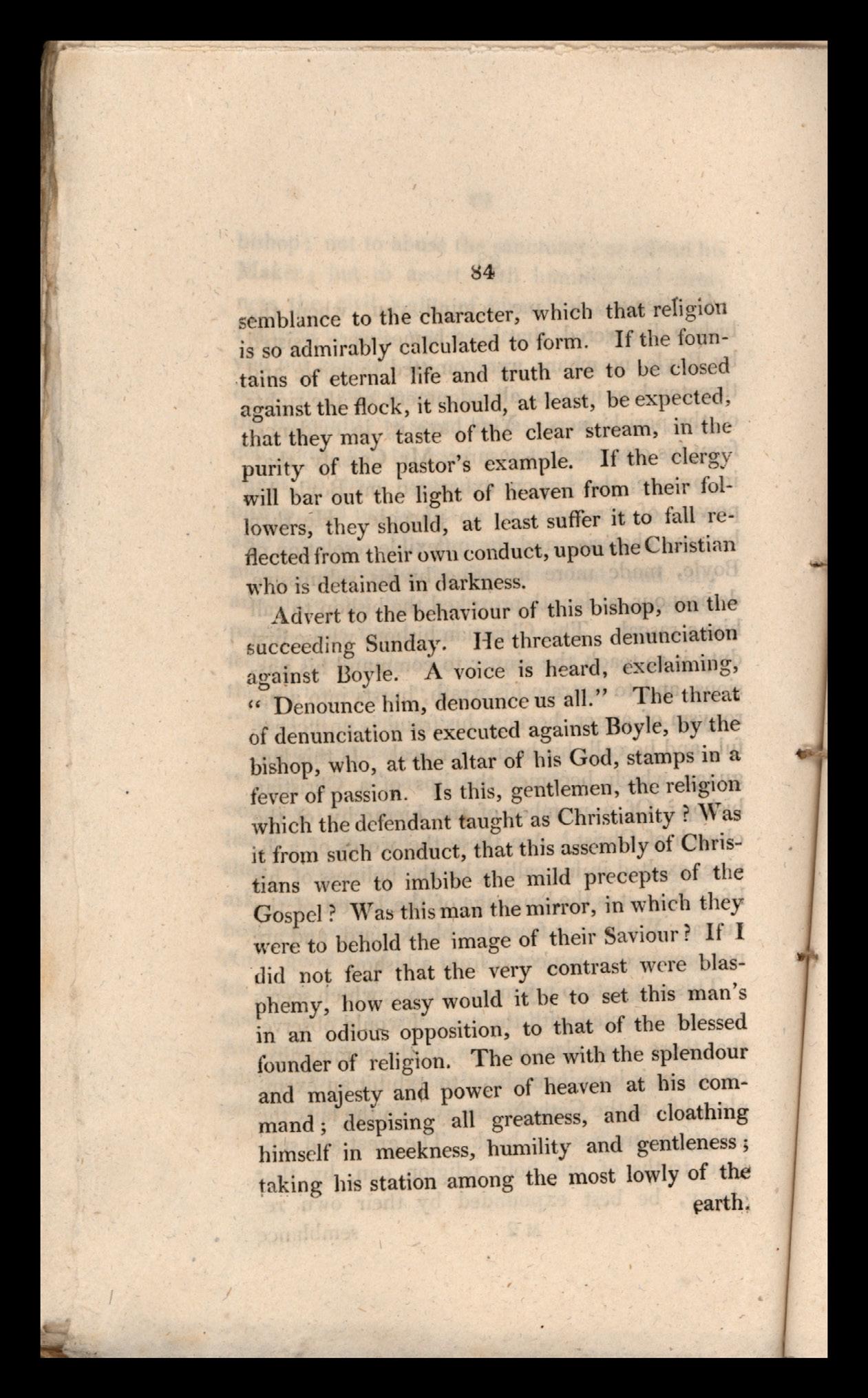
semblance to the character, which that refigion is so admirably calculated to form. If the foun.tains of eternal life and truth are to be dosed against the flock, it should, at least, be expected, that they may taste of the clear stream, in the purity of the pastor's example. If the clergy will bar out the light of heaven from their followers, they should, at least suffer it to fall reflected from their own conduct, upou the Christian ·who is detained in darkness. Advert to the behaviour of this bishop, on the E.ucceeding Sunday. He threatens denunciation against l3oyle. A voice is heard, exclaiming, " D enounce him, denounce us all." The threat of denunciation is executed against Boyle, by the bishop, who, at the altar of his God, stamps in a fever of passion. Is this, gentlemen, the religion which the defendant taught as Christianity? , Vas it from such conduct, that this assembly of Christians were to imbibe the mild precepts of the Gospel ? ,va!> this roan the mirror, in which they were to behold the image of their Saviour? If I did no~ fear that the very contrast were blasphemy, how easy would it be to set this man's in an odiolffi opposition, to that of the blessed founder of religion. The one with the splendour and majesty and power of heaven at his command ; despising all greatness, and cloathing himself in meekness, humility and gentleness ; taking his station among the most lowly of the earth.
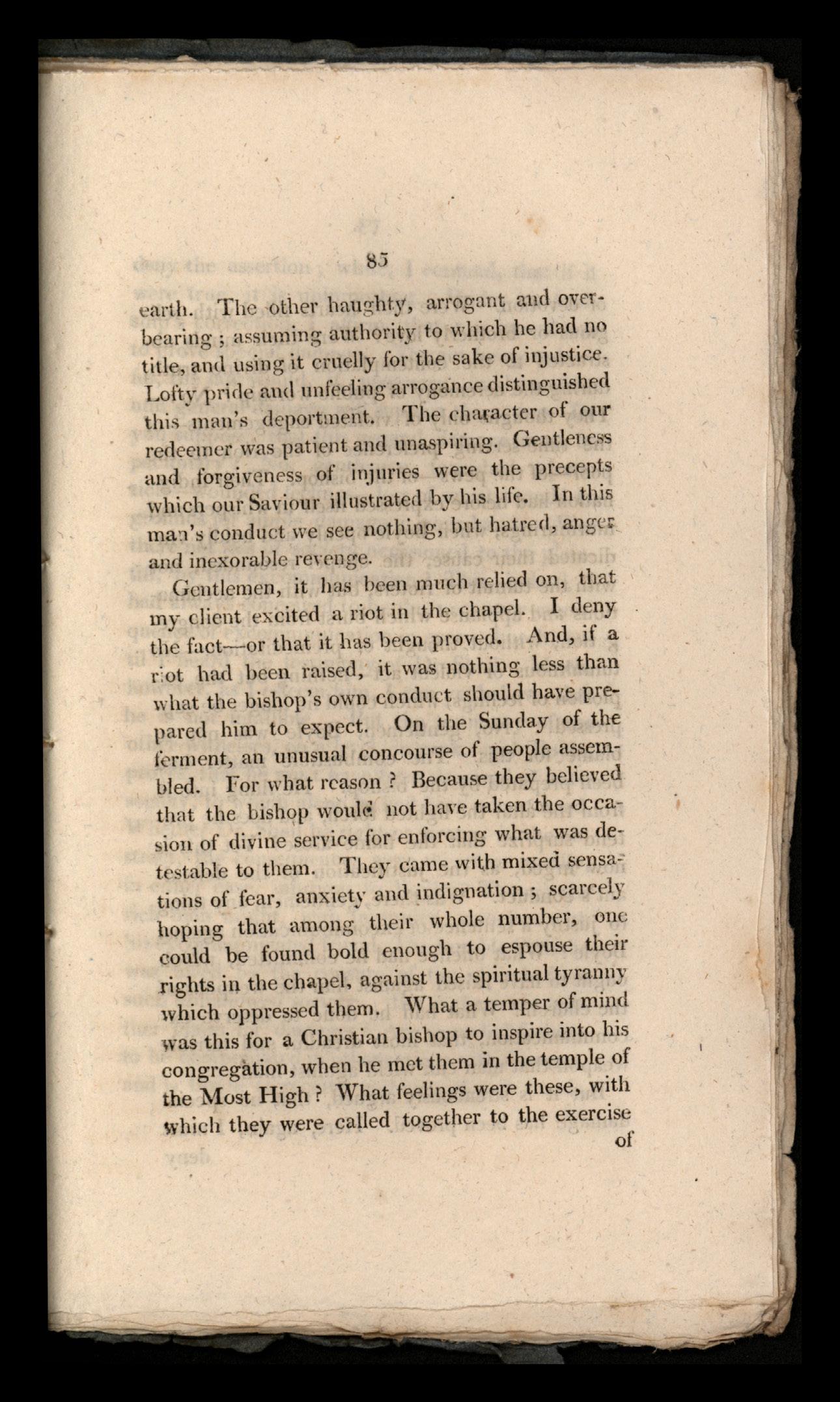
t•arth. The olher haua;ht)t, arrogant arnl owr• bearing ; assumin~ authority to which he had no title, am\ using it crnclly for the sake of injustice. Lofty prirlc :mcl unfeeling arrogance distinguished thi'> man's deportment. The ch:u;actcr of our re<lecmcr was patient and unaspiring. GeutlcnCf-'S and forgiveness of injuries were the precepts which our S,n-iour illustrated by his life. In this ma:1's conduct we see nothing, hnl hatrecl, anget and inexorable rC\ engc. Gcntlcmcn, it has bce11 much rf'lied on, that my licnt e>,.cited a riot in the chap<'l. I <lcny the fact-or that it has been preyed. And, if a r·ot had heen raised, it was nothing less than what the bishop's own condm:t should have prepared him to expect. On the Sunday of the forment, an unusual concourse of people asscm· bled. For what reason ? Because they believed that the Lishop woulc~ not ham taken the occa:.ion of divine service for enforcing what was de· testable to them. They came with mixed sensations of fear, anxiety and indignation ; scarcely hoping that among their whole number, one could be found bol<l. enough to espouse their rights in the chapel, against the spiritual tyranny which oppressed them. What a temper of mind was this for a Christian bishop to inspire into his congregation, when he met them in the temple of the ifost High? ,vhat feelings were these, with which they were called together to the exercise of
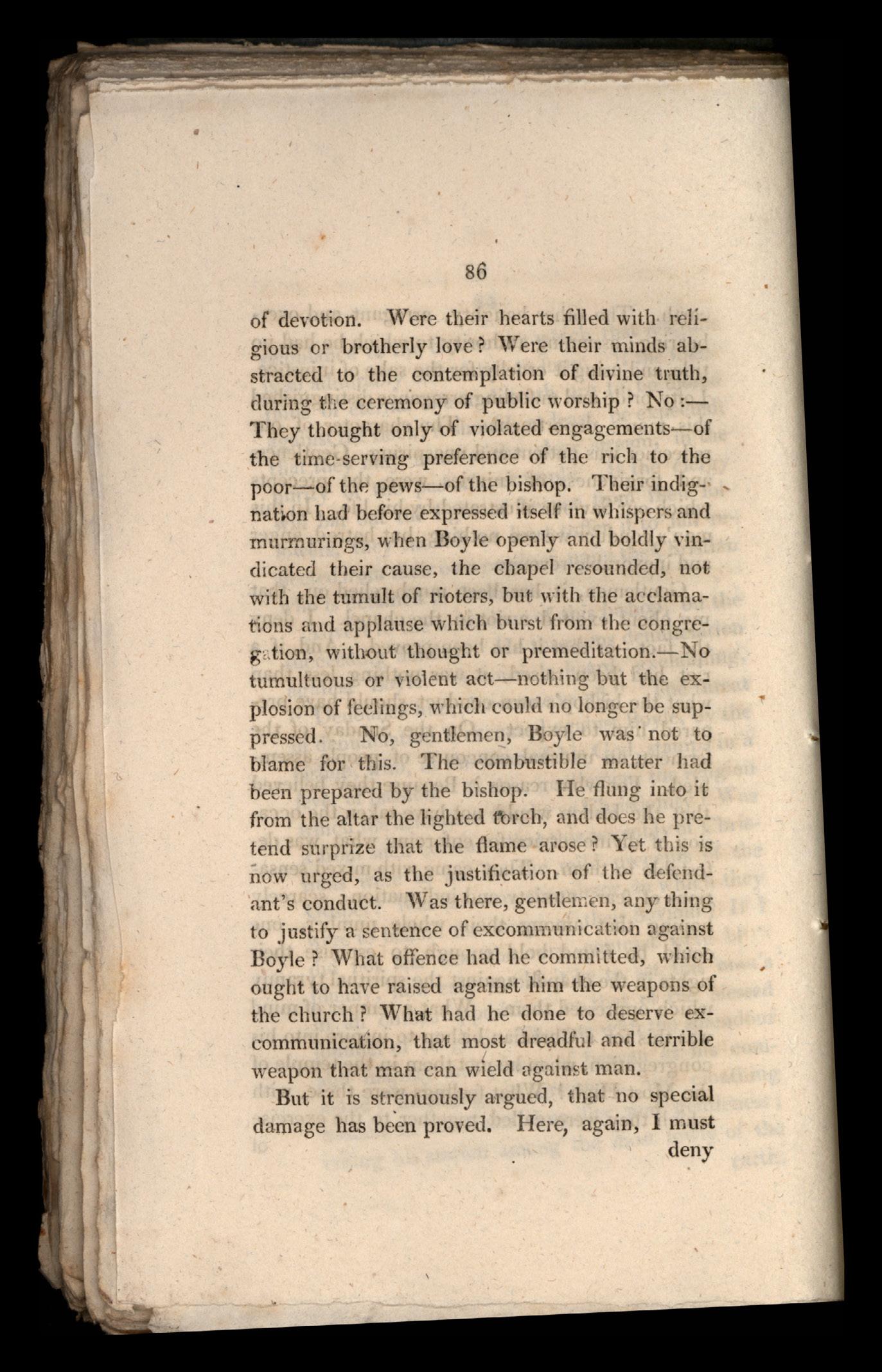
of devotion. ,vere their hearts filled with religious or brotherly love ? Were their minds abstracted to the contemplation of divine truth, during t he ceremony of public wor hip ? To :They thought only of viol at ed engagements-of the tim e-ser\'ing preference of the rich to the poor-of thP. pews-of the bishop. Their indignafion had before expres ·ed itself in whi spers and murmurings, \\ hen Doyle openly and boldly Yindicated their cause, th e chapd rc~onndcd, not with the tumult of rioters, bnt with the acclamations and applauc:e which bur:st f1om the congrcg tion, without thought or premeclitation.-~o tumultuous or , iolent act-nothing but the explosion of feelings, which coulcl no longer be suppressed. No, gentlemen, Bojle was· not to bl ame for this. The combmti ule matter had been prepared by the bishop. lie flung into it from the altar th e li ghted fo1•ch, and does he pretend surprize that the flame aro c? Yet this is now urged, as the justification of the dcfcmlant's conduct. \Vas there, gentknwn, any thing to justify a sentence of c:xcommuniCi.~lion ngainst Boyle?
What offence had h e committed, which ought to have raised against him the weapons of th e church ? \Vhat h ad he cl one to deserve excommunication, that most dreadft,l and t errible weapon that m an can wield agaimt man. But it is stren uously argued, that no special damage has b een proved. Here, again, I must deny
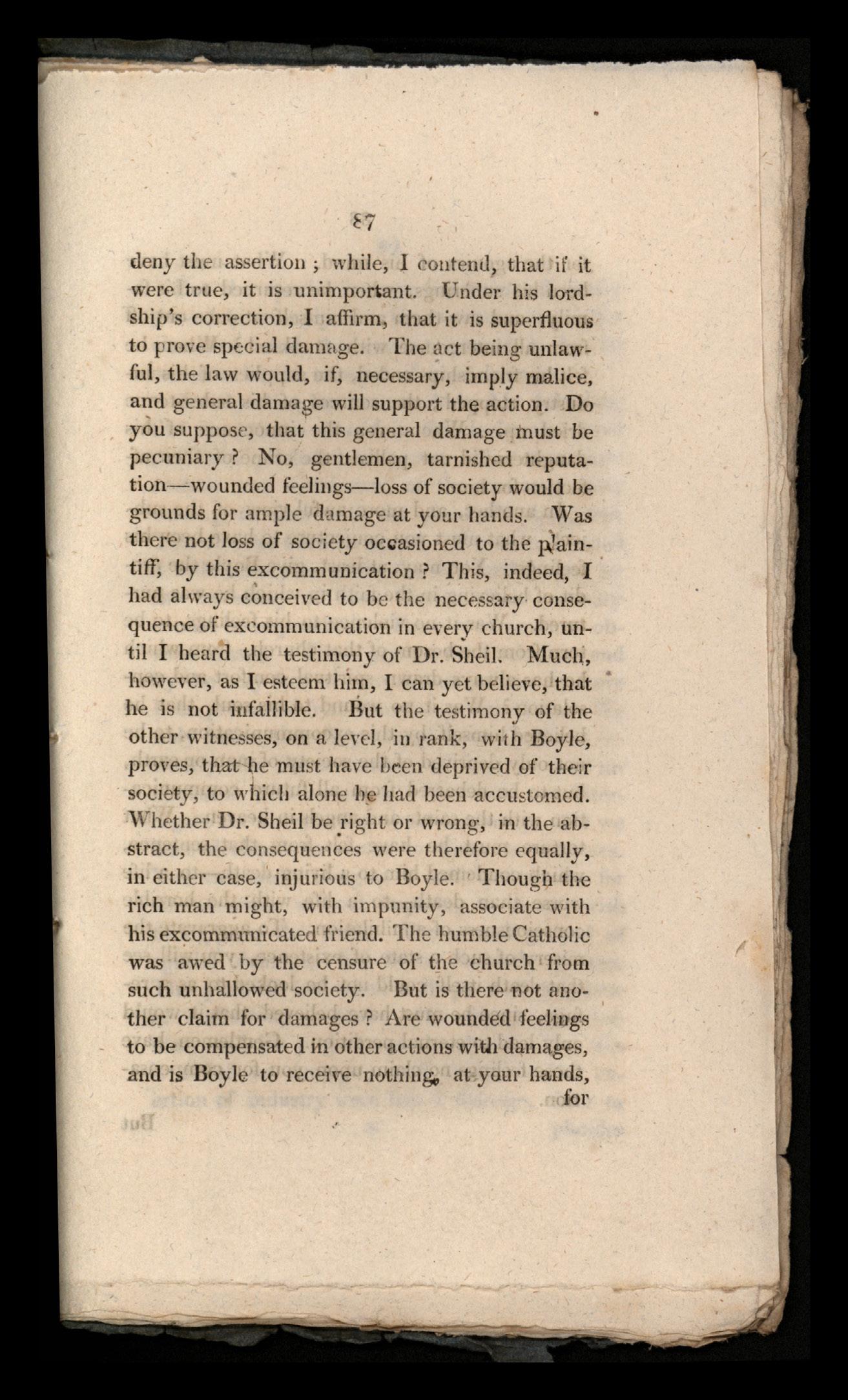
deny the a~ertion ; while, I co11te11J, that if it were true, it is unimportant. Under his lordship's correction, I affirm, that it is superfluous to rrovc spC:cial damage. The net being unlawful, the law would, if, necessary, imply malice, and general damase will support the action. Do you suppost', that this general damage must be pecuniary ? No, gentlemen, tarnished reputation-wounded feelings-loss of society would be grounds for ample d-unagc at your hanc.ls. Was there not Joss of society occasioned to the ~aintitf, by this excommunication ? This, indeed, I had always conceived to be the necessary consequence of excommunication in every church, until I heard the testimony of Dr. Sheil. Much, however, as I esteem him, I can yet believe, that he is not infallible. But the testimony of the other witne:,ses, on a JeycJ, i11 rank, with Boyle, proves, that he must have been deprived of their society, to whicl1 alone he ltacl been accmtomed. " "hc:ther Dr. Sheil be _right or wrong, in the abstract, the consequences were therefore equally, in either case, injurious to Boyle. Though the rich man might, with impunity, associate \\ ith his excommunicate<l friend. The humble Catholic was awed by the censure of the church from such unhallowed society. Ilut is there not another claim for damages ? Arc wounded feelings to be compensated in other actions witJ1 damages, and is Boyle to receirn nothing. at your hands, for

for the agoni<'s of his mind. What mu:-t hm e been his sufferings, when he returned to his fan1ily, and saw them and himself at once cut off from all intercourse with mankiml '= When he felt his friendships ended, the supplies of his industry stopped ; the source of his ub:ii..,tcncc dried up. ,Yhen even the innocence of hi daughters clid not palliate the crime of their affection for him. In another, and more awful view of the subject, what mm,t you conjecture to have been his feelings. You may, at least, giYe Boyle the credit of brlieving in the faith in \\ hich he \\'as nurtured. Was it no violence to his feelings, to b e torn from tbe bosom of that church, from which • he has always drawn spiritual comfort and coµsolation ? ,vas it no wound to his soul, that he believed himself, by this excommunication, to be not only deprived of the society of man on earth, but to be debarred from all future communication with the saints and angels in heaven. ,vhat torture must he have felt from that sentence, which condemed him to a living death-to a life "orse than death-to a life with tbe horribl e consciousnc:;s of annihilation. To aggravate the misery of such a state of existence, you will see that death itself could not be looked to as a refuge, since he must have believed, that it would only lead to eternal perdition. Gentlemen, have those feelings no claim upon you for compensation. But
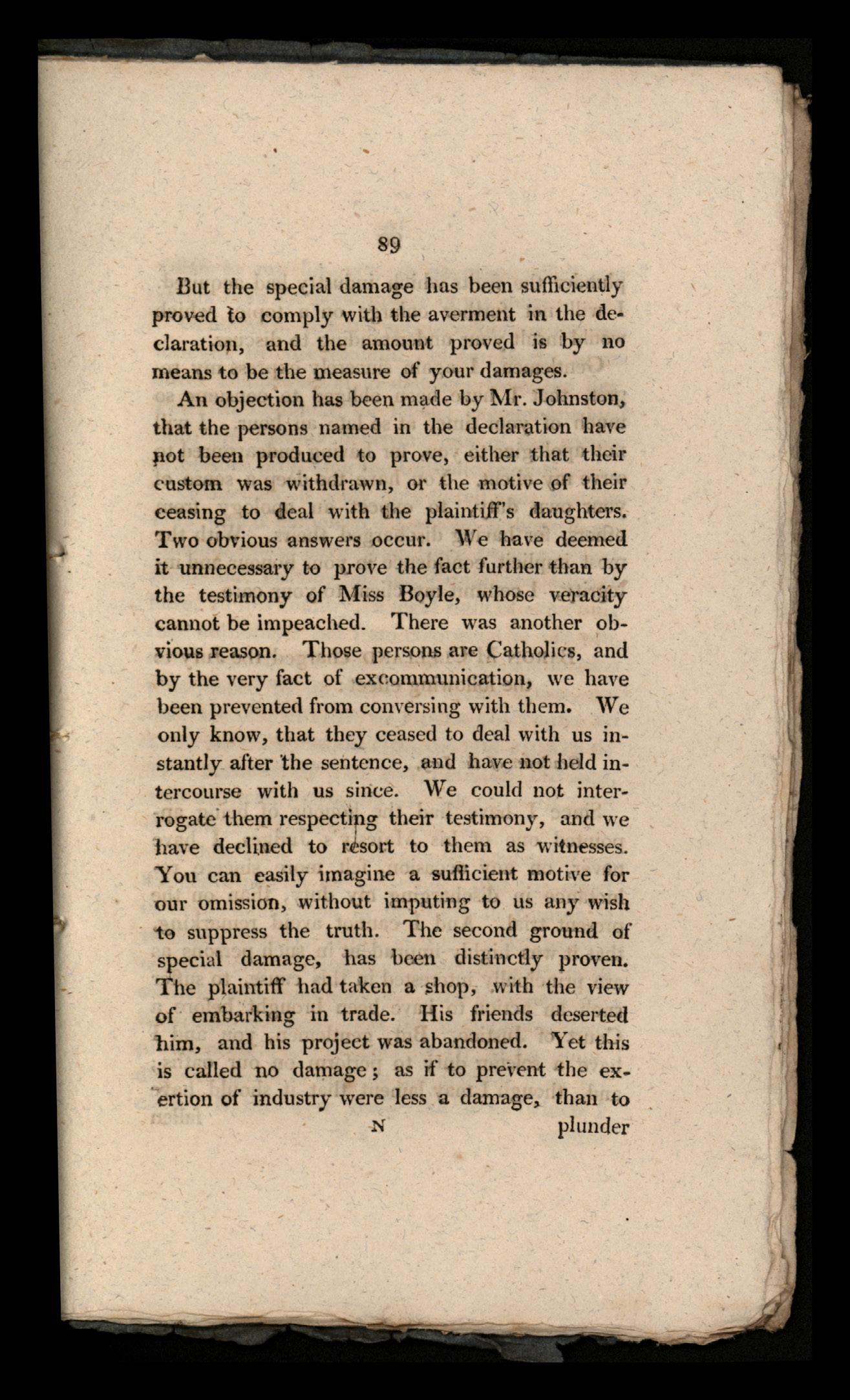
But the special damage hns been sufHciently proved lo comply with the averment in the declaration, and the amount proved is by no means to be the measure of your damages. An objection has been made by iir. Johnston, that the persons named in the decla~tion have pot been produced to prove, either that their cm,1:om was withdrawn, or the motive of their ceasing to deal with the plaintiff's daughters. Two obvious answers occur. \\'e have deemed it unnecessary to prove the fact further than by the testimony of :Miss Boyle, whose veracity cannot be impeached. There was another obvious reason. Those persons are Catholics, and by the very fact of excommunication, we have been prevented from comersing with them. ,ve only know, that they ceased to deal with us instantly after 'the sentence, and have not held intercourse with us since. We could not interrogate them respectipg their testimony, and we have declined to r~sort to them as witnesses. You can easily imagine a sufficient motive for our omission, without imputing to us any wish to suppress the truth. The second ground of special damage, has boen distinctly proven. The plaintiff had taken a shop, with the view of embarking in trade. His friends deserted him, and his project was abandoned. 'Yet this is called no damage ; as if to pre,·ent the ex. •ertion of industry were less a damage, than to N plunder
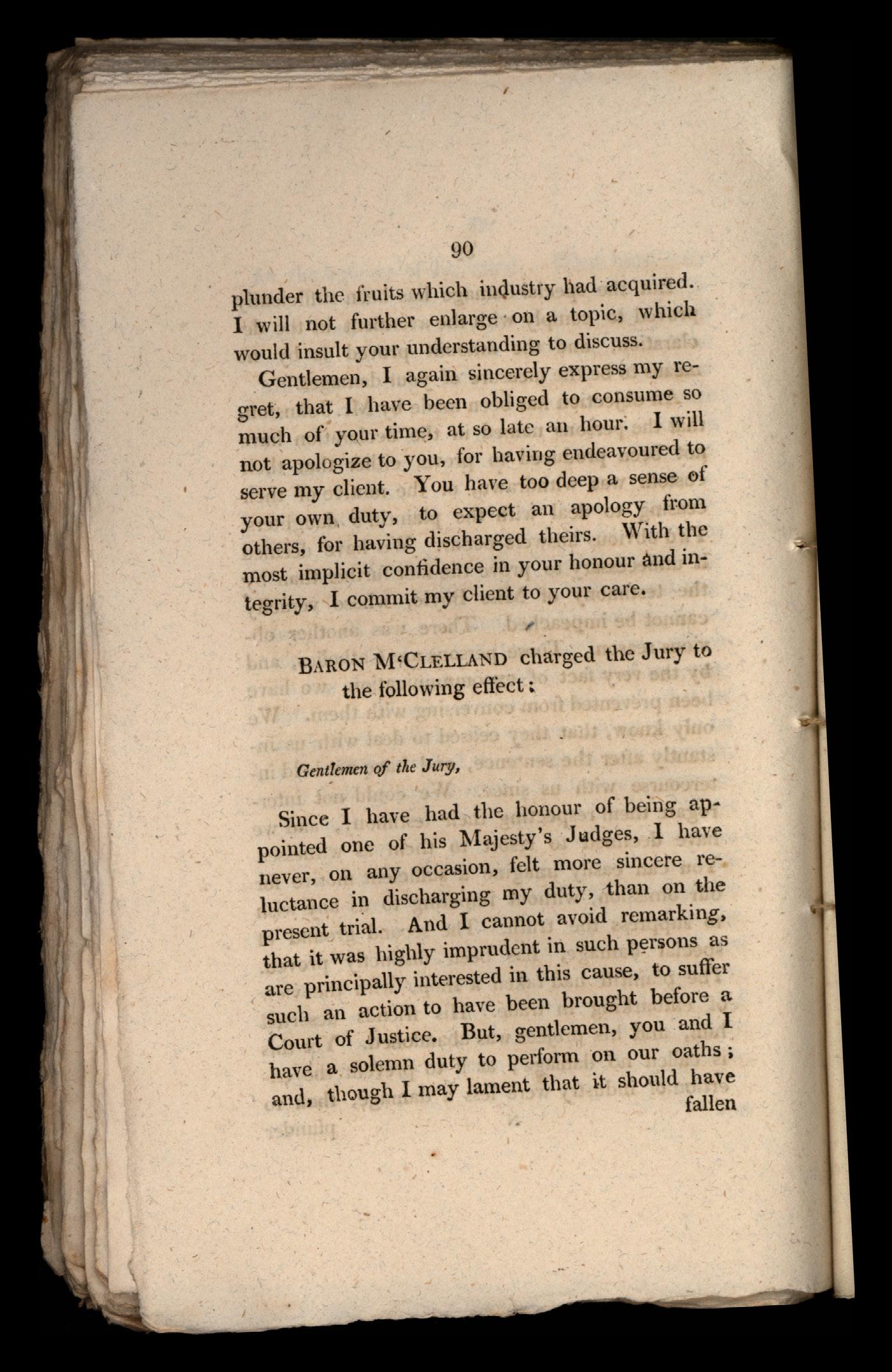
plunder the fruits which iu<;l.ustry had acquired. I will not further enlarge on a topic, whicll would insult your understanding to discuss. Gentlemen, I again sincerely express my regret, that I have been obliged to consume so much of your time, at so late au hour. I will not apologize to you, for having endeavoured to serve my client. You have too deep a sense of your own duty, to expect an apology from others, for having discharged theirs. With the most implicit confidence in your honour and integrity, I commit my client to your care.
BARON M•CLELLAND charged the Jury to the following effect ;
Gentlemen qf the Jury,
Since I have had the honour of b eing ap· pointed one of his 1'1ajesty's Judges, l have never, on any occasion, felt more sincere reluctance in discharging my duty, than on the present tri~l. And I cannot avoid remarking, that it was highly imprudent in such p~rsons as are principally interested in this cause, to suffer such an action to have been brought before a Court of Justice. But, gentlemen, you and I have a solemn duty to perform on our oaths ; an<l, though I may lament that i.t. should have fallen
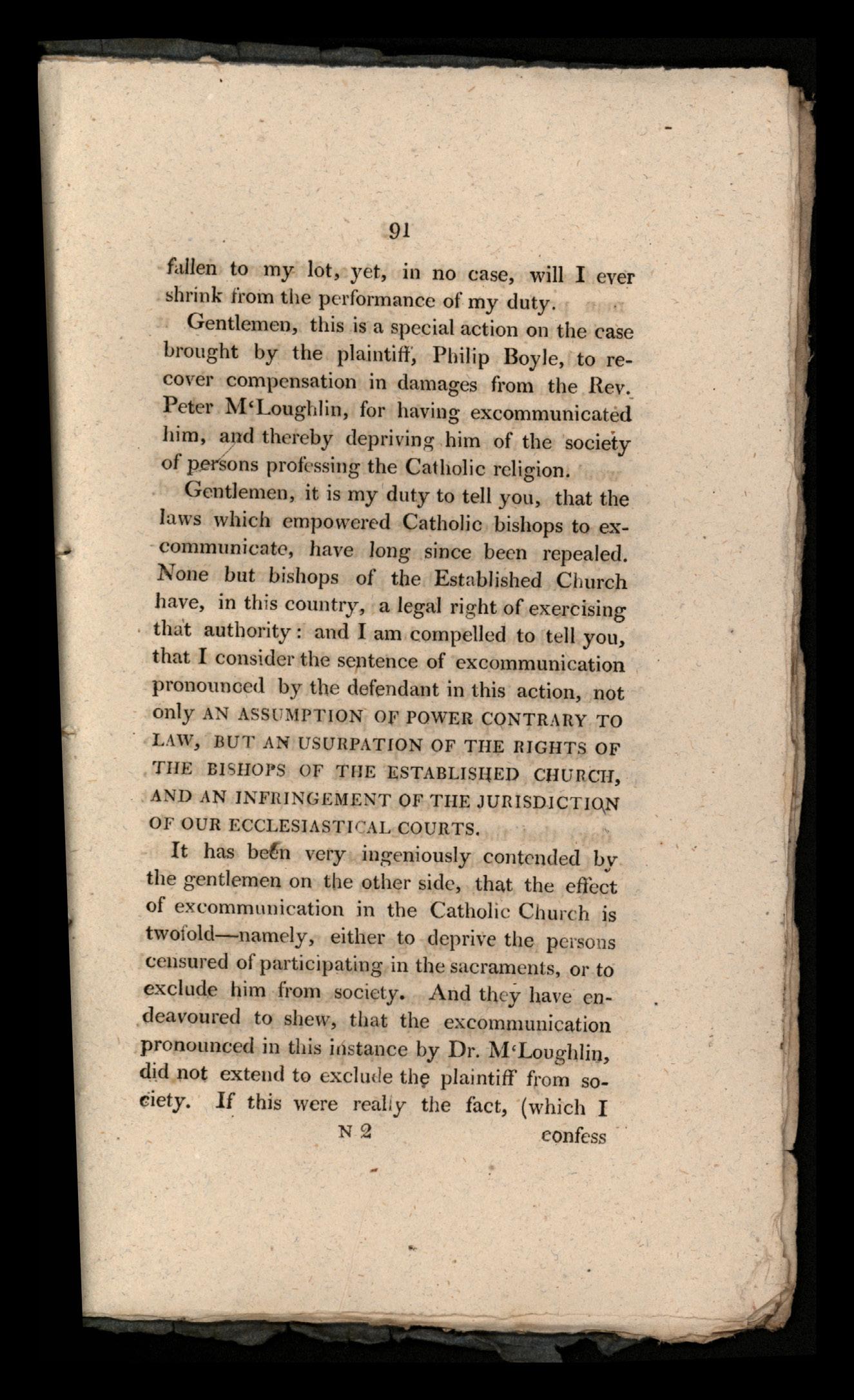
fallen to my lot, yet, in no case, will I ever ~hrink from the performance of my duty.
Gentlemen, this is a special action on the case brought by the plaintiff~ Philip Boyle, to reco, er compensation in damages from the Rev. Peter M'Louglilin, for having excommunicated him, and thereby depriving him of the society of p.er: ons professing the Catholic religion.
Gentlemen, it is my duty to tell you, that the laws which empowered Catholic bishops to excommunicate, have Jong since been repealed. None but bishops of the Established Church have, in th is country, a legal ri g ht of exercising th.it authority: and I am compelled to tell you, that I consider the sentence of excommunication pronounced by th e defendant in this action, not only AN ASSU\IPTION Of POWER CONTRARY TO LAW, DUT A::-i USUHP \TION OF TIIE RIGHTS OF THE BI 5IIOJ>S OF THE ESTABLJSI~ED CHURCII, AND AN JNFnINGEME~T OF TIIE JURISDJCTJQ.N OF OUR ECCLESIASTfr \L COURTS.
It has bcfo , cry ing- cniously contend ed by the gentlemen on the other !>ide, that the effoct of excomm1111ication in the Catholi c Chur(h is twofold-namc-ly, either to deprive the p erson s censured of participating in the sacraments, or to exclude him from socie ty. And th ey have endeavoured to shew, that the excommunication pronounced in this io stance by Dr. M ' Loughlin, did not extend to (;Xclu tl e th~ plaintiff from society. 1£ this were real.y the fact, (which I
confess

confess 1 very much doubt) aud that any clerg1· man professing the Catholic reHgion had given satisfactory evidence of that circumstance, it 1\•ould, in my opinion, materially alter this case. But, gentlemen, evidence of a contrary tendency has been given; and thf& has been proYed by one of the witnesses, namely, that he, the witness , would consider himself guilty of a crime, did. he associate with a person excommunicated. Anothei· of the witnesses has taken upon him to say, tl1at he would not enter into any commercial intel"CQUn!C with a person excommunicated, and he would not like him. Gentlemen, I run b ound te tell you, tl1at if it were a matter of notoriety, tl1at tbc sentence of excommunication d:d not ex.tend tbe ,.,,hole 1ength of depriving the plaintiff of the benefit of society, it was competent to the defendant to have given evidence of that fact. Gentlemen, 1 conceive it absurd to contend, (at the present da.y) that the sentence of excommun'ication by a Catholic bishop, has not the effect of banishing the delinquent from the society of Catholics. Let me ask any gentleman conversant with ecclesiastical hi tory, what " 'as the power and eftect of the sentence of excommunication, in tho~c dark times of bigotry and superstition, when Christian popes nnd prelates cxerci!Jed an ab~lute
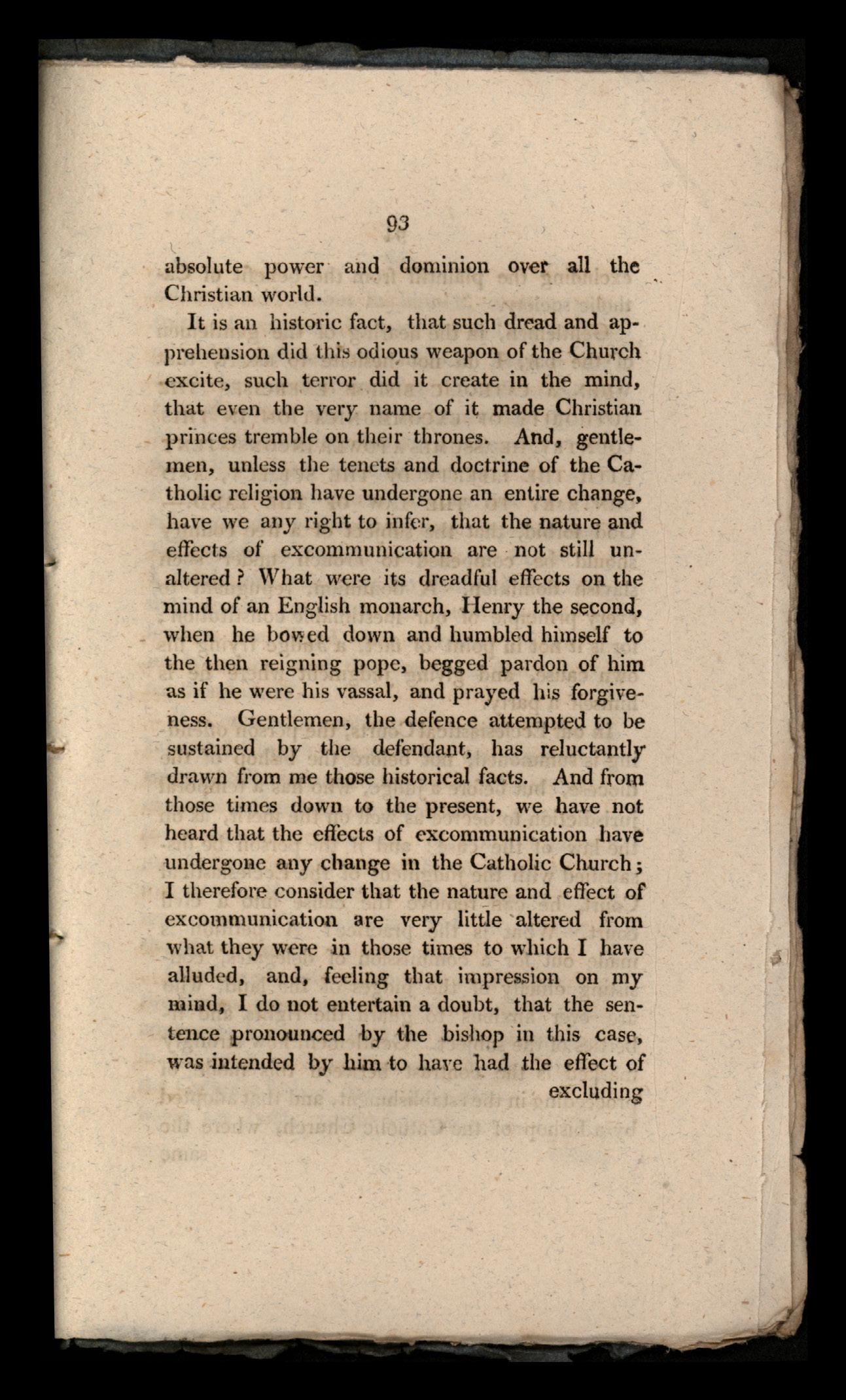
absolute power and dominion over all the Christian worhl.
It is an historic fact, that such dread and apprehension did this o<lious weapon of the Church excite, such terror did it create in the mind, that even the very name of it made Christian princes tremble on their thrones. And, gentlemen, unless the tenets and doctrine of the Catholic religion have undergone an entire change, have we any right to infcr, that the nature and effects of excommunication are not still unaltered ? What were its dreadful effects on the mind of an English monarch, Henry the second, when he bo~ed down and humbled himself to the then reigning pope, begged pardon of him as if he were his vassal, and prayed his forgiveness. Gentlemen, the defence attempted to be sustained by the defendant, has reluctantly drawn from me those historical facts. And from those times down to the present, we have not heard that the effects of excommunication have undergone any change in the C.ltholic Church; I therefore consider that the nature and effect of excommunication are very little altered from what they were in those times to which I ham allud<.'d, and, feeling that impression on my mind, I do not entertain a doubt, that the sentence pronounced by the bishop in this case, was intended by him to hare had the effect of excluding
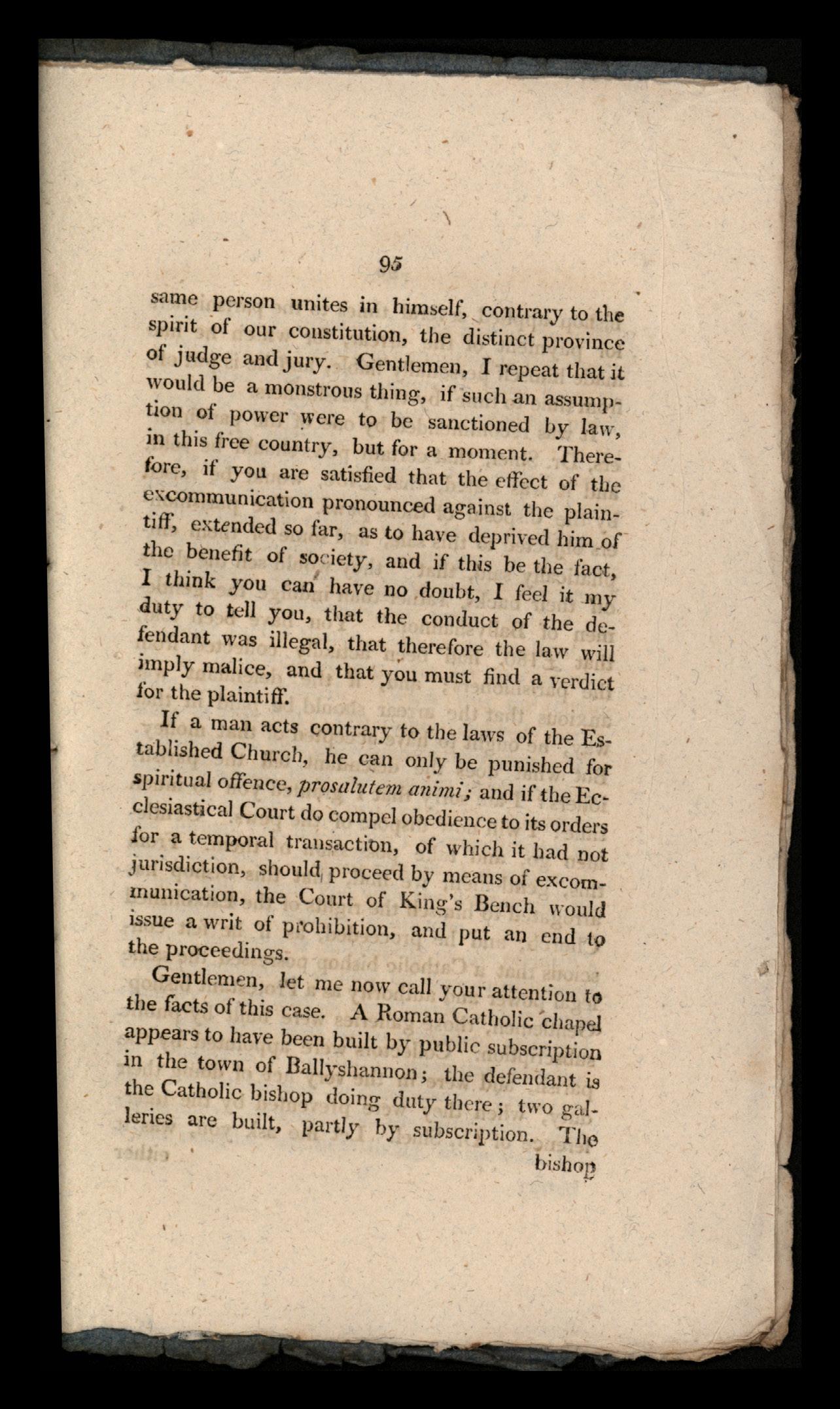
same person unites in him!>elf, contrary to the spirit of our constitution, the distinct pro,·incc of judge and jury. Gentlemen, I repeat that it would be a monstrous thing, if such an assump- tion of power were to be sanctioned uy law, in this free country, but for a moment. There- fore, if you are satisfied that the effect of toe c,communication pronounced against the plain- tiff, extended so far, as to have depri\·ecl him of the benefit of society, and if this be the fact, I think you can have no douut, I feel it my duty to tell you, that the conduct of the de- fendant was illegal, that therefore the law will imply malice, and that you must find a wnlict for the plaintiff.
If a man acts contrary to the Jaws of the Es- tablished Church, he can only be punished for ipiritual offence, prosalutem a11imi; and if the Ec- clesiastical Court do compel obedience to its orders for a temporal transactitm, of ,i hich it had not jurisdiction, should proceed by means of excom- munication, the Court of King's Dench would issue a writ of p1·ohibition, and put an end to the proceedings.
Gentlcmi:-n, Jet me now call your attention to the facts of this case. A Roman Catholic chapel appears to have been built by public subscription in the town of Ilallysham1on; the defendant is the Catholic bisl1op doing duty there; two g,Ll- lerics are built, partly by subscription. Tlto bishoJJ

bishop applied several times to ·the parishioners for p ayment of the arrear, for wllich he had made himself personally liable , and he is put off, from time t<? time, by the parishioners. It was recommended by one of the parishioners, Dr. Shiel, that certain pews should b e sold, and it was stated, that £150. would be rai sed by the disposal of those pews. The parishioners objected to this sale, and some of them emphatically said, that " they would sell the shirts off their backs, rather than indulge the gentlemen of Ballyshannon." You have b een told, tbat £180. had been actua1ly collected from the parishioners; and, if the defendant was anxious that the arrear should be paid in that way, he ought to have accepted of that money. But what does the defendant tell the parishioners ? I am sorry that I granted you so much time : I will 110w dispose of the pews. Gentlemen go, and t ake possrssion of them. From this, gentl"'men, we find, that this bishop has arrogated to him self the rights of the Established Church, and he proceeded, as if he felt conscious that a Catholic bishop possessed the same legal power and authority as a Protestant bishop . Gentlemen, those galleries were built by public subscription. Collectors were appointed by the. parish, and were in the very act of doing theiT duty, when th"Y were prevented by the interference of Dr. Shiel. Let roe ask you, was it either
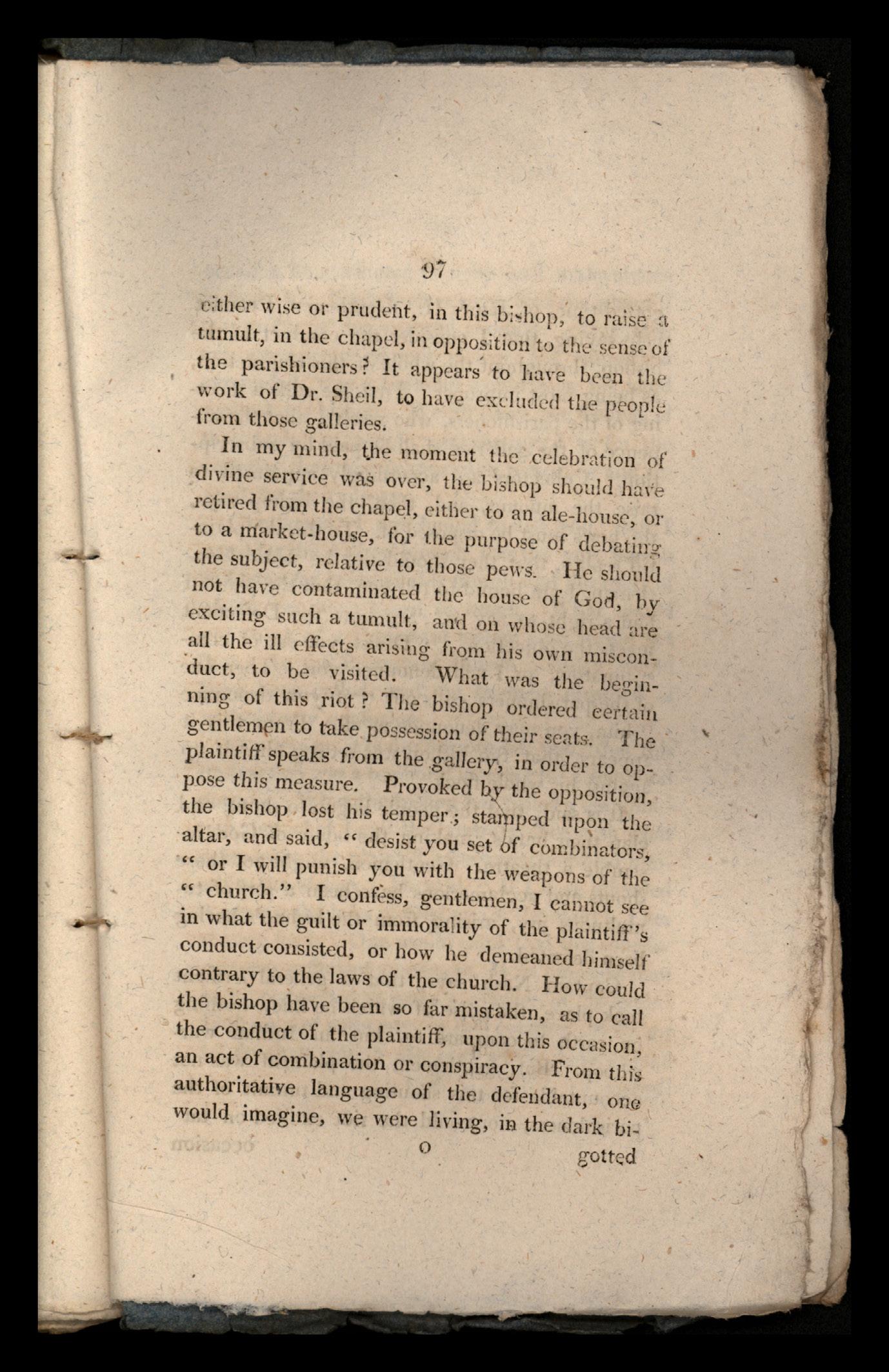
c:ther wise or prudent, in this b;,hop, to raise a tumult, in the chapel, in opposition tu the· sen se of the parishioners? It appears' to l1a,·e bC'cn th e work of Dr. Sh e il, to have exclud ed the peopl e from those gallC'rics.
In my mind, the moment th e cc.:l e brntion of di,·ine se1Tiee was over, t!tt: bi s hop should ha1 'e retired from the chap~}, eith e r to an al e -ho us0, or to a market-house, for the purpose of de batin gthe subject, relative to those pews. He sho11l<l not ha,·c contaminated tlic house of God, hy exciting such a tumult, aml on who se head are all the ill dfects arising from his own misconduct, to be visited. What was the beginning of this riot ? The bishop ordered ecrtain gentlem~n to take possession of their seats. The plaintiff speaks from the gallery, in or<lcr to oppose this measure. Provoked b.r the opposition, the bishop lost his temper; stamped npon the altar, and said, " desist you set of coml>inators, " or I will punish you with the weapons of thC' " church." I confess, gentlemen, I cannot see in what the guilt or immorality of the plaintiff's conduct co11sistcd, or how he demeaned himself contrary to the laws of the church. How could the bishop have been so far mistaken, as to call the conduct of the plaintiff, upon this occasion, an act of combination or couspiracy. From this authoritative language of the defendant, on<;: would imagine, we were living, in the <lark bio gott~d

gottcd times of Jamc-s II. Gentlemen, I cannot hdp say in g , that I consider the conduct of the bishop, throughont the whole of this transaction, a s being mo5t improper. First, he calls a meeting of th e parishioners, who resol\'e, that the expence of the galkric>s shall he paid by subsc rip.,. tion . Collectors :.irc accordingly arpointcd to rai '-c the amonnt, an<l, then, the bishop says , the pC't'.'S must br ,\isposed of. To this the plaintiff rrplics, that they should not be sold . Gcnt\t"rnen, 1 am bound . to tell ) ou, th at the plaintiff had a. right to say so. Sec how the Defc-ndant meLl:. th e objection. '' D c.sist, you s9t of com" l>inators, or I will <lcnounce ) ou . Thrn one of th e pari~hioners calls out " if you denounce 1 " him, you may denounce u s all. From this it appears, th at the bishop was setting himself up ~igainst hi s whole flock.
It is said, that the p eople l>c gan to shout, and clap their hands, makin g the house of God r esemble a theatre . G entkmen, might not th ose shouts and acclamations have been a sort of tumultuous joy, arising from the bishop's having been defeated. Captain Nas\1 says, that a general ferment took place, the noise of which he kuew nothing on earth to compare to, but an 1n<lian \\ ar- • whoop. But, gentlemen, the plaintiff was not accountable for this shouting and tumult of the parishioners, uor ci>uld the riot excited on tat occasion
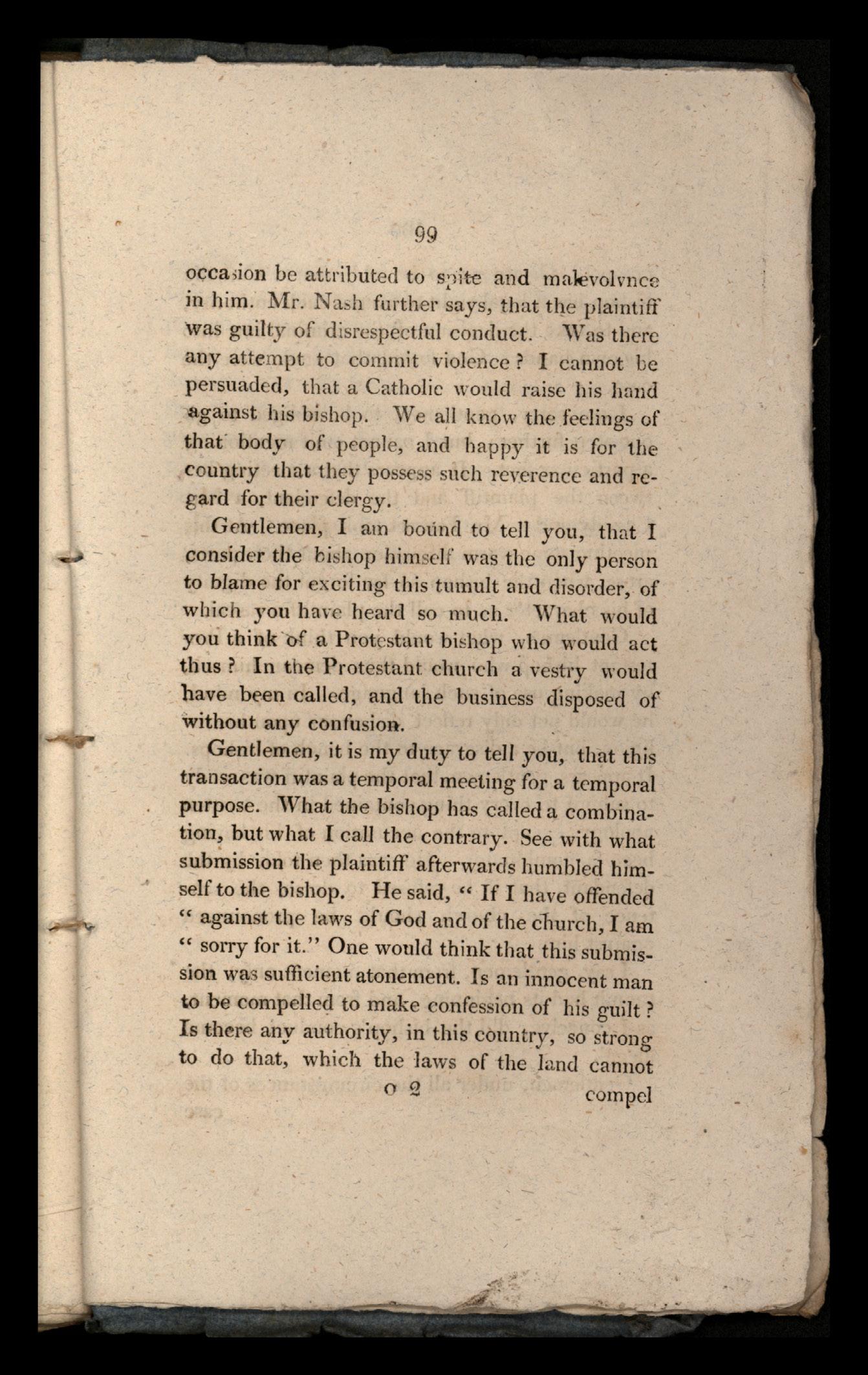
occa ,ion be attributed to s•iit"C and malevolrn cc . in h im . 1fr. Na,,h further says, that the plaintiff \vas guilty of disrespectful conduct. ·was there any atte mpt to commit violence ? I cannot be persuaded, that a Catholic \\ ould raise his haucl against his bi:shop. ,vc all know the feelings of that body of people, and h appy it is for the country that th ey possc:,s su c h reve rence and regard for their clergy.
Gentlemen, I am botind to tell you, th at I consider the bi:d1op him c-I ;" was the only person to blame for exciting this tumult aucl disorder, of which you haH' heard so much. ,vhat ,,ould you think of a Protestant bi shop \\ ho would act thus ? In the Protestant church a vestry would have been called, and the business disposed of without any confusion.
Gentlemen, it is my duty to tell you, that this transaction was a temporal meeting for a temporal purpose. ,vhat the bishop has called a combination, but what I call the contrary. See with what submission the plaintiff afterwards humbled himself to the bi shop. He said, " If I ha ,·e offended " against th e laws of God and of the c1rnrch, I am " sorry for it." One would think that this submission wa, sufficient atonement. Is an innocent man to be compelled to make confes:sion of his guilt ? Is there any authority, in this country, so strong to do that, whi ch the laws of the land cannot () 2 compel

compel : Or arc we lo be lol1l, th.tl a Catholic bishop has a lrgal rigl1t tu assume such authority, and to take thr clecision of the criminal law into hi,; own hands ? God forbid thctt such were the case. I am sorry, gentlemen, to be obliged to go one stc-p further; but 1 cannot omit mentioning a particular fact. It appears that a meeting between the plaintiff 'and the defendant, a Mr. c.~ ~sicly and a Mr. Fausset took place. At this nicc-tipg somr warm discussion about those pews, arose, "hen the bishop so far forgot the dignity of his charactc- r as to call the plaintiff a rascal. Geutlemcn, what would you think of a Protestant bishop who would thus demean himself, by making use of such language. In my m1nd, he would not only reflect dishono1u upon his religion, bnt be a rlisgracc- to the bench of bishops. It appears, gentlemen, that the p}aintiff was ready to suhmit to cYery thing contained in the written apology, except to the accusation of his having bren a combinator. He was then told, uv the clcfendant, that if he refused to do so, the~ sentence of the church should be pronounced ,1{;ainst him.
I saj, gentlemen, from that moment only, the tumult had its beginning, and from that moment, as I conceive, did the bishop's conduct become i\lcgal. G entlemen, under all the circumstances of the case
c ase, if you sh all b e of opini on, that by th e sente nc e of excommunication the plaintiff was deprived of the b e nefit of soc iety, you ought to find a ve rdict for him , and comp ensate him in d am ages , not only for the loss of bu siness, but for th e troubl e and anxi ety of mind, which this po or man and his family have, ever since the pass ing of the sentence of excommunication, suffere d.
The jury r etired, for some time, and returned a verdict for the plaintiff. Damages £125.
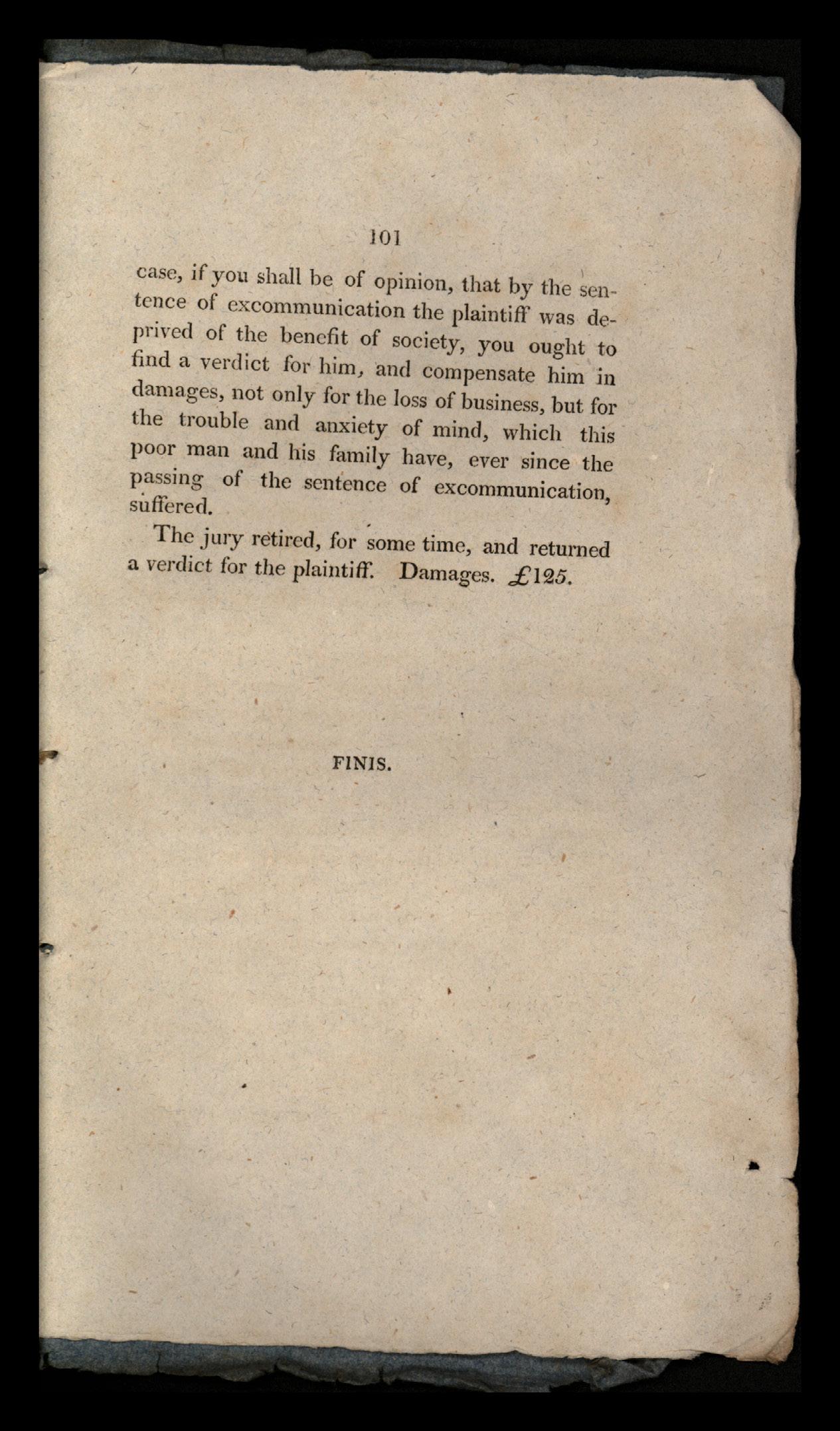
FlNJS.
